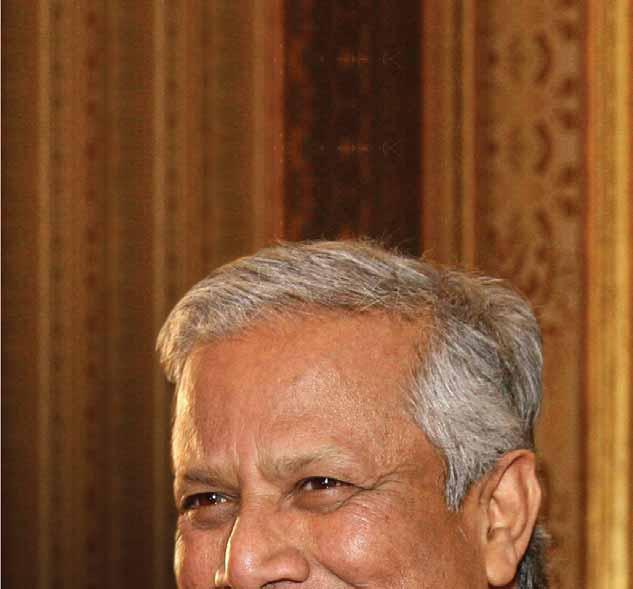
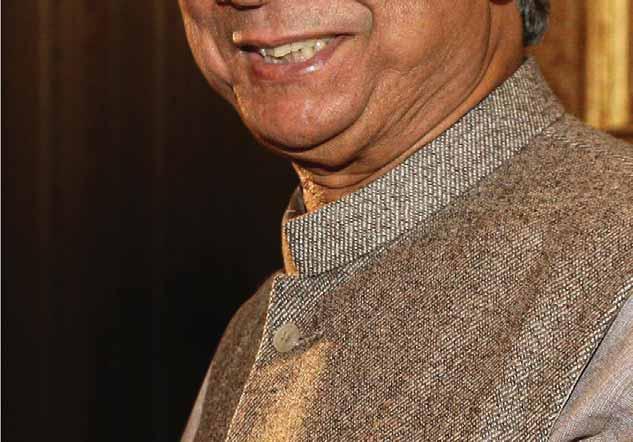







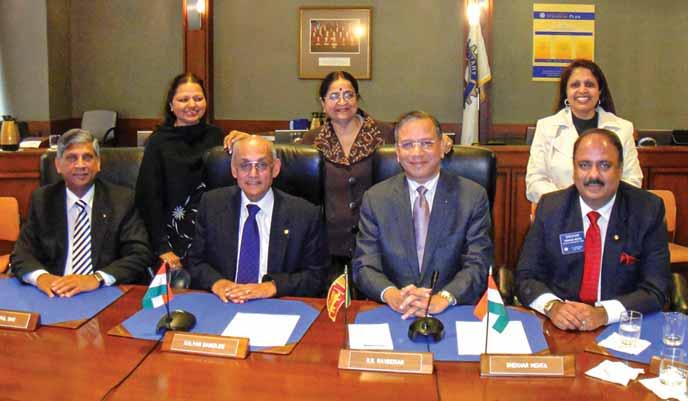
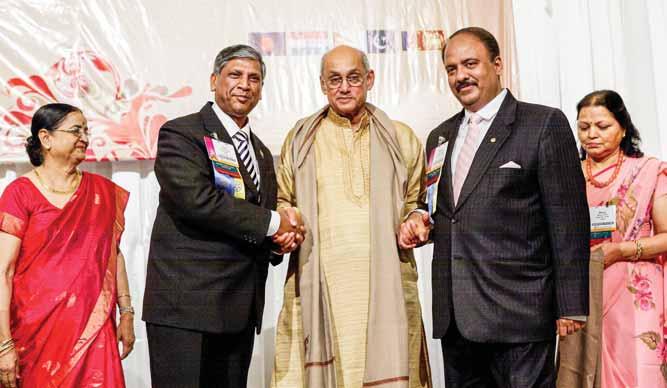
At the South Asia Reception in Bangkok in 2012 when Banerjee was RI President and Das and Mehta were directors. Binota and Manju are also in the picture.
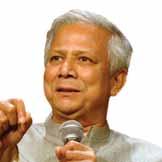
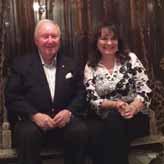
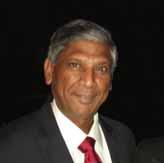
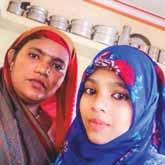
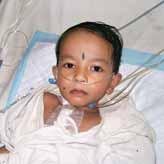

10 We don’t need to go back to a pre-corona world
The pandemic has opened new opportunities to create a better world, says Nobel laureate Muhammad Yunus, in a webinar organised by RC Madras.
16 Luis, the trailblazer
PRIPs Rajendra Saboo and K R Ravindran recall fond memories of their association with PRIP Luis Vicente Giay.
21 Yash made goodness attractive
PRIP Rajendra Saboo, RIPE Shekhar Mehta and PRID
Ashok Mahajan pay rich tributes to PRID Yash Pal Das, a gentle Rotarian who did towering projects.
24 Municipal school students get smartphones from RC Bombay Harbour
With brand new smartphones, 51 students at the Colaba Municipal School will be able to attend online classes.
28 A Shillong Rotarian feeds the hungry Launched in 2018 by the Ardhendu Chartiable Trust, the Aahar kitchen provides nutritious food to 300 people daily.
32 Once a refugee, this Rotarian has enabled free heart surgery for thousands
O P Khanna, a member of RC Bangalore Indiranagar, runs the Needy Heart Foundation (NHF) that does free surgeries.
44 An all-women’s club in Tiruchi combats transgender phobia
RC Tiruchirapalli Shakthi runs a hostel for gender nonconforming children with an aim to give decent education to them.
54 Kishore Kumar, the delightful yodeller
The life and times of playback singer Kishore Kumar and what made him a legend.

Excellent tribute to Lata Mangeshkar
Iwas very happy to see S R Madhu’s tribute to Lata Mangeshkar. I have known him to possess encyclopaedic knowledge of Hindi film music. I am not surprised that it is reflected in the latest piece. So full of intricate aspects of her singing and a style of writing that matches it. Wish he would write more often.
Best wishes.
D Sampathkumar, former Editor
The Hindu Business Line

The article on Lata Mangeshkar is excellent. Many unknown facts about Lata and her sacrifice for her family were described beautifully.
K N Alva, RC Mangalore North — D 3181
Rotary News is getting more interesting
Recentissues stimulate the thirst of readers and the messages from the RI president and RI directors are really inspiring. The story on shrimp makers will encourage women’s empowerment. It is heartening to know that the DRDO invented Jithika to ease the burden of the shrimp-makers.
A K Sugunan, Rotary Bangalore Indiranagar — D 3190
Iama regular reader of Rotary News since 2003. The content has become more attractive and interesting. The articles are inspirational. Thank you very much for inclusion of lifestyle columns from various disciplines. Truly, Rotary News unites the world.
Janardhana Naik
RC Kasaragod — D 3202
RIPresident Holger Knaack speaks very well about his future plans; the Editor’s note on racism and colourism impressed me. RID Bharat
Pandya’s views on what a Rotary club should be are meaningful. Happy that RC Kakinada helped women shrimp-makers through a new device which eliminates their hardships.
I enjoyed Lockdowns have their rewards by TCA Srinivasa Raghavan, and the Taipei 101 tower. Surviving the pandemic and Will the world get well again? are useful for readers. Cow trekking and cheese making in Switzerland is impressive. All the articles are worth reading and pictures are excellent. Congrats to the editorial team.
Philip Mulappone M T RC Trivandrum Suburban — D 3211
Thanksfor excellent articles including the edit on racism. But in the Tamil version, in some places sangam is used and in others ‘club’ is used. Please drop ‘club’ and only use sangam. Thanks for the excellent editorial on the prevailing race differences and your comments.
Jambunathan
RC Avanashi — D 3202
Congratulations to DG M Jose Chacko, from RID 3120 for the donation of bicycles to 1,500 students, a big incentive to attend school.
N Jagatheesan, RC Eluru — D 3020
Poignant obits on MAT Caparas
It was a pleasure to read PRIP Rajendra Saboo’s obit on Mat Caparas, a legendary figure in Rotary, which had a personal touch and narration of anecdotes. PRIP Kalyan Banerjee has also dealt with many aspects of Mat in his very absorbing article. I compliment the editor and her team for the excellent work done in Rotary News. It is no surprise that it has become better than the official magazine The Rotarian. To get that compliment from PRIP Caparas is no small achievement.
Narayana Shagrithaya
RC Mumbai Bhandup — D 3141
Theobit by PRIP Banerjee on Mat Caparas was really poignant. The piece felt like a live description of a person in front of you, and has added a refreshing touch to the issue.
Dr Jayasekharan V P
RC Payyanur — D 3202
The passing away of PRIP Frank Devlyn has shocked Rotarians across the world. PRIP Kalyan Banerjee’s tribute calls him a visionary, a larger than life person. Tributes from PRIPs Ray Klinginsmith, K R Ravindran and Mark Maloney are emotional and inspirational as they recalled how he was instrumental in getting the 18-storeyed headquarters building in Evanston. My compliments to you for the brilliant posthumous tributes Rotary News has offered to Devlyn.
Arun Kumar Dash
RC Baripada — D 3262
RI President Holger Knaack has rightly said that supporting new clubs is key for growth. The editor has penned a nice analysis on racism and our craze for fair complexion. Both the RI directors have focused on new opportunities for Rotarians to make the world better. PRIP Mat Caparas’ letter to PRIP Saboo is touching. A Covid warrior from Panchkula on Dr Rita Kalra is interesting. Congratulations to the members of RC Jodhpur Padmini. Trustee chair K R Ravindran has given pointed queries on whether this will be “Rotary’s great moment to become an even stronger organisation”. Usha Kumar has explored the wonders of a bygone era in Egypt by vividly describing the pyramids, mummies and Nile river across this exciting land.
S Muniandi RC Dindigul Fort — RID 3000
TheAugust issue is unique as it covered the activities of Rotarians and Rotary clubs during the pandemic. The Jithika project by RC Kakinada is exemplary. I served as a Rotary volunteer in Bangladesh in 2000 and 2002 and am happy to recall the good work of Kazi Amdadul Hoque from RC Sonargaon. His efforts led to Rotary clubs joining hands to supply food and hygiene kits to the needy. Also, the issue highlighted the presentation of 10,000 desk-benches to schools; donation of laparoscopic machine to PHC and the editor’s tour to Switzerland during 2013, and her adventure, which is fascinating.
PDG Dr Varahalu Basava — D 3020
Rotary Plus — a welcome initiative
Thanks for sending us the link to the online magazine Rotary Plus.
Rotary News is the image of Rotary in India and Rotary clubs feel it an honour to get their projects featured there. The constraint for the editor is the space, so the online edition for broader coverage of club activities is a welcome initiative.
R Srinivasan
RC Madurai Midtown — D 3000
Theinduction of 361 new members by RID 3211 in a single day through a zoom meet is really amazing, and sets an example to other districts. During this pandemic, Rotarians have excelled in selfless service; DG Thomas Vavanikunnel, PDG Regunath and their team deserve appreciation. The role played by PDG Dr Chandrashekhar Kolvekar to protect the Covid affected is noteworthy. His help to a pregnant lady in Chennai deserves praise.
S Mohan
RC Madurai West — D 3000
TCASrinivasa Raghavan’s LBW column is interesting, humorous and definitely worth re-reading. I circulate it among my friends and relatives who enjoy his writing. A collection of his articles can be brought out as a book.
Vasant Dhupkar
RC Pune Sahawas — D 3131
We welcome your feedback. Write to the Editor: rotarynews@rosaonline.org; rushbhagat@gmail.com. Mail your project details, along with hi-res photos, to rotarynewsmagazine@gmail.com
Click on Rotary News Plus in our website www.rotarynewsonline.org to read about more Rotary projects.
Save money to fund Rotary
As the Covid-19 pandemic spreads hardship around the world, Rotarians are innovating, caring for the affected, and showing there are ways to help. As people of action, they are engaged in their communities, offering help to those in need. Rotary News should publish articles on this work. I would suggest the money saved through virtual meets and webinars should be utilised to fund Rotary so that maximum PPE kits, sanitisers, masks, gloves etc may be donated.
Govinddas Agrawal
RC Belur — D 3291
toilet warrior Mark Bhalla’s efforts to build 15 toilets in Nashik is commendable and we need more such committed Rotarians like him as it will boost the education of girl children.
RC Calcutta’s history as recounted in the May issue 100 glorious years: RC Calcutta is interesting as it turns the spotlight on its milestone projects and events including Mahatma Gandhi’s speech, and a Rotarian’s wife donating $1 million to Mother Teresa.
Pon Muthaiyan
RC Aduthurai — D 3000
It’s great to know that India has retained its number 2 spot in the world in TRF giving, being only behind the US. I hope in near future, we will occupy the top spot. I must congratulate Team Rotary News for bringing out another outstanding issue. Most heartening was to see that six pages were devoted to club projects across India, which will motivate clubs to showcase their projects.
Capt V G Deodhar
RC Nasik — D 3030

uring a recent zoom meeting with Rotarians and Rotaractors, I looked at the smiling faces on my screen and realised how much our organisation has changed in a short period. It is clear that there is no going back to the ‘old normal’ in Rotary — and I see that as an exciting opportunity!
Innovation and change are happening at so many levels as we rethink and remake Rotary. Rotary’s new flexibility is blending with digital culture to drive change in ways that many of us have never seen before. We can learn a lot from Rotarians like Rebecca Fry — who, at age 31, already has 15 years of Rotary experience.
I see Rotary as a phenomenal platform to change the world. I believe I can have the greatest influence by empowering others to create the change they wish to see in the world. I’ve gained leadership insights through my experiences in RYLA and Rotaract, and now as charter president of the Rotary Social Impact Network, a new e-club.
Engaging Rotary programme alumni is key in forming new clubs. Our club is proof that Rotaractors and other alumni want to join Rotary — but sometimes they can’t find the Rotary club that’s right for them. Our club has 31 members, all between the ages of 23 and 41, and almost all of them are alumni of Rotary programmes.
We need to be able to integrate and align Rotary with the other personal and professional goals we’re pursuing. In chartering this club, we set out to design a personalised model of Rotary that is focused on added value for our members. We have also sought to leverage connections — through Rotary Fellowships, Rotary Action Groups,
and other international partnerships — in order to elevate our members’ experiences beyond the club.
Our club meets and manages most of its projects online, using Microsoft Teams to engage 24/7 in topics that interest our members. This also means our club is not geographically bound to any one location: Although many of us are in Australia, we also have members in Germany, Italy, Mexico, Tanzania and the United States.
Also key for our club is measuring the impact of our projects. For Plastic Free July this year, we created an awareness campaign promoting ways that individuals could reduce their use of plastics, and we reached more than 6,000 people. It’s a project with a tangible impact that anyone can take part in wherever they are. I’m proud that, through our club, we are bringing people together for a new type of Rotary experience. I am excited for our future.
All Rotary clubs have the opportunity to be innovative clubs, just like Bec’s club. Let’s trust those clubs, learn from them, and lend them our support. Change in Rotary happens at the grassroots level, as clubs lead the charge, defining what this new Rotary can be.
Change is constant, and we have more work to do in many areas. It is important that we celebrate the contributions of people of all backgrounds and promote people from underrepresented groups so that they have greater opportunities to participate as members and leaders in Rotary.
The tools to make Rotary more inclusive, more relevant, and more fun for everyone are at our fingertips. Let’s use them now, and we will see how Rotary Opens Opportunities for ourselves and for those yet to discover us.
Holger Knaack President, Rotary International


Itwas with utter shock and a deep sense of sadness that we at the Rotary News Trust absorbed the news of the untimely demise of past director Yashpal Das. There wasn’t a single RNT meet that he attended at our Chennai office without first going up to the staff members and enquiring about their welfare, before heading for the conference room. Over the six years I knew him, it was with the utmost courtesy and respect that he always treated me as editor of the magazine. His gentle demeanour and quiet charm won him many friends. A relentless worker for Rotary, who can forget his contribution to the Ambala Hospital, the meticulous execution of those beautiful schools in the flood-devastated Garhwal region, or his passionate work for tuberculosis eradication. This perfect gentleman will be missed sorely as his loss is irreplaceable, and we join his family, friends and thousands of Rotarians in India and overseas to mourn his passing on.
It is always the human mind’s capacity for a contrarian viewpoint to commonly accepted views that makes a person stand out, and achieve great heights. The cover story of this issue highlights one such person, whose capacity to think differently… to advocate that the poor people of this world are basically honest, and hence bankable, that led to the ushering in and huge success of microcredit in this world. It also resulted in the man, Bangladesh’s Muhammad Yunus, bagging the Nobel Prize for Peace in 2006. Because poverty causes strife and conflict and absence of poverty makes it possible for people to live in peace, said the citation.
The very same Yunus has once again forced us to sit up and take note of his contrarian views on the corona pandemic. Addressing a virtual meeting of the Rotary Club
of Madras, he wondered at the anxiety of millions to revert to the pre-corona pandemic era at the earliest. But, he says, the world prior to the pandemic was a terrible one on so many fronts — global warming due to the destruction of the environment; inequitable distribution of wealth in too few hands leading to mass poverty and hunger, and rising unemployment.
He believes the pandemic has given us a fantastic opportunity to set right the mess we have made; the details are in the cover story but one point that struck me the most needs to be highlighted. Referring to the pathetic plight of the millions of migrant workers who were left to fend for themselves after the sudden lockdown India announced, he argued that they were “on their own” because they belong to the “informal sector” towards which nobody has any responsibility. But we should formalise this informal sector, call them micro entrepreneurs, because after all they bring their skills or goods to sell in our towns and cities. And set up a Ministry of Microenterprise, akin to the Ministry of Labour which every country has for those employed in the formal sector. Then governments will be forced to formulate plans and policies for them. An exciting idea and, as Yunus says, an opportunity provided by this horrific pandemic to governments to take “outrageously bold decisions”.
But this will take time, and meanwhile with every passing day India continues to be hit harder by this virus, with the poor and the underprivileged being the worst hit, losing whatever ill-paying jobs they had and struggling to survive. It is heartening to watch the comfort and relief thousands of Rotarians across the world are bringing to these people, risking their own lives in the process.
Rasheeda Bhagat
RI Dist 2981
RI Dist 2982
RI Dist 3000
RI Dist 3011
RI Dist 3012
RI Dist 3020
RI Dist 3030
RI Dist 3040
RI Dist 3053
RI Dist 3054
RI Dist 3060
RI Dist 3070
RI Dist 3080
RI Dist 3090
RI Dist 3100
RI Dist 3110
RI Dist 3120
RI Dist 3131
RI Dist 3132
RI Dist 3141
RI Dist 3142
RI Dist 3150
RI Dist 3160
RI Dist 3170
RI Dist 3181
RI Dist 3182
RI Dist 3190
RI Dist 3201
RI Dist 3202
RI Dist 3211
RI Dist 3212
RI Dist 3231
RI Dist 3232
RI Dist 3240
RI Dist 3250
RI Dist 3261
RI Dist 3262
RI Dist 3291
DG R Balaji Babu
DG K S Venkatesan
DG A L Chokkalingam
DG Sanjiv Rai Mehra
DG Alok Gupta
DG Muttavarapu Satish Babu
DG Shabbir Shakir
DG Gajendra Singh Narang
DG Harish Kumar Gaur
DG Rajesh Agarwal
DG Prashant Harivallabh Jani
DG CA Davinder Singh
DG Ramesh Bajaj
DG Vijay Arora
DG Manish Sharda
DG Dinesh Chandra Shukla
DG Karunesh Kumar Srivastava
DG Rashmi Vinay Kulkarni
DG Harish Motwani
DG Sunnil Mehra
DG Dr Sandeep Kadam
DG Nalla Venkata Hanmanth Reddy
DG B Chinnapa Reddy
DG Sangram Vishnu Patil
DG M Ranganath Bhat
DG B Rajarama Bhat
DG B L Nagendra Prasad
DG Jose Chacko Madhavassery
DG Dr Hari Krishnan Nambiar
DG Dr Thomas Vavanikunnel
DG P N B Murugadoss
DG K Pandian
DG S Muthupalaniappan
DG Subhasish Chatterjee
DG Rajan Gandotra
DG Fakir Charan Mohanty
DG Saumya Rajan Mishra
DG Sudip Mukherjee
Printed by P T Prabhakar at Rasi Graphics Pvt Ltd, 40, Peters Road, Royapettah, Chennai - 600 014, India, and published by P T Prabhakar on behalf of Rotary News Trust from Dugar Towers, 3rd Flr, 34, Marshalls Road, Egmore, Chennai 600 008. Editor: Rasheeda Bhagat.
The views expressed by contributors are not necessarily those of the Editor or Trustees of Rotary News Trust (RNT) or Rotary International (RI). No liability can be accepted for any loss arising from editorial or advertisement content. Contributions – original content – are welcome but the Editor reserves the right to edit for clarity or length. Content can be reproduced with permissionand attributed to RNT
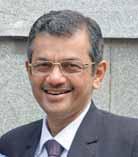
InOne-to-One
2015, 193 world leaders agreed to 17 ambitious goals — the Sustainable Development Goals of the UN — to end poverty, fight inequality and stop climate change by 2030. The pandemic has set back community economic development in most parts of the world by years, if not decades. Covid-19 has only reinforced the fact that for the goals to be met, everyone — the governments, private sector, civil society and general public — need to do their part: This crisis has thrust millions into poverty. Food insecurity has increased. Children are more vulnerable because in many parts routine immunisation has declined or stopped and they have less or no access to healthcare to fight diseases like diarrhoea, pneumonia etc. Rotary has a role to play in many of these areas.
Things will not get better till we have the pandemic under control. Vaccine is one of the ways to do it. But vaccines have to be equitably distributed without consideration of rich / poor; developed / developing. This is the challenge. And it is here that Rotary can play a part with advocacy efforts with governments, Gates Foundation and pharma companies to ensure equitable distribution of vaccine. This will be a very good way to focus on community economic development in the coming months.
October 24 is World Polio Day. Polio — the word strikes fear in the hearts of parents because it affects our most vulnerable and defenceless population, children under five. The polio story is the story of a dream. A dream that Rotary showed to the world when in 1982 the RI board pledged to immunise the world’s children. And it is the story of the four Cs — commitment of Rotary and Rotarians to eradicate polio; collaboration which is our success in forging partnerships. No single entity could have done it, but together we are so close. The third is consistency — consistent, dedicated efforts of Rotarians, their families and friends; followed by contribution — generous, large-hearted contribution of Rotarians and friends of Rotary, that has made this miracle possible.
As Africa is declared polio-free we need to move ahead and bring this story to its conclusion. A polio-free world will be the best legacy we can leave for future generation.
Emerson once eloquently said, “Without the rich heart, wealth is ugly.” Richness is not about money or possessions; it’s a state of the mind. It’s not how much we have that counts but what we do with what we have that matters. As Rotary opens new opportunities of service, let us use the richness of our hearts to support the polio fund.

Dr Bharat Pandya RI Director, 2019–21
Nearly 800 million people live on less than $1.90 a day. Rotarians must work to provide sustainable solutions to end poverty.
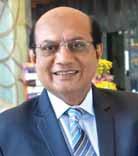
Skills and knowledge are the driving forces of a country’s economic growth and social development. Many industries are fighting a battle of survival in the times of Covid-19. Hiring freeze, salary cuts and layoff have become the mantra of many businesses to remain afloat. The need of the hour is to reinvent the Indian workforce and systematically deal with structural issues in the economy so that we emerge as a more resilient society.
Globally nearly 74 million young adults are unemployed. Youth are our only sustainable asset. We must create skills, leadership and job opportunities for them. Clubs must participate in skilling youth and help them to get jobs during these uncertain times. Rotary India Literacy Mission realised this and, together with Apollo MedSkills, has launched the Saksham Bharat skilling programme on a pilot basis to skill people as para medical workers with assured placement. The beneficiaries are decided by the sponsoring Rotarians and are trained in select centres of Apollo MedSkills.
Adopt a village
I request each club to adopt a village and help improve basic education, water, sanitation, health and other facilities there to make it self-sufficient and enhance the wellbeing of its people.
There is no greater joy than finishing the race. We have pledged to eradicate the world of polio and requesting each Rotarian to rededicate himself/herself to see this battle through. October 24 is World Polio Day. Get involved and spread the message through fundraisers, events, rallies, awareness programmes, so that we can make polio a thing of the past.
With the untimely demise of PRID Yash Pal Das we have lost a Rotary warrior, a loving and a doting family man and, for many of us, a dear friend. Let us all pray that he brightens the space he occupies in his after-life. It is now certain that even god requires good people. May god give his family the strength to overcome this huge loss.

Kamal Sanghvi RI Director, 2019–21
Board of Permanent Trustees & Executive Committee
PRIP Rajendra K Saboo RI Dist 3080
PRIP Kalyan Banerjee RI Dist 3060
RIPE Shekhar Mehta RI Dist 3291
PRID Panduranga Setty RI Dist 3190
PRID Sushil Gupta RI Dist 3011
PRID Ashok Mahajan RI Dist 3141
PRID P T Prabhakar RI Dist 3232
PRID Dr Manoj D Desai RI Dist 3060
PRID C Basker RI Dist 3000
TRF Trustee Gulam A Vahanvaty RI Dist 3141
RID Dr Bharat Pandya RI Dist 3141
RID Kamal Sanghvi RI Dist 3250
RIDE A S Venkatesh RI Dist 3232
Executive Committee Members (2020–21)
DG Sanjiv Rai Mehra RI Dist 3011
Chair – Governors Council
DG Sudip Mukherjee RI Dist 3291
Secretary – Governors Council
DG Sangram Vishnu Patil RI Dist 3170
Secretary – Executive Committee
DG Prashant Harivallabh Jani RI Dist 3060
Treasurer – Executive Committee
DG S Muthupalaniappan RI Dist 3232
Member – Advisory Committee
ROTARY NEWS / ROTARY SAMACHAR Editor Rasheeda Bhagat
Senior Assistant Editor Jaishree Padmanabhan
ROTARY NEWS TRUST
3rd Floor, Dugar Towers, 34 Marshalls Road, Egmore Chennai 600 008, India. Phone : 044 42145666
e-mail: rotarynews@rosaonline.org Website: www.rotarynewsonline.org
Now share articles from rotarynewsonline.org on WhatsApp.
Rasheeda Bhagat
My question is why do we want to want to go back to a pre-corona world at all? Is it worth it? The world which we have left behind during this pandemic was not a happy but a terrible world… a world which was about to end.”
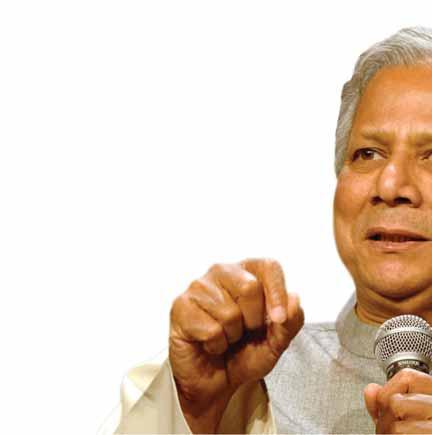
With these words, Nobel Peace laureate Muhammad Yunus gripped the attention of the well-attended webinar titled No going back, organised by Rotary Club of Madras, RID 3232. He said that prior to the Covid pandemic “we were all in a fast-moving train... a high-speed bullet train, rushing to the ultimate journey to disaster with the disaster point not too far away. In my opinion this pandemic has luckily stopped this train and given us the opportunity to get off, take a look around and ask ourselves should we board that train again and finish the journey to the ultimate destination, which is disaster? Or take this opportunity created by the pandemic and go in a different direction.”
Yunus said he was forced to ask these questions because everywhere in the world, the frenzied dialogue
was on how to quickly return to the pre-corona world. He was “worried” because of the “enormous eagerness of governments, policy makers and big businesses to rush back to the world we had inhabited before corona. Governments have been pouring in a huge amount of money in bail out packages, some governments in billions of dollars and some in trillions.”
He spelt out three reasons for saying we were headed towards disaster; the first being global warming threatening to finish the world in just a matter of “two or three decades and not even half a century”. That there was not much time left for this disaster could be seen from “our younger
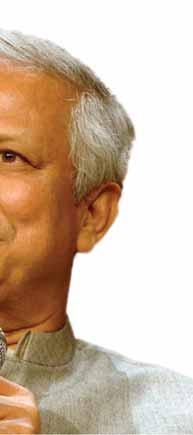
generation marching on the streets and blaming the older generation… accusing their own parents and grandparents, people like us, of being irresponsible. They hold us responsible for destroying the world they have to grow up in, and in which they see no future. We have stolen their future is their accusation.”
The second reason was that “most of the wealth of the world is concentrated in very few hands, and this was reaching an explosive point… like a ticking time bomb and we don’t have much time.” Here too the pandemic had provided the opportunity for more equitable sharing of the world’s wealth.
The third reason for a world heading for disaster was the growing, massive unemployment. Raising a very crucial point, Yunus said that this time the dialogue
on unemployment was different. Normally the talk is about the number of unemployed people, but during this pandemic, the discussion had changed to “the employed people losing their jobs in massive numbers.” There were even startling predictions that in the next 15 years nearly a billion people will be out of jobs. “That is the fast route we are taking to disaster and all because of artificial intelligence (AI) and machines taking over human jobs. That’s not a happy scenario.”
Taking these three major reasons into account, Yunus said, “returning to the pre-pandemic world would be committing suicide.”
He maintained that there were remedies to halt, avert and even reverse this disaster “but we don’t want to do that because we are in our comfort zone.” Giving the example of an obese person, Yunus said, he/ she knows how to shape up but doesn’t actually do it. “We are in the same bus. We know how to stop global warming, the concentration of wealth in a few hands and massive unemployment. But we don’t do it.”
Yunus said one of the ways we can reverse the march to disaster was “by rethinking and redesigning of business. I say business is designed
in a wrong way, because it is based on the premise that all human beings are driven by a single principle — that of self-interest. So I design the business for myself and for profit maximisation. That is the essence of business today.”
This kind of business was based on the “misrepresentation of the human being; a human being is not a 100 per cent selfish being, if it was so, then Rotary would not have been born, forget it having spread all over the world! You came into being because you wanted to do something for others. We have to recognise this economic theory that we are selfish and not walk away from it. We may be selfish and self-interested people;
at the same time we are also interested in common interest and that’s where Rotary comes in.”
Once this was accepted then we’ll have to bring in two kinds of businesses; one that we already have, business for profit and the other which economists never recognised, but its time has come. This was social business or business to solve other people’s problems “rather than make money for ourselves. In one business there is maximisation of profit or profit for myself; the other is just the reverse, and more efficient than charity, as charity money goes out to do good, but doesn’t come back.”
Hence he has advocated the idea of social business, where the money
The younger generation holds us responsible and accuses us of destroying the world they have to grow up in, and in which they see no future.
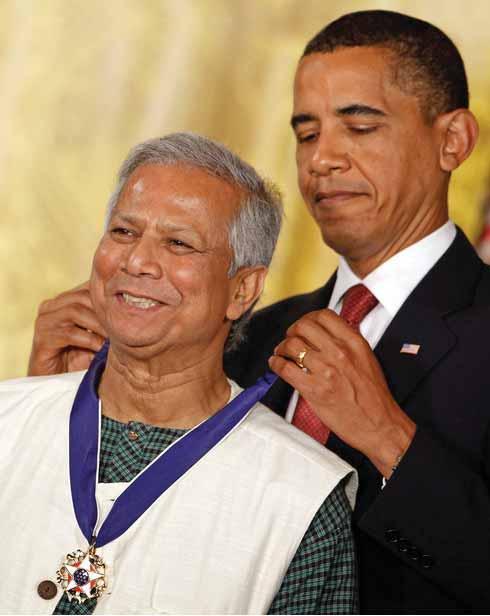
Business is designed wrong; it is based on the premise that all human beings are driven by self-interest. But that is a misrepresentation of the human being, if true, Rotary would not have been born.
But once the education system was tweaked to make entrepreneurs of the young, next the financial system will have to be made suitable to help them. While in the entire Indian subcontinent “we are proud of our entrepreneurs,” the very definition of the word “entrepreneur” would have to be changed and made more inclusive.
countries. So we have to introduce the idea of the micro entrepreneur and support that system.”
Lcomes back through some profit and can be recycled again and again to do tremendous good. Referring to RIPE Shekhar Mehta’s opening remarks on the money Rotarians in India had spent on water and sanitation and other community projects, he said “all this money you spend on your programmes, can be recycled, if the model is tweaked.” Giving an example, he said, “when you reach clean water to people, they can pay tiny money for it which can be recycled and you can use that money again instead of raising money every year, and you can enlarge social business in a massive way.”
Coming to the colossal problem of unemployment the world will face as the pandemic will take away jobs from the already employed, Yunus said: “In education, we say get a good education so that you can get a good job; we say this as though a job is the destiny of every human being. But I say human beings are not born to do jobs, they are born entrepreneurs, but our education system never opened that door of opportunity for them. It shut it down making everybody a job seeker and taking away the creative power of young individuals.”
Giving the example of migrant workers, he said millions of them “leave their homes to sell their skills, either selling their wares on the roads, or bringing in different and special skills required for different jobs, but suddenly you get the corona pain and we found millions of them walking back home. So I say what kind of an economy is this which treats its migrants thus?”
eaning heavily on Rotarians for their help and partnership, the Nobel laureate said, “I want Rotary to be a joint partner in such ventures, support and finance them.”
Asked a question on the future of microfinance and whether it would be able to “survive this huge crisis,” Yunus smiled and said, “I think about 65–70 per cent of the population of India falls into the informal sector, they take care of themselves, survive on their own and for their financial needs depend on the loan sharks, of
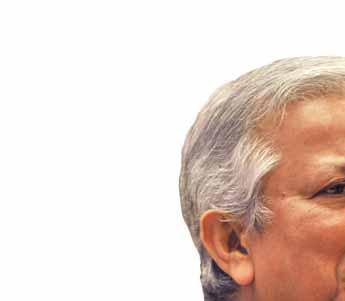
Yunus suggested that “the entire economy of the informal sector should be recognised as a micro entrepreneurial sector. If you do that, you will need a whole lot of rules, policies and actions, because as long as you call it the informal sector, you have no responsibility towards it, and those belonging to it are on their own. But why should they be on their own? They are the base of the entire pyramid of entrepreneurship in our

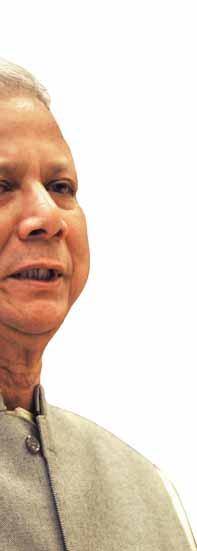
one kind or another; the tiny one, the large one, the neighbourhood one.”
And a major portion of whatever they get from the immense hard work they do is taken away by the loan shark. “So why don’t we create a financial system for them? Earlier it used to be said that we can’t have banking for poor people. We have proved it that it can be done, both in Bangladesh, India and elsewhere. And yet it is not within the reach of millions. So why don’t we build a financial sector in such a way that nobody is left out. If we do that, the loan shark as a concept will simply disappear. We can do it.”
Microcredit had been established as “absolutely legitimate banking. We started it in a small way in Bangladesh and then it spread to India in a big way and then became a global phenomenon. And yet, comparatively speaking, it is small and just a footnote in the financial sector because there is no government policy on it. I have been pleading why not the government create a ministry of micro entrepreneurs (ME). If you have ministry of labour, then why not for ME; they are larger in number and potentially more powerful. Once you have a ministry of ME, then you have the responsibility of building this sector and creating ME banks, which
aying that Covid-19 had “given us the opportunity to take outrageously bold decisions,” Nobel Peace laureate Muhammad Yunus called upon Rotary to take a leading role in this mission. Displaying his respect and regard for Rotary, he said, “my relationship with Rotary goes a long way back, we have worked together at various levels over a period of time. You have a big role to play in the post-corona world, not only in India or the subcontinent, but also globally.”
The “very important role that Rotary can play is in redesigning and rethinking of old ideas.” Once it was accepted that we did not want to return to the imperfect world in which we were living before Covid, “the next question is where do we
don’t make money. Grameen bank was never invented to make money but to serve people.”
go and how do we go to a new world, which is a reverse of the old one without global warming and concentration of wealth in a few hands, and loss of jobs… a world of zero wealth concentration and zero unemployment.”
He added that “we know how this can be done, and are not completely clueless; we know what is happening on fossil fuel, but do nothing about it. We know plastic is bad, how to get rid of it, but we don’t do it. We know what AI is but we don’t want to address that.”
He was optimistic that Rotary can help; “I mention Rotary because I know it is beautifully organised and has tremendous power, and power that is global. Look at the way Rotary clubs take up a project and get it done.”
Human beings are born entrepreneurs, but our education system never opened that door of opportunity for them. It shut it down making everybody a job seeker and taking away young people’s creative power.
Coming to the question on whether microfinance would survive this pandemic, Yunus gave the example of Bangladesh which had displayed the successful model of microfinance. “This country is known for natural disasters, and we’ve had one disaster after another. Even during Covid time we had a very big flood. But nobody writes about it.”
He said in Bangladesh, when during a flood, water enters your home, that is regarded a “normal flood”, but
then there are “abnormal floods when water goes over your rooftop and you lose everything… your home, your animals, your savings, everything. This is almost routine, but during such times, microcredit goes on, it doesn’t disappear.”
He said the microcredit programme was designed in such a way that it works for the people and “stands by those in trouble and helps them get back on their feet. That is the essence of social business; it is designed to keep you on your feet. In Covid-19, you have not lost your homes, animals, etc. Compared to some of the floods we get, this is a
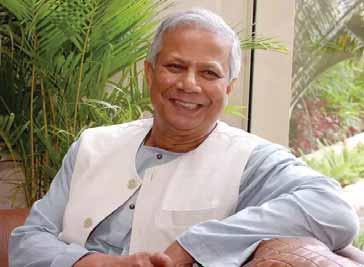
As the coronavirus spread its tentacles and crippled the whole world and there was desperate talk about the need for a vaccine, “I was very worried when I looked at the vaccine situation and saw all big companies getting ready for super profits,” said Prof Muhammad Yunus.
So, before it was too late, he thought it was necessary to appeal to world leaders to declare it a “vaccine for common good, so that there is no ownership on it and nobody has the rights to make big money from it. We were inspired by the polio vaccine. Jonas Salk, who discovered it, said it will be people’s vaccine.” (In a press conference when Salk was quizzed about patent, he famously said: ‘Would you patent the sun?’)
So along similar lines, he is trying to promote the no-patent concept for the Covid-19 vaccine, has got the support of some important people and “we are
now trying to promote it as a UN resolution and have invited major countries, including India, to sign up for it.”
Yunus said the concern was that if the vaccine was under the control of five or six major pharma companies, who are already being paid millions of dollars by the US, UK and some other European countries, when it comes it will first serve the rich. “And then will come the middle class and by the time it reaches those at the back of the line, they will either be dead or in severe crisis. The greedy people will not only make a lot of money, fake or look-alike vaccines will come everywhere and will be given a big marketing drive.”
But if the vaccine was made a patent-free product, billions of dollars would not be made in profit from genuine or fake vaccines and “we can ensure that the poor people of the world will get
it free. Social businesses can give it free to the poor by making the rich pay a little extra for it.”
Intervening at this point, RIPE Shekhar Mehta said Yunus had given the example of polio, “and we in Rotary have this legacy of doing polio eradication work around the world. We are now in the process of starting a discussion on what is the role Rotary can play when it comes to the corona vaccine distribution and we will take note of what you have said about your petition to the UN on the Covid-19 vaccine.”
He sought the Nobel laureate’s suggestion on how Rotarians can help, to which Yunus responded: “This is a very important issue. When the vaccine finally comes, mostly, it will be controlled by the governments of the world. So you have to negotiate with the government on what role it will allow Rotary to play. The governments will want to take the credit and make sure the minister saab comes and makes a speech, but the real work will have to be done by somebody. It will have to be a diplomatic negotiation. But you will have to take the responsibility to go to the remotest places and reach those people this vaccine.”
There were many remote places where nothing will enter in the foreseeable future, so Rotary should take that responsibility; even though a small one, it will make a significant difference.
“And I am talking global here… you will have to go to Latin America, Africa, and similar regions, which will be the last to get the vaccine.”
There are startling predictions that in the next 15 years nearly a billion people will be out of jobs. That is the fast route we are taking to disaster.
tiny and temporary thing, you will suffer but you still have your family.”
Asked by RIPE Mehta on what Rotary should do and how it could help, Yunus said: “Many things, we have annual gatherings, which you can attend; we have some big companies on board such as France’s Danone, McCain Foods, the Canadian company, and some Japanese companies. We have a lecture series, which you can attend and get ideas. Rotary clubs can create
a social business fund, which is a twoway fund and money will come back, so that you can do more projects.”
These businesses ask the unemployed who are keen to become entrepreneurs to come forward with business ideas and help them with both professional advice and finance. “You give the money the first time, it will come back and then if he wants a second round, you can have a phase two in that business. In the first phase, a social business can be a tiny little thing. You can help so many. Getting five people out of unemployment is not rocket science, but all we think of doing is call somebody and recommend a person for a job when an unemployed comes to you. But that is not the solution. The solution is how this guy can create employment for others. That is transformational. In Bangladesh we say we are not job seekers, but job creators. Many successful people started small, luck favoured them, but it doesn’t favour millions.”
Earlier, addressing the meet, Mehta shared with the Nobel laureate some of the community development projects that Rotarians have been doing in India on water and sanitation, health, literacy and education, livelihood enhancement,
etc. “This is Rotary’s 100th year in India and we thought that as we have some 150,000 Rotarians, it is time that Rotary plays a role in nationbuilding. Doing small projects here and there doesn’t suit a 100-year-old organisation, so for the last 5–6 years we have been working on various issues, literacy being in the forefront.”
Making India fully literate was a passion that Rotarians shared and towards that goal they had taken several initiatives, the latest being augmenting the e-learning programme in government schools. “By 2025, we want to go to each and every government school in India and change the medium of learning to audio visual. You and I have learnt about solar eclipse from black and white text books, but imagine now we can visually show the children the movement of the earth, moon, etc so that the child can grasp these lessons much better.”
He explained how during the pandemic Rotary has struck a partnership with the Indian government whereby the e-learning content it has given will be beamed across every nook and corner of India through 12 TV channels the government has created for education. Mehta said now Rotarians from Nepal and Bangladesh were also being involved in this project so that they can replicate the e-learning models in their country.
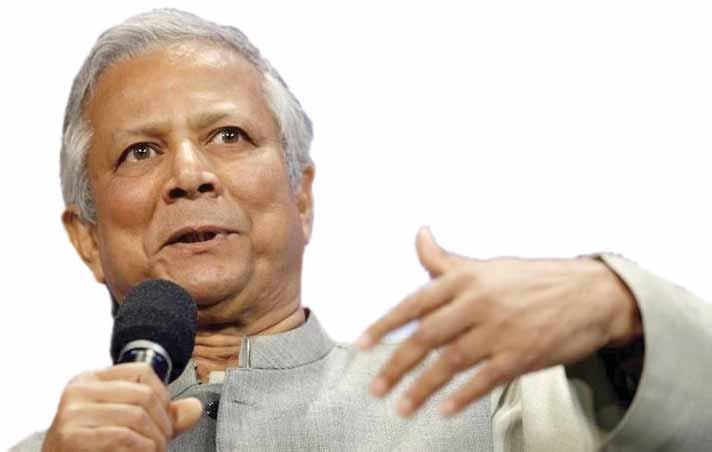
Welcoming the participants, RC Madras president Kapil Chitale said Yunus was the “father of economic revolution in the world of microcredit and microfinance. With one per cent of the world’s population holding 99 per cent of its wealth, such pathbreaking initiatives alone can hope to bridge this economic divide.”
Designed by Krishnapratheesh
Rajendra Saboo
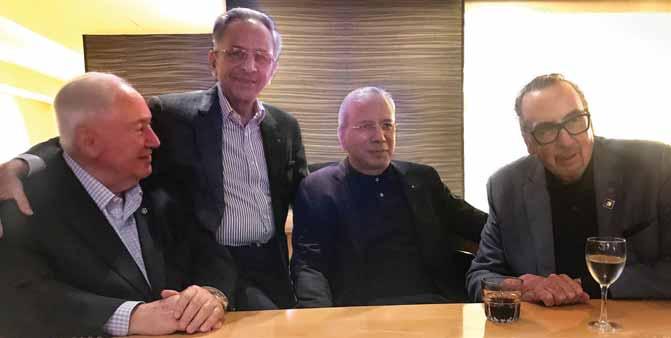
Luis Vicente Giay had unparalleled vision, unquestionable integrity and unsurpassed intellectual gravitas. His professionalism and simplicity made him an exceptional leader of this pioneer service organisation — Rotary. He could see far and he knew that all the beautiful sentiments weighed less than a single lovely action. A man of vision and action, he was a grassroot Rotarian who was concerned about the future.
I met Luis in Monte Carlo in 1983 when he was a CoL delegate, and I, an RI director. Usha and I became instant friends with Celia and Luis. We would tease them as “love birds” as they were so youthful regardless of their age. Luis, who became a governor in 1974, was senior to me by two years. He was
group discussion leader (now training leader) for three years — 1981–83. I had that responsibility two years earlier. When we met in 1983, we made up for the lost time in our Rotary journey.
In 1990-91, Luis was aide to President Paulo Costa and I was RI president-elect. Both Paulo and I were very close friends but had some sensitive issues which we resolved with the help of Luis and my aide, past RI vicepresident George Arceanaux.
As RI president I visited Argentina and Luis organised my three-day visit and was my local aide. We reached the Argentinian President Carlos Menem’s office for a courtesy call. On the time allotted to us, his secretary said: Normally 15 minutes but if he asks for coffee in 10 minutes, then it will be his call.
Argentina had a cholera epidemic then, and after the initial courtesy words, I told the president that India suffers the spread of cholera every year but is able to control it. If he desired, I could organise the visit of some experts from India to Argentina within a week. They could stay for four weeks and along with local doctors, plan how to control the epidemic.
The president immediately called for coffee and his health minister, and spent almost an hour with us. I managed to send three specialty doctors and a public health expert from India within a week, and with Luis as the national coordinator, the project succeeded. It was a memorable experience.
The climax came with Luis as RI president-elect in 1995–96 and I, the
trustee chair-elect. Luis said, “Raja, next year is Paul Harris’s 50th anniversary. What can we do to commemorate the occasion with a lasting programme?”
I said Rotary had done almost every worthwhile programme and wondered what new could be done. But Luis was very persuasive and I said: “We will think”. I thought of a Paul Harris Centre for International Studies in Peace, and gave the blue print of the idea. Luis was thrilled but being a practical leader, said it would be a massive programme. Could RI or TRF handle it? By 1996–97, at the Glasgow Convention, Luis and I jointly announced the programme, now known as the Rotary Peace Centres, a flagship programme of the Foundation.
Towards the end of 1995–96, the RI board had decided to shift the trustee chair’s office to the 17th floor of One Rotary Center, and the trustees threatened to shift the complete Foundation to another location. Again Luis and my personal relationship helped.We had a two-day retreat for the RI president, two
incoming presidents, the TRF trustee chair, and the next two incoming chairs at a hotel in the O’Hare area. That dissipated the stress, anger and other negative reactions. An action plan was evolved to sustain harmony between the RI board and the TRF trustees.
I understand that this concept of a retreat is still prevalent.
Our trip together in August 1996 to South Africa to launch the Kick polio out of Africa campaign, inaugurated by President Nelson Mandela, was significant and crucial. About 30 of us met with President Mandela, but the security people wouldn’t allow our going near him to shake hands with him.
As the meeting ended, I sought the president’s permission to allow RI President Luis Giay to pin the Rotary End Polio button on him. The president couldn’t say No, and in the evening we even danced with President Mandela! This was a highlight of the year.
Luis visited India many times, coming to Chandigarh from Jan 25–28,
2001, as the RI President’s Rep. On Jan 26, India’s Republic Day, the killer, unprecedented earthquake hit Gujarat. As our district, under governor Ranjit Bhatia, collected money and material for the disaster victims, Celia and Luis were the first to donate generously.
We have been together on various occasions… at the Peace Centre symposiums, international conventions and assemblies, and always spent time together. Meanwhile Celia came up the Rotary hierarchy and this wonderful couple won Usha and my hearts totally.
A part of that heart has gone. We miss him. The man who had his whole family in Rotary, who lifted Rotary’s name by becoming Ambassador Extraordinary and Plenipotentiary of his country Argentina, who bridged generations in Rotary, will be missed by Rotary.
Luis Giay was not a torchbearer to show the path ahead. He was the torch himself, and has left a blazing trail. The writer is a past RI president.
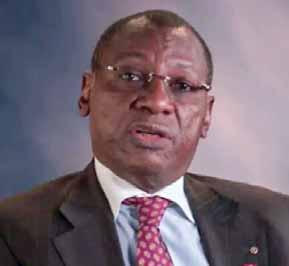
DrTunji Funsho, Rotary’s Nigeria National PolioPlus chair, has been named one of the “100 Most Influential People in the World” listed annually by the Time magazine. He is recognised for his critical leadership in working with Rotary and its partners to achieve a wild polio-free Nigeria and eradicate the virus in the African region. He is the first Rotary member to receive this honour.
PDG Dr Funsho is a cardiologist and a member
of RC Lekki, RID 9110, Lagos, Nigeria.
The Time’s 100 recognises the activism, innovation and achievement of the world’s most influential individuals. Past recipients of the honour include heads of state such as Angela Merkel, religious figures like the Dalai Lama and Pope Francis, celebrities like Oprah Winfrey and Irish singer Bono, philanthropists like Bill Gates, and activists such as Malala Yousafzai.
K R Ravindran
Luis Giay, the 86th RI president, has left us, leaving us only with some wonderful memories. He was adored by the Rotary world and was the doyen of South America Rotary. His theme was “Build the future with action and vision”. A man of wisdom and a huge capacity to love others, he said, “I believe that civilisation is like a big building made out of bricks, thousands and thousands of bricks. Each of us is a brick supporting the grand structure we call humanity.” That’s why the colour of his jacket was brick red. I used to call Luis ‘El Capitán’, Spanish for captain.
He was a public accountant and a businessman, and both of us had the same love — rally car racing. Luis was very good and became a champion at a high level of competition. At one of
the races at the starting grid he saw a bright young woman with brown eyes and long hair in the next car navigating for her father. He’d say that in that one second on the starting grid of the race he knew this woman, Celia, was going to become his wife! He never said whether he won or lost that race with such a distraction!
Luis and Celia made a dashing couple. Celia distinguished herself in her own right. A school teacher, a music professor, a news reporter, vivacious and charming, she became the vice-president of RI in 2014–15. Surely she could not have achieved that without the unyielding backing of her devoted husband. Luis’s career in Rotary was born when he became a member of RC Arrecifes, near Buenos Aires, the same town where he was born. He was 22 then and most of the
other members were old enough to be his father and some even grandfather.
The first time I saw Luis at close quarters was when Vanathy and I walked into the Training Leaders (discussion leaders) opening reception in Anaheim, Los Angeles, in January 1993 and he with Celia received us at the door as the assistant moderator. The moderator was PRID Keith Burnham.
I was picked to repeat a second year and he became my moderator and his team was known as ‘Giay’s Global Genius’. I recognised in Luis even then the qualities of a born leader and a complete man. It wasn’t just his in-depth knowledge of Rotary. It wasn’t even his ability to quickly assess a person and adjust himself to that person’s level; It wasn’t his superb speaking skills in English, Spanish and
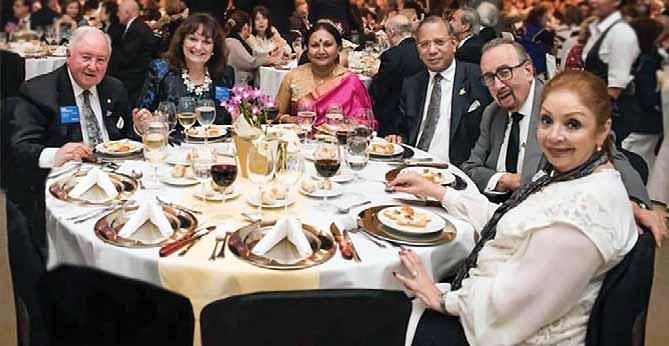
Portuguese. He would often start his speech in English by claiming that his English was not good, but no one was fooled by that because it was excellent. But I say he is a leader because, as someone said, he is not a pessimist who complains about the wind, nor the optimist who expects the wind to change. But a leader who adjusts his sails to the wind. Plus, he had social skills — superb on the piano, ability to barbecue a delectable steak, and so light on his feet on the dance floor!
The first major committee I served on was a year later when Luis had been nominated as president. Luis put me into his committee to develop his theme. The chair of the committee was PRID Howard Vann and the vice-chair PRIP Paolo Costa. I saw him masterfully steering that committee without in anyway usurping the position of the chair. It was also good to see the jousting and the thrust and parry between Paolo and Luis, clearly great friends — Luis was the aide to Paolo when he was president.
When I was nominated to the Board of Trustees in 2004, Luis was trustee chair. He put me into the investment committee. After the first meeting I went up to him and asked to be relieved from the committee as it was much too complex for me. He took me aside and said, “when you become president you will need to know about investments. So, stay there and learn the subject!”
When he was RI president, the TRF trustee chair was Rajendra Saboo. They were the original architects of the Rotary Peace Centres and again it was the two of them who were in South Africa with Nelson Mandela to launch the “Kick polio out of Africa” campaign in 1996. Those two indeed were a powerful team that year.
Luis was the master who steered TRF’s Future Vision Committee for several years and brought it to fruition.
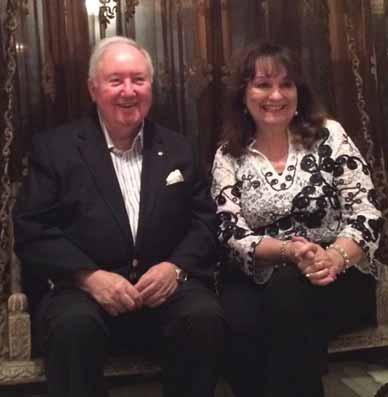
Giay and Celia at PRIP Ravindran’s home in Colombo.
Our Foundation owes him so much. As chair of the committee he had a clear vision of what was wanted and where the Foundation should go. His committee included PRIPs Ron Burton, Mark Maloney and the present trustee Gulam Vahanvaty.
He was one of three past presidents I relied on heavily when I was president myself. He never failed me with his advice and assistance and I recall him turning up at my apartment one evening with two bottles of very special Malbec wine he had carried from Argentina! He had been assigned by me to restart Rotary in Cuba.
One morning in 2001 Luis was in New York talking to Evanston on the phone whilst looking out from one of the high floor hotel rooms he was occupying, and he noticed in the near horizon, a low flying aircraft and he did wonder at that. And the next instant, the aircraft flew straight into the World Trade Centre building!
He was literally an eyewitness to the events of 9/11.
There was a gentleness about Luis, a largeness of sensibility, a love for fellow Rotarians felt by all those who came into contact with him. At our home in Sri Lanka one evening I saw how he left the main table at dinner to go sit with my other club friends — regaling and engrossing them with his stories, and Luis was a good story teller — in a space of 15–20 minutes he could relate the struggle, the conflict and the resolution. He and Celia brought a glow to the presidency of Rotary, a breath of fresh air and a pause for beauty and love.
Hasta la vista, El Capitán! We will miss your cherubic face and your disarming smile. And I echo Shakespeare’s beautiful words from Hamlet “Good night, sweet prince; may the flight of angels take thee to thy eternal rest.”
The writer is a past RI president.

In the early 1990s, polio was still a concern in my country. As the Sri Lanka PolioPlus Committee chair, I was part of a task force of Rotarians, government officials and UNICEF representatives that drove all polio eradication efforts, including National Immunisation Days (NIDs).
But those were difficult days; civil war was raging in Sri Lanka. The government said NIDs could happen only outside conflict zones. This meant one-third of the country’s children would not be vaccinated — an unacceptable proposition. Rotary stepped in with UNICEF to engineer a ceasefire. Establishing contact with one of the world’s most feared and elusive rebel leaders was not easy, and we were careful to maintain Rotary’s good name during negotiations.
A few weeks later, my secretary delivered a letter to my office, her hands shaking. Signed by the rebel leader himself, it read: “Dear Mr Ravindran: If you can persuade your government to stop the war for two days, then we are willing to lay down our guns for two days too, for our war is not with children.”
Soon the NID was on, and vehicles bearing the Rotary emblem travelled to the vaccination booths in the areas occupied by insurgents, receiving the same respect and courtesy as the Red Cross.
Obstacles can seem insurmountable until we overcome them. In March 2020, the polio programme made the tough decision to temporarily suspend polio immunisations while the polio infrastructure that Rotary members had helped build was used for Covid-19 response. But with the wild poliovirus now banished from the African region and circulating in just two remaining countries, we continue to move forward. Our history shows that we can overcome even the most difficult situations. But we can’t do it without your help.
World Polio Day is October 24 and it’s the greatest opportunity we have to raise funds and awareness for Rotary’s polio eradication efforts. Visit endpolio.org/worldpolioday to get tools for planning virtual events and fundraisers, and to register your club’s event.
Please consider making a donation to End Polio Now, to be matched 2-to-1 by the Bill and Melinda Gates Foundation. In the face of a pandemic, there is a serious risk of further spread of polio. Your support is more important than ever, and it will ensure that together we can tackle the remaining obstacles and achieve a polio-free world.
IK R Ravindran Foundation Trustee Chair
n Nov 2004, the RI Board agreed that every club should have, as part of its standing committees, a Rotary Foundation committee to educate club members about TRF and involve them in its activities. Only when Rotarians learn about their Foundation and become aware of the good that it does in the world, they will voluntarily support it, both financially and with their time and talent. Similarly, every district is required to have a District Rotary Foundation Committee (DRFC) which assists in educating, motivating and inspiring Rotarians to participate in Foundation grants and fundraising activities in the district. This committee is headed by the DRFC chair (DRFCC). This is a critical assignment and, to be effective, the DRFCC must have continuity and is therefore appointed for a three-year term. The importance of this position can be gauged by the fact that districts will not have access to the District Designated Fund until the DRFCC is appointed.

Experience has shown that Rotarians who have participated in TRF programmes, or have seen first-hand how the Foundation transforms lives, are more likely to offer support and contribute to it. It is said, “the mediocre teacher tells. The good teacher explains. The superior teacher demonstrates. The great teacher inspires”.
In mid-October incoming governors in districts in which the three-year term of the DRFC ends in June 2021, will receive a notification to select a new DRFCC. The DGE must involve the DGN and DGND to ensure that the DRFCC is jointly selected by them. I request the incoming district leaders to make this choice carefully and wisely for the greater good of the district.
As Bill Cosby said, “Selecting the right person for the right job is the largest part of a leader”.

Gulam A Vahanvaty Trustee, The Rotary Foundation
Rajendra Saboo
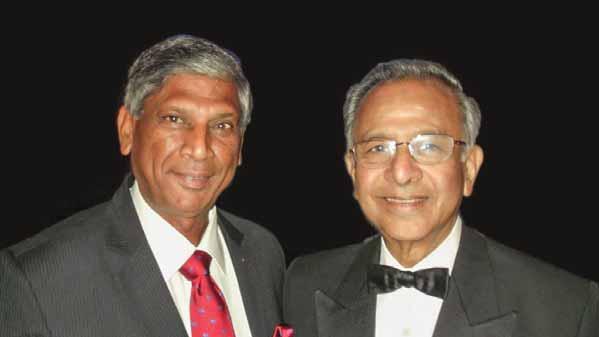
He was a hero in steadfast, purity of purpose and service. He kindled our hearts in friendship.
Yash Pal Das was the embodiment of simplicity, affability, generosity and humility. Commitment was his religion; his integrity was unimpeachable; his credibility was an open book; his professionalism was quality to the core. Cool, calm and patience were his ornaments. He was a gentleman par excellence.
I knew him in the early 1970s, through his
father PDG H K Das.
Yash was drawn to Rotary very quickly and I developed affection for him.
And yet, when he stood for the district governorship, his election was nullified by my RI board, when I was RI president because of the violation of some provisions by the district. But he was not disqualified and in the re-election, he won almost unanimously. Despite this episode, Yash and his wife Manju, became close to Usha and me.
To strike a lighter note, Yash had gained
weight during his RI directorship, but later he shed more weight than he had gained. I asked him how he did it and his response was, “I cut out fried food, sugar and alcoholic drinks.”
I knew he loved all three, but when it was needed, he did show the determination.
The challenge of building schools up in the Uttarakhand hills, following the flash floods, stands as an epitome of Yash’s leadership. The Rotary Cancer Hospital in Ambala is another
example of his commitment. The fight against tuberculosis shows his sense of responsibility. His role in making India polio-free speaks of his passion.
As I share these emotions, today, Sep 23, is Yash’s birthday. It is the equinox — where day and night are equal. It reflects Yash’s character, total balance — as equal inside as outside. im. He was The complete man who made goodness attractive.
The writer is a past RI president.
Ashok Mahajan
My friend Yash Pal Das, past RI director and an illustrious son of Ambala city, passed away on September 22 in New Delhi. He was more than a friend… a brother to me. I have been singing his praise all these years and now he has made me write a tribute to him, with my eyes filled with tears.
He showed Rotarians the good that is possible to do for our world and made each of us believe that we can do wonders to make this world a better place to live in. He showed us that service through Rotary can be challenging and yet pleasant and enjoyable.
Yash was an optimist who lived by Rotary first. As my batchmate district governor during 1993–94, I found him
uniquely multifaceted. But far beyond business, in which he won laurels as an ethical businessman, he was a people’s man first.
An outstanding Rotarian, an inspiring speaker, a visionary leader, he was all that, but above all, he was a very fine human being. Those who have moved with him or even come in contact with him briefly would have admired his gentle manners and would have been unable to resist Yash’s contagious and intoxicating positive energy.
As a fellow member in the India National PolioPlus Committee with me, he was most respected and admired for his relentless work in polio eradication. He showed that he was an eternal optimist and a passionate believer in
eradicating polio from the world and immediately from India. And who can forget the excellent work he did in building 25 quality schools in the Garhwal Himalayas, the region that was devastated by floods. He personally supervised this as well as the construction of a primary health care centre at Phata, Uttarakhand.
He participated in various International Assemblies and Rotary conventions and energised a new generation of Rotary leaders who went back to serve in their districts.
Y P, as he was fondly called, believed in building an innovative Rotary in India. He believed in straddling the pyramid from top to bottom. He was called upon by various RI
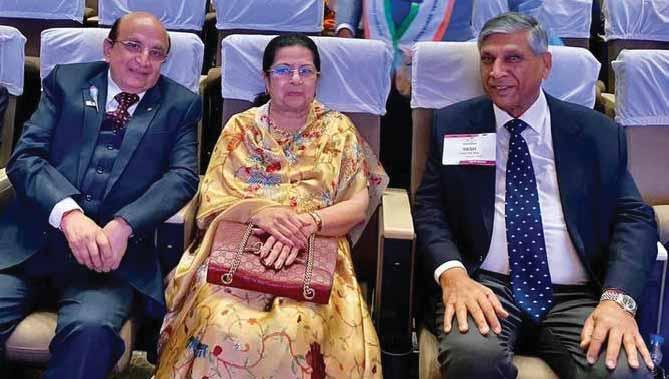
leaders to be in committees that dealt with contentious issues concerning the administration of Rotary districts and clubs. His selection as the chairman of the most powerful Executive Committee of the RI board showed that all the board members had implicit faith in his ability to handle any issue that Rotary might have to face. He always came up with solutions that smoothened the rough edges and put the movement back on rail. He was regarded as one of Rotary’s best thought leaders.
The very embodiment of three qualities — passion, compassion and character, his advice to Rotarians was that they should develop the power of positive thinking that would catapult Rotary into the minds of a a bulk of India’s 1.3 billion.
He placed great importance on ethics, values, family and relationships. His integration of Rotary with day-to-day life made it easy for members to develop personal as well as public integrity.
His tenure as RI director (2011–2013) was remarkable as he shaped Rotary’s policies in empowering the clubs and motivating club members to follow strict financial discipline while dealing with Rotary funds and that of the larger community.
As a leader of the automotive retail network of the Tata group in Ambala, he received numerous awards for his expertise and leadership. I’d always tell him that Rotary projects done in Ambala by his club were amongst the best any club could hope to ever do and they kept the name of Rotary flying high in Ambala, as the rest of India.
He was a much sought after speaker in Rotary and other forums and with penetrating insight and relevant anecdotes, he revealed step-by-step ways of doing good through Rotary. His spouse Manju provided the needed support to Yash throughout his life. The couple was magnanimous when it came to giving for charity and community service.
Shekhar Mehta
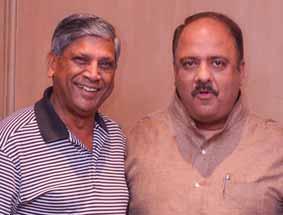
The passing away of Yash Pal Das is shocking and unbelievable. I spoke to him three days earlier while he was in hospital and he was spirited and optimistic.
What an outstanding human being… soft spoken, mild mannered, humble and very positive about everything.
He and I shared a very, very special bond, especially because of the two years that we spent together on the board of directors of Rotary International. He played his role very well there. At these meetings he spoke less, but when he did, it carried a lot of weight.
With Kalyan Banerjee as president and the two of us as board
No words can express the loss we feel. A fine speaker, Yash Pal Das, has taken his final bow from this world’s stage. The man with unwavering resolve, the man who did what must be done, might have left us, but his memory will last forever. The whole
members, we were often jocularly referred to as the “Indian mafia”.
Post board meeting every day, we foursome (Yash, Manju, Rashi and I) would venture out for dinner, spending some real quality time. I tried to keep pace with his pegs of whisky with my glasses of diet coke. It is so hard to believe he is no longer amongst us. I have such fond memories of him, all flashing before the mind continuously, relentlessly, painfully.
Both Rashi and I have lost a dear, dear friend, who we will miss hugely. We pray to the lord to give Manju and the family the strength to bear this enormous loss.
Om Shanti.
The writer is RI president-elect.
of Rotary world will mourn the passing away of a legend. Rotarians will remember him as an example of how to be, what to stand up for and what it is to live with integrity and character.
The writer is a past RI director.
It was a memorable Independence Day this year for 51 Class 10 students of the Colaba Municipal School in Mumbai, as all of them got a spanking new smartphone as a gift from members of the Rotary Club of Bombay Harbour, RID 3141.
The club, with a membership of 40, decided to make this gesture to the less fortunate students from this school to help them attend online classes which will be crucial for their performance at their board exam in 2021.
Club president Jayesh Pandya says they chose this particular school
to help the senior students with mobile phones as “our club has had some association or the other with this particular school for almost 20 years.” In the past several years, the members have built a basketball court, organised science exhibitions, given career counselling to upgrade the students’ skills, provided special sports equipment and other facilities as required by the school.
As the corona pandemic tightened its stranglehold on Mumbai, along with the rest of India and the entire world, “we wanted to help the students
once again, and so had a discussion with the principal on how to go about that.” The principal suggested that many of the 120 students in Class 10 do not have smartphones, which are now essential for them to keep up with their online classes. So with the help of the principal and six teachers, 51 students, daughters and sons of daily wagers, slumdwellers and other underprivileged people, were identified and the club undertook the responsibility of gifting them mobile phones.
Pandya explains that they didn’t want to “give these children just
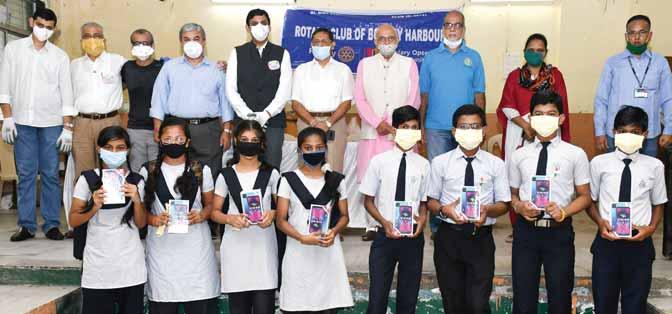
For Muskan
Shaikh and A Ashish, Class 10 students of the Colaba Municipal School, the Rotarians of RC Bombay Harbour are none less than angels.
“Ma’am, Jayesh Pandya sir, and other club members have been helping our school for 20 years. They have given us books, been counselling us after classes, conducted competitions for us and given us prizes. And now they have given us the biggest and most exciting gift, a smartphone,” gushes 15-year-old Muskan.
The daughter of a daily wage labourer, Mehboob Shaikh, she, her parents and two other siblings live in a slum area in Ambedkarnagar.
“My family cannot afford a mobile phone and I was so worried about how I would
attend online classes, complete the worksheets and other homework. But now with the smartphone that this Rotary club has given us, I am able to complete my worksheets and submit them well in time,” says the chirpy girl in a chat with Rotary News. Insisting on speaking in English, which she does with confidence, she adds, “And doing that is such a huge relief! All my tension is now gone.”
Muskan answers her phone on the first ring, showing how precious this device is for her. She has three two-hour classes every day, and her three siblings are in school too. She promises to work very hard, do a degree course and then become a psychiatrist. Asked why this
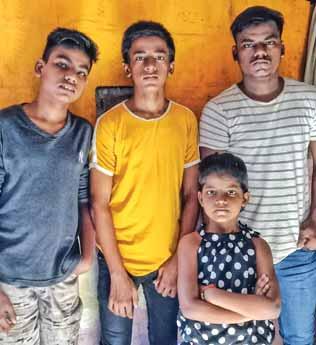
A
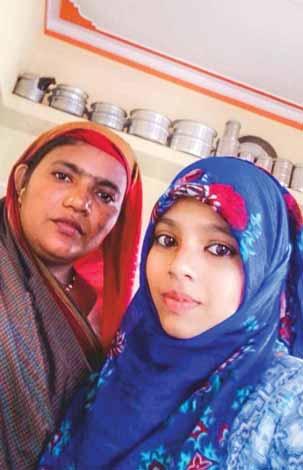
profession, she says, “Because I want to know all about the mysteries of the brain!”
A Ashish is the son of a driver, and though along with his two other brothers, he studies in Marathi medium, “my younger sister, 8, is in English medium,” he says proudly. Asked why, he says simply, “Because she is the smartest of all of us, and could speak English from a very young age.”
He didn’t find it hard to learn quickly how to use a smartphone because his father, Rajpal Nathuvalmiki already has one “and I would use it sometimes. But now it is such a relief to have my own
phone and when I don’t have classes, I give it to my brothers or sister to use it for their classes.” The 16-year-old is in awe of Rotarians and grateful to them because “their club has been helping our school so much in the past.”
His dream is to become a police officer and towards this goal, he promises to “work very hard, pursue a degree in science and then get into police service,” he adds.
I request them to send their pictures, and good quality, sharp images land in my Whatsapp in five minutes flat. Comments Jaishree, at Rotary News, wistfully: “If only the Rotarians were as quick…”
any phone. We wanted to give them instruments that would have sufficient memory and the features to be able to properly attend their online classes and store study material.”
The hat was passed around to club members as well as non-Rotarian friends and relatives and `3.5 lakh required to buy 51 instruments was collected. Again, one of the Rotarians who knows a mobile phone dealer was roped in to get a neat discount and “also the right kind of model, which would be the most suitable for online classes. We were very particular about giving them the right model of the phone because last year this school had a success rate of over 94 per cent in their board exams, and we want the school to keep up its good record,” he added.
Keeping in mind the need for small gatherings and social distancing, the 51 students were called in two batches and the mobiles were distributed to each one of them by the Rotarians and the dignitaries such as Madhukar Palkar, education officer, BMC (Bombay Municipal Corporation), Assistant Commissioner
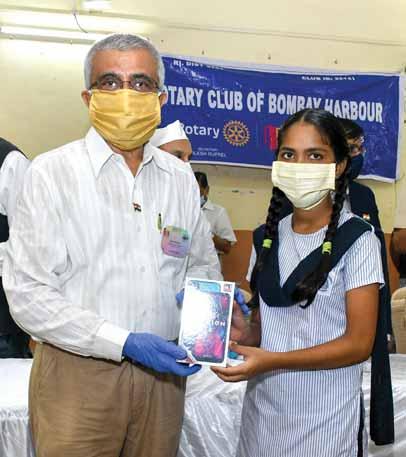
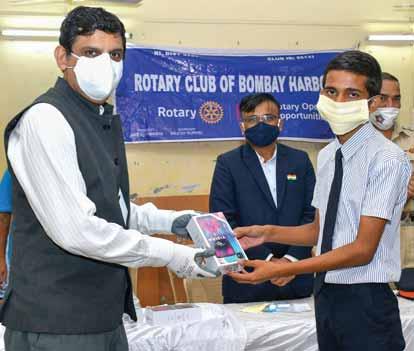
of Police Dalvi and others. Four Jio representatives were also present to activate the sim cards — the Rotarians had earlier submitted the Aadhaar cards and other necessary documents to the service provider and have also given the students free connectivity for the first four months. Future renewals will have to be done by the students, but if some of them have a problem, the club members have promised to help.
Pandya adds that 15 Rotarians contributed for this project led by project director Devang Vora, and supported by Rtns Nilesh Ruparel and Dilip Jani.
Apart from this project, RC Bombay Harbour members have done other Covid-relief work such as distributing 4,000 free meals during July, and joining other clubs to give critical care medical equipment to hospitals.
Kiran Zehra
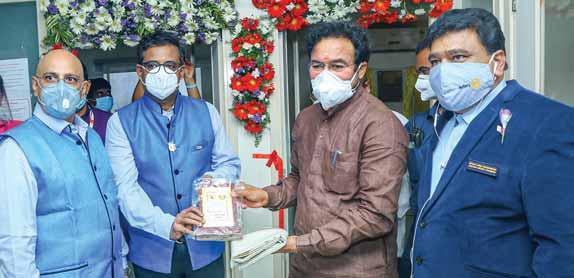
RC Hyderabad Deccan president VVSN Raju honours Union Minister G Kishan Reddy at the inaugural of the plasma bank. Also present DG N V Hanmanth Reddy (R) and past president Sharath Choudary (L).
RC Hyderabad Deccan, RID 3150, launched a plasma bank at the Rotary Challa Blood Bank in the city. The new facility, inaugurated by Union Minister of State for Home Affairs G Kishan Reddy, will cater to the growing demand for Covid convalescent plasma being prescribed by doctors as a line of treatment for serious cases.
A blood donation van procured through a global grant in 2018 in partnership with TRF and RC Napierville, Chicago, RID 6450, will be pressed into service. “It is equipped with everything necessary for blood donation procedures like collection equipment, donor beds and short-term storage solutions. Recently it was equipped with
disinfectant jetting machines that sanitise the van after every collection,” says Anand Kankaria, the PR director of the club. This special van will enable Covid recovered patients to donate plasma with ease and convenience at the time and location of their choice.
Donors will be pre-screened for antibodies and other blood parameters from the comfort of their homes. The plasma donors can either come to the blood bank or donate blood from home, says Kankaria. “This is to encourage voluntary blood donation and provide blood products, free of charge to poor and needy patients in government hospitals.” The spouses of club members are helping patients find the right donors. “We
not only find the right match but also call the potential donors and motivate them to save the lives of Covid patients,” he says. But the actual success of the plasma bank, he points out, will be “when donors come forward. We have created a hassle-free and safe donation experience and appeal to patients who have recovered from Covid to come forward to donate plasma so that they can become a Covid saviour rather than just a survivor.” Patients and donors can register at www.plasmaforyou.org.
The club also conducted a tree plantation drive. Club member Devendra Surana planted 10,000 trees at his factory, while other members planted saplings at their residence and office premises.
The Aahar kitchen in Shillong provides free food to at least 300 people daily. It was launched in 2018 by the Ardhendu Charitable Trust, of which PDG Manas Chaudhuri, RID 3240, is the managing trustee. The trust was formed to perpetuate the memory of his brother Ardhendu who died in a helicopter crash. “He was a large-hearted MLA, popular among the people in Meghalaya. It was only
right to launch a programme to feed the hungry on his death anniversary (Sept 22),” says Chaudhuri, adding that the motto of his trust is Service above self, in line with that of Rotary. A former Editor of Shillong Times, he has been honoured with a Padma Shri Award by the then President Abdul Kalam, for his service to journalism. He has also served the state cabinet as a minister.
The food, strictly vegetarian, is prepared by a team comprising a
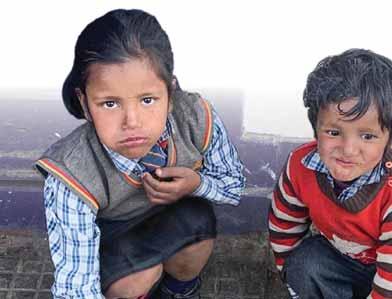
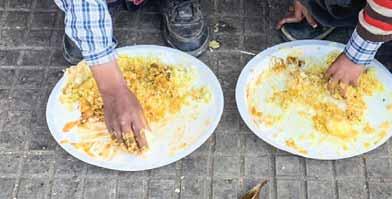
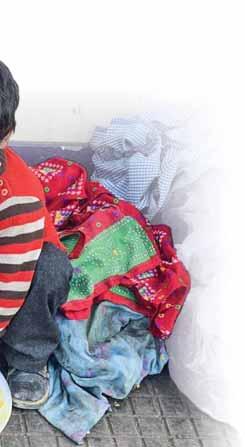
cook and three helpers at the trust’s kitchen and taken in a van to a place called Jhalupara at 12 noon, where people are waiting patiently in a queue on the sidewalk. The table is set with the necessary protocol — dustbins, a handwash station and soaps — in place. “We ensure that our ‘guests’ wash their hands before eating because many of them are so hungry that the sight of food attracts them straight to it, throwing hygiene to the winds,” he smiles. Food is served on stainless steel plates and “a second or third helping is never denied. Many of them bring containers and pack their dinner too.” He says an 80-year-old woman who eats very little, takes some for her physically-challenged neighbour every day.
A team of volunteers help in the whole exercise that lasts for an hour or so. Initially a token amount of `5 was charged for the meal. “The idea was to avoid giving them a complex for having a free lunch. Moreover, every morsel must be valued.” But with the ongoing pandemic and the poor taking a big hit, food is being distributed free since April.


I am proud to say that I am not a career politician, I am a Rotarian.
PDG Manas Chaudhuri founder Ardhendu Charitable Trust
During the lockdown, the Aahar initiative gained significance as roadside eateries and restaurants were closed. Even the affordable came to eat this lunch. However, the programme had to be halted for a few days when the Covid situation was at its peak. “When we resumed work I came across an old man, a regular at our stall. He took out half
a loaf of bread from his bag and said, ‘I was surviving on this for five days. I would have a bite and down it with some water whenever I was hungry.’
Many people have become dependent on Aahar for their daily sustenance and, when the lockdown was announced, it came as a double whammy for them,” says Chaudhuri.
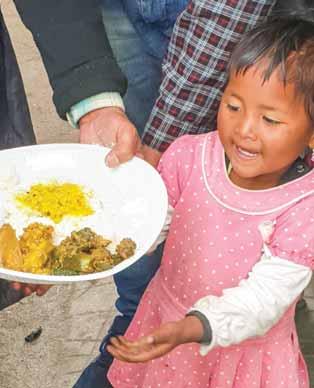
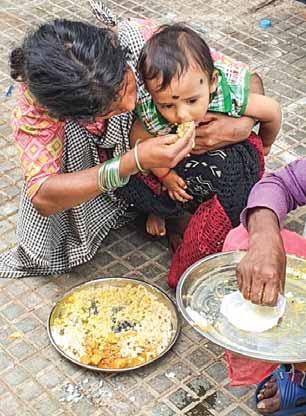
The team, at the request of the local police, has added one more location at Paltan Bazaar, for distributing food. The volunteers follow the Covid protection protocol, including masks, sanitisers and maintaining physical distance. Before serving, the entire area and the tables are sanitised with bleaching powder and disinfectant.
The menu generally comprises rice, dal, roti, chutney, subzi, and lots of green chillies and salt, a combo which is an all-time favourite, says Chaudhuri, adding that this spread would easily cost `100 in a restaurant. Many
local citizens sponsor the day’s meal, offer sweets, pastries, fruits etc, either to celebrate a happy occasion or remember the loved ones they have lost, or just for the pleasure of providing food to the less privileged. “Either way, it is truly fulfilling for all concerned.” More recently, IPDG Dr Debashish Das sponsored a day’s meal to share his satisfaction in having completed a rewarding stint as the district governor.
Chaudhuri says that they do not discriminate between the poor and those who can afford a meal. The food is so tasty and hygienic that even
the well-to-do citizens eat here. He recalls an occasion when a busload of tourists from Lucknow descended at the venue. “They did not look like destitute. I thought they wanted to see what was going on but they said they wanted to eat. We were curious as to why they wanted to eat this food which is meant for the poor. They said, ‘We told the driver we want to have pure vegetarian food, he brought us here.’ They ate the food, blessed us and left.”
The cost of preparing food for a day works out to `15,000. Other trusts and philanthropists contribute sizeable funds to the trust. In addition, the Meghalaya government is allotting 10 quintals of rice every month from its public distribution system, and groceries are bought at wholesale rates. Chaudhuri’s home club, RC Shillong, also pitches in with its contribution. Recently the club, along with the trust, distributed soaps, sanitisers and masks to the public,
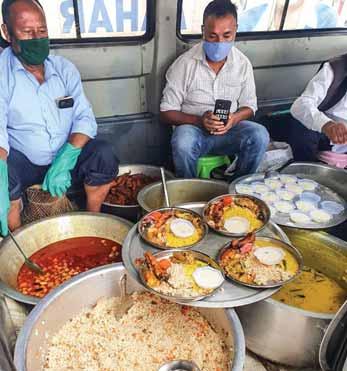
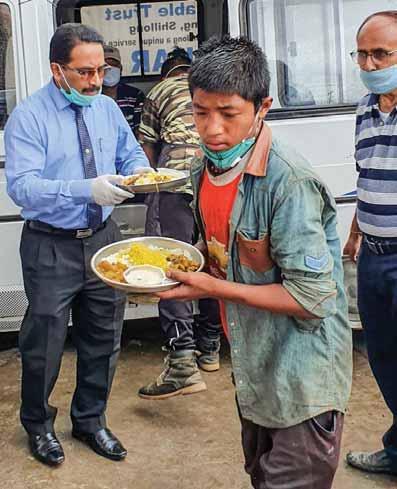
and during winter they provide them with blankets and woollen clothes.
The trust, formed in 2005, addresses the perennial water shortage in the town by supplying water to households at a subsidised rate. Since 2007, a subsidised bus service is being provided to schoolchildren. This is a big boon for the parents who are unable to ferry their children to school and back for various reasons, says Chaudhuri. The trust also provides financial and material aid to the marginalised and scholarships to deserving students.
Two months after his brother’s death, Chaudhuri served two terms as an MLA “on request from various quarters to fill in his big shoes,” and received an appreciation letter from the then PM Manmohan Singh for promptly accounting for every penny from the legislator’s fund. “I am proud to say that I am not a career politician, I am a Rotarian,” he beams. He joined Rotary in 1980 and was the district trainer last year. He has been elected as the district’s representative to the CoL next year.
RI District 3232 has created a team of Rotary journalists comprising enthusiastic Rotarians and Annettes from various clubs in order to disseminate information about the work done by the district to the larger community. A ‘Rotary Writers’ Congress’ was organised for them recently through a virtual platform.
The role of these amateur journalists is to collect, collate and add value to Rotary as a brand through the Governor’s Monthly Letter Powerplay, Rotary’s webpage, Facebook, Twitter and YouTube. The overall objective is to enhance Rotary’s public image.
District 3232 Public Image chairman
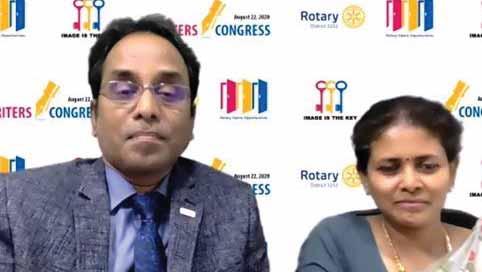
Nachiappan said this idea was given by DG S Muthupalaniappan, and the objective of this programme “is to encourage Rotarians, Anns and Annettes to learn the art of writing well, give them the opportunity to contribute to the GML and train
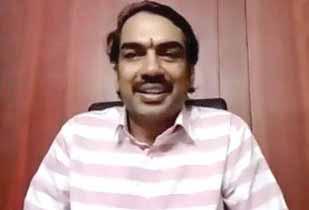
Rangaraj Pandey, founder and CEO of YouTube channel Chanakya.
them. More such workshops will be organised for them.”
Addressing the workshop, Rangaraj Pandey, Founder and CEO of popular YouTube channel Chanakya , who has a massive fan following, said journalists should present the right information and be impartial, and work to bring about a positive change in society. He cited some reallife examples that kept the audience spellbound, saying that the larger community boycotts and rejects malicious and false propaganda driven by a part of the media. He said journalists should be genuine and tell the truth effectively and in a way
that is understood even by a layman.
Editor of Rotary News Rasheeda Bhagat stressed the need for these Rotary journalists to talk about the projects that Rotary clubs in the district execute by covering the beneficiaries and displaying the change that the Rotarians were bringing into their lives.
DG Muthupalaniappan said he had come out with this concept as he believed that the “work that Rotarians do should be covered from the ground-level by the Rotary journalists going into the field.”
Such training programmes will be held every month, said Sukanya Sriram, Editor of Powerplay.
Rasheeda Bhagat

A child beneficiary from Indonesia.
He was only a child of nine, when, accompanied by his pregnant mother and two-yearold brother, was taken by the police in Lahore to the Railway Station. “It was Aug 13, 1947, our colony was burning and there was smoke and shouting and screaming everywhere. We had to run to safety and the police said we can only take you to only one place, the railway station,” recalls O P Khanna, a member of RC Bangalore Indiranagar, (RID 3190) since 1972. “The train was packed and people were hanging on to the roof. But because my mother was visibly pregnant and we were children, we were given space inside.” They reached Jalandhar safely, but it was nearly three weeks before his father, who was still in Lahore on that day and did not know they had left for India, came to know that his family was safe. He later joined them of course.


“This was the first instance when God was kind to me,” says the grateful Rotarian, recalling those petrifying moments from the Partition of the Indian subcontinent.



The second was when in 1998, while going for a UN assignment overseas, he had a heart attack, but fortunately could get the right treatment in time. So the man, and the child of nine who resides in him and who had come to India with “just three pairs of clothes”, wanted to set up a charity to return his debt to society. “My wife and children were very supportive and in 2001, I set up
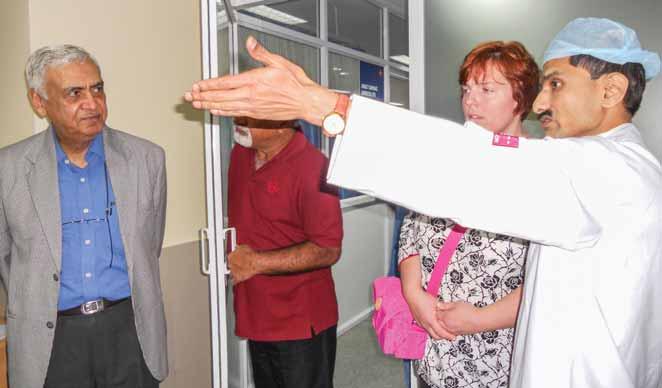
O P Khanna (extreme L), chairman, Needy Heart Foundation, with a visiting dignitary.
the Needy Heart Foundation (NHF) in association with the Manipal Hospital in Bengaluru, with the objective of helping save the lives of needy patients who required heart surgery,” he says
Twenty years into its existence, in August, the NHF had saved the lives of 10,000 people, who required heart surgery and but for his foundation,
wouldn’t have been able to afford one. “But for this service to the community, I want to thank Rotarians in India as well as The Rotary Foundation, who have helped me in my mission.” Besides Indian patients, NHF has facilitated heart operations on patients from 12 countries, including Bangladesh, Pakistan, Nepal and Indonesia.
PRIP Rajendra Saboo, RIPE Shekhar Mehta and PRID Sushil Gupta have referred complicated heart surgeries from various places to the NHF and we have got the operations done successfully.
The seed money for the foundation, which approximately spends `25 to 30 lakh annually to help needy heart patients, came from his own earnings and donations from his immediate family members and relatives staying overseas, with some contribution coming in from a TRF grant and help from his own Rotary club.
Khanna is a graduate from IIT Kharagpur, a technocrat and an expert in machine tools and welding technology, who has set up his own business. “I was on the board of 14 companies and after my heart attack, had taken the pledge that all the sitting fees I get from these corporates
would go to NHF.” It was a win-win for both the companies and he himself; the companies paid the director’s fee directly to NHF, and got tax exemption and he did not have to pay income tax on his earning from these companies, as it directly went to the charity, he explains.
So after putting in his earnings, and his family members’ contributions, he signed MoUs and struck partnerships with other NGOs and hospitals, which enabled surgery for poor patients at a reduced cost, without compromising on quality, with the funds coming from NHF.
Over the years, “even senior Rotary leaders such as PRIP Rajendra Saboo, RIPE Shekhar Mehta and
plastic valve in a child, it cannot expand as the child grows and will become useless after 4–5 years.
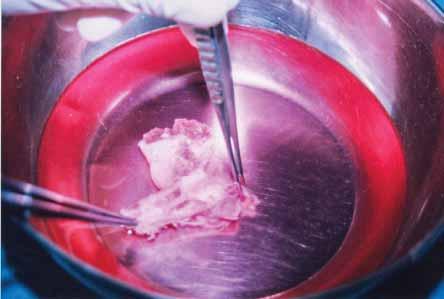
Harvesting of a homograft.
PRID Sushil Gupta have referred complicated heart surgeries from Chandigarh, Delhi, etc, which could not be performed in those places for some reason, to the NHF and we have got the operations done successfully,” says Khanna. The NHF has four other NGOs as well as the Manipal Hospital as partners and “when we were discussing the setting up of NHF prior to 2001, famous heart surgeon Dr Devi Shetty (who now heads the Narayana Hrudayalaya in Bengaluru) was at the Manipal Hospital and though he has left that place, he continues to be one of our advisors.”
In 2006, the NHF launched another ambitious project — setting up a homogenous heart valves bank. An initiative of RC Bangalore Indiranagar, NHF and Manipal Hospital, this bank was set up at the Manipal Hospital, and the total investment in it is nearly `1 crore, says Khanna. For a part of the project, a TRF global grant for
$43,112 was done, with the international partner of the Bangalore club being RC Elkhorn, Wisconsin, US.
Till now over 200 needy children have benefitted through cardiac surgery using human heart valves from this NHF bank. Khanna explains that this heart valve bank is exclusively for children “because if we put an artificial or plastic valve in a child, it cannot expand as the child grows and will become useless after 4–5 years.” Homografts are valve tissues harvested from either brain-dead donors or cadavers within 24 hours of death, but only if the donors are free from infection, malignancy and structural heart diseases. Normally aortic, pulmonary and mitral valves can be harvested, but these valves have to be processed and stored at about -180 degree centigrade. Because it requires such an extremely low temperature to store human heart valves, the storage cost varies between `10,000–15,000 for every valve.
Khanna says that these harvested valves can treat a significant proportion of complex heart diseases in both children and adults.
“In fact, some of the heart problems in children cannot be treated if such homografts are not available. Even where some alternate valves and conduits are available in the market, they are very expensive and beyond the reach of common man.”
The need
Estimates put the number of children born every year in India with heart problems at around 150,000–200,000, “but only about 15,000–20,000 children get some type of surgical treatment. The rest slowly die for want of adequate funds or awareness. So we supply these valves and support the treatment of underprivileged cardiac patients, especially children and women, through our non-profit homograft heart valves bank.
The 200 children, whose hearts have been mended, underwent successful surgery at Manipal, Jayadeva, Narayana Hrudayalaya and other hospitals through this valve bank. At the time of writing — August end — about 50 homografts were available, but they can be stored only for four weeks.
Kiran Zehra
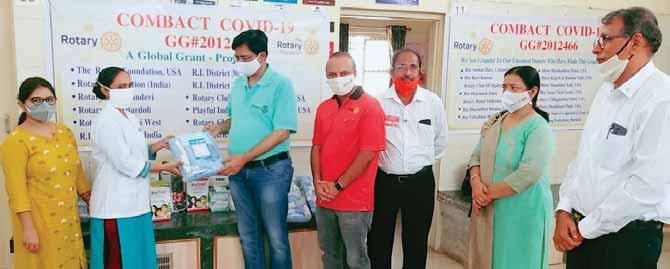
It was about 11 in the night when Parimal Naik, member of RC Gandevi, RID 3060, received a distress call from Dr Pradnesh Parmar. “We had no masks or PPEs and we have to work with Covid patients tomorrow. I know your club will help as it always reaches out in times of need,” recalls Parmar telling Naik. The next morning the rural primary health centre at Gadat where Parmar works, received a care package from the club. “I was right, overnight we received PPEs, masks and sanitisers. I have no words to thank the Rotarians,” he adds.
RC Gandevi has been associated with 35 rural PHCs and child healthcare centres in Gujarat. “One after the other we received calls from these centres for PPEs, masks, sanitisers and thermometers. They came to us because they have faith in us,” says
Naik. During the initial days of the corona outbreak, masks, gloves and sanitisers were sourced locally. “But we were aware of the growing needs, and hence we decided to reach out to our old partners and also file a global grant application,” he adds.
So far, the club has donated Covid-relief material worth $42,000. Without the support of TRF, AIPNO
Most of the Covid warriors are our colleagues, family members, friends and partners and they need support to do their jobs.
Parimal Naik member, RC Gandevi
(Association of Indian Physicians of Northern Ohio, US) and the partnering clubs — RCs Bardoli, Vapi West, RID 3060; Emroy Druid Hills, RID 6900, US; RIDs 3054, 3053 — these donations would not have been possible, says Naik. “Most of the Covid warriors are our colleagues, family members, friends and partners and they need support to do their jobs.Thanks to TRF for sanctioning our grant in time, we were able to support them.”
Around 1,200 N95 masks, 27,000 triple-layered disposable masks, 650 bio trap masks and 8,000 khadi masks, 26,000 gloves, 1,500 PPE kits, 7,000 sanitisers, and 50 infrared thermometers were donated to PHCs, five government and charitable hospitals, policemen and health workers, along with food. “We have mapped out the hospitals’ requirements and are attending to them, one at a time,” he says.


V Muthukumaran


Welcome to the land of the rising sun. Rotary is now present in Arunachal Pradesh, the northeastern state known for its scenic wonder and pristine beauty, through Rotaract Club of Namsai which was chartered on Aug 14 after three decades of wait, since RID 3240 was formed in 1990.
Interestingly, prior to this, the state of Arunachal Pradesh had no presence of Rotary. Which means this Rotaract club has reached this northeastern state, even before a Rotary club could! Some other records were also created in the process — this new club is the fourth in South Asia being chartered by another Rotaract club, RAC Tinsukia; and the district is the second one in the region to achieve this rare feat, a Rotaract club sponsoring another one.



Understandably, DRR Tushar Jalan is on cloud nine. “Our district has entered into the record books of RSAMIDO and we have received all documents from them. With 15 new Rotaractors, the new club was formed in Arunachal under the leadership of charter president Khusbu Sharma. We are confident of growing to a 35–40-member club by the end of June 30, 2021,” he says. RAC Namsai, a community-based club, would not have been possible but for three persons — Jalan, district secretary general Amit More and the redoubtable Khusbu, whose “good rapport with the tribals and district officials made it easy to open a club,” says the DRR.
Being a frontier state, Arunachal shares a long border with China and “due to security concerns and strategic reasons, the government usually does not give permission to NGOs to operate here. Also, the tribals are very sensitive about

sharing space with outsiders,” explains Jalan. But after seeing the brand value of Rotary and the reach of Rotaract among the youth, “the District Commissioner R K Sharma gave us permission to start the club and we are happy to have the blessings of the CM Pema Khandu,” says Khusbu.
She is now working with Jalan to open a Rotary club in this state within a year. Rotary Club of Tinsukia has extended logistics and other support to Jalan in setting up a Rotaract club in Arunachal Pradesh.
However, it took six months to complete all formalities after a special team from District Commissioner’s Office visited the area, interacted with the tribals to get their feedback and made a ‘pros and cons’ study on the feasibility of having such a youth club in this primitive habitat. Following a positive signal from the locals, thanks largely to the goodwill Khusbu enjoys in this remote belt, “we got a no-objection certificate (NOC) from the DC.”
A solemn pledge
During his swearing-in ceremony on July 12, Jalan took a pledge to start Rotaract clubs in Arunachal, Manipur and Mizoram as “my vision is to spread Rotaract into all parts of northeast India during my DRR tenure.” His next stop is Manipur, followed by Mizoram (October) where spadework is on to start Rotaract clubs. Jalan owns Intercone Global, a company which is
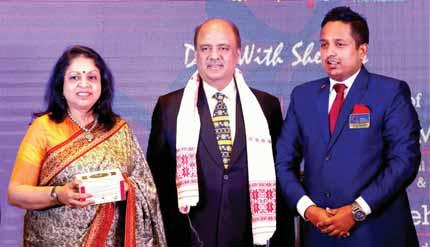
into corporate governance, branding and marketing and has a successful family business in Jalan’s group known for quality tea. “I invariably use my good relationship with top police officers, local officials and entrepreneurs across the northeastern region to promote Rotaract in a big way.”

The District Commissioner R K Sharma gave us permission to start the club and we are happy to have the blessings of the CM Pema Khandu.
Khusbu Sharma Charter president, RAC Namsai
Project Rakshitam with a tagline ‘guarding Covid frontline warriors’ is a huge success as 400 Rotaractors from 30 clubs have so far distributed face shields, hand sanitisers and footoperated sanitiser pumps worth over `2 lakh. The money came through selffunding by Rotaractors.
Project Sanman (to bestow respect) has felicitated over 500 Covid warriors with certificates of appreciation. “We honoured frontline warriors including ambulance drivers, sanitary workers, nurses, bank staff, policemen, garbage pickers and doctors from across our district,” says Jalan.
A mega flood-relief project with a tagline ‘Assam needs you’ has caught the imagination of the youth and the public. “Each year around five million people of Assam and thousands of animals and livestock are affected by the deluge in Brahmaputra River,” he explains. When he took over as DRR, he formed a
partnership with 12 different Rotary, Rotaract clubs and districts to raise money for taking up relief and rehab measures for the flood-affected people. Till August, “we have raised `1.5 lakh to set up flood relief camps at five places in Assam.” Those sheltered in Rotaract camps were given ration kits, food, groceries and essential items such as mattress, coil and utensils, etc for daily living. Around 1,500 families are being accommodated at the flood shelters.
While there are 60 clubs according the RI registry, only 40 are active in RID 3240 with their office-bearers motivating Rotaractors to take up community projects. He started his DRR tenure with a district membership of 878 Rotaractors and the goal is to take that number to over 1,000. Till September, four new clubs were opened and in a historic event, 175 new members were inducted in a single day (Aug 28) at a zoom meet.
“We are confident of opening six more clubs and our strength nearing 1,500 by June 2021, a membership growth of 71 per cent,” he says And hopefully, a new Rotary club in Arunachal Pradesh by this time next year, he says, which will be a defining moment for the 115-year-old service organisation.

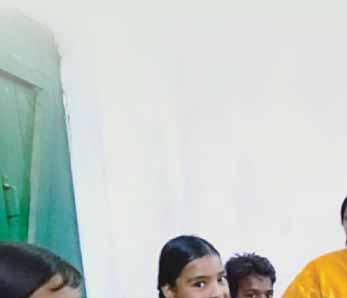
Rasheeda Bhagat
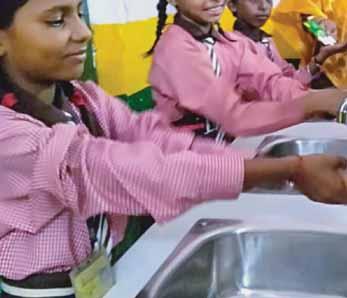

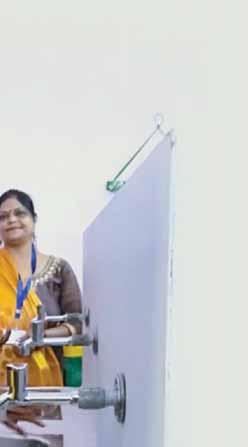
It all began in 2018–19 when the then secretary of the club M P Kandoi suggested to the members of his club, Rotary Club of Gorakhpur, RID 3120, that they adopt a school — Purva Madhyamik Vidyalaya — in Jungle Kauria, in Gorakhpur district of Uttar Pradesh. The Rotarians were passionate about literacy and went about the task of beautifying the school and providing basic facilities like a wash station, toilets and learning material, including smart classes complete with e-learning facilities.
The school beautification got a lot of attention from the local community and one of these who noticed the fine work done by the Rotarians on this school was the Japanese company Toyo Engineering India, engaged in the installation of a fertiliser factory in Gorakhpur. The corporate approached PDG Anoop Agarwal, CSR chair of District 3120, who is also member of this club, to utilise their CSR funds. “They had done some work with Rotary in Mumbai where their headquarters are located and said they were very happy about the partnership and the quality of work done,” says Agarwal.

In three phases, Toyo Engineering India has contributed `1.2 crore to RC Gorakhpur for community projects; and wants to give more!
The company was ready to give CSR funds to the tune of $32,500, but their only condition was that the club should use the money for improving government schools that were close to the fertiliser plant coming up on the periphery of the city, because this would benefit the children of their workers. And the work should be completed by March 31, 2019.
Agarwal added that initially Toyo Engineering wanted to give `20 lakh, but when the funding was worked out more money was required,
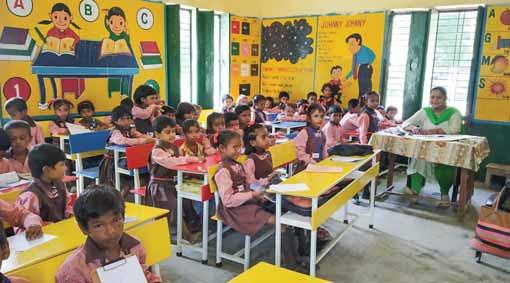
and they agreed to give ` 23 lakh, when told that Rotary also would put in money through a TRF global grant.
The result was a global grant of $60,129, in which Toyo Engineering donated $30,875.
With these funds, the Rotarians began the task of converting 10 schools into Happy Schools by providing 391sets of desk-benches, 14 toilets, 12 smart classes (fully equipped with
e-learning facilities), nine water supply systems, 12 wash stations, 38 fans and nine RO water providers.
The project was started in April 2018, and completed in time by March 31, 2019, just as stipulated by the corporate which was very happy with the work done by the Rotarians. “They would send their representatives to examine the work which was done and not only expressed satisfaction, but their company secretary Suhas Patwardhan

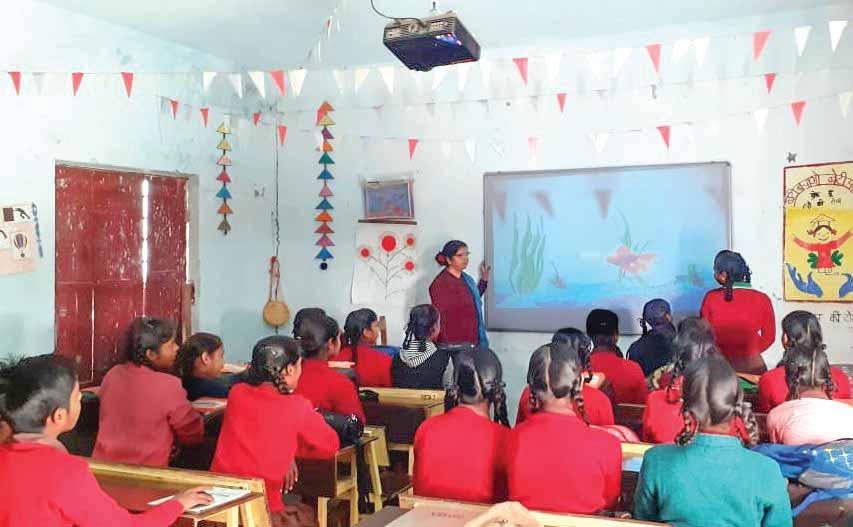
approached us again, saying that we want to share more of our CSR funds. This time tell us how much you want and what are the areas in which you will do work,” smiles Agarwal.
“We suggested that we will uplift more schools and also work in the area of healthcare,” said Kandoi. This time 16 schools were selected; these already had toilets but the education officers said they required other facilities, such as beautification of the campus, setting up of smart classes with e-learning facilities, handwash stations, benches and desks, fans, white boards, etc, which the club agreed to undertake and convert all these

16 schools into Happy Schools. For this project Toyo Engineering contributed $39,875 of the total GG of $58,825.
For the third tranche of its CSR investment, for which the company again chose RC Gorakhpur, it was decided to give some state-of-theart equipment for cancer detection and other diagnostics to the Guru Sri Goraknath Chikitsalaya, a hospital run by a charitable trust.
The approved global grant for this project is $134,028, for which the CSR contribution of Toyo is over $91,650 ( ` 67.8 lakh). An order has been placed for an ultrasound colour
“Toyo Engineering is so happy with the work done by our club that they have once again come forward to give us more CSR funds for the next round of community welfare projects.
M P Kandoi past secretary, RC Gorakhpur
Doppler machine for radiology, costing `40 lakh, and another diagnostic equipment costing `54.75 lakh.
“Due to the Covid pandemic this project has been delayed; the hospital is associated with the Gorakhnath Temple, with which UP Chief Minister Yogi Adityanath has a close connection. We are planning to get this project inaugurated by the CM on Oct 17, the day our club completes its 75th year,” says Agarwal.
The total money spent on this project is a whopping ` 1.7 crore ($252,982), adhering to the guidelines laid down by RIPE Shekhar Mehta that an organisation that has completed 100 years — Rotary came into India 100 years ago with the charter of RC Calcutta — should do “bigger and bolder projects”. In this, the CSR funds by Toyo Engineering total over `1.2 crore.
Adds Kandoi, “Toyo Engineering is so happy with the work done by our club that they have once again come forward to give us more CSR funds for the next round of community welfare projects.”
Rotary Club of Nagpur Downtown, RID 3030, provided a hi-tech, automated RNA/DNA extraction equipment to the Viral Research and Diagnostic Lab (VRDL) at the Indira Gandhi Government Medical College Hospital in Nagpur. The global grant project costing $42,250 was implemented with support from RC Chicago Cosmopolitan, RID 6450, USA and TRF. Persistent Foundation contributed `15 lakh as part of its CSR initiative, and Laxmi Constructions gave `2 lakh.
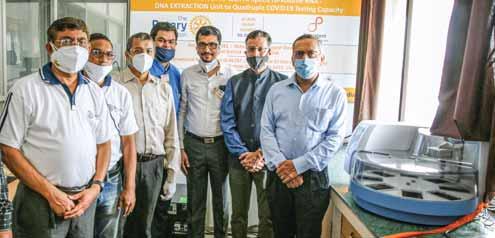
The VRDL is the only facility where tests for Covid-19 are conducted for people from Vidarbha, Chhattisgarh and Madhya Pradesh, said project director Virendra Patrikar, adding that the new device will make the testing capacity at the lab four times faster. “Earlier RNA/DNA extraction was
done manually because of which our PCR systems were underutilised, and we could test only 150 samples a day. Now with the sophisticated gadget, we can perform 500–600 tests,” said Dr Ravindra Khadase, who is associated with the VRDL.
The machine was handed over to the lab by District Collector
Ravindra Thakare in the presence of DG Shabbir Shakir, IGGMH dean Dr Ajay Keoliya and Sameer Benre, chief people’s officer, Persistent Systems, club president Nishikant Kashikar, Sandip Deshpande, Abhijit Deshpande, club secretary Pratiksha Mayee, treasurer Prajakta Mangrulkar and Vinod Athwale.
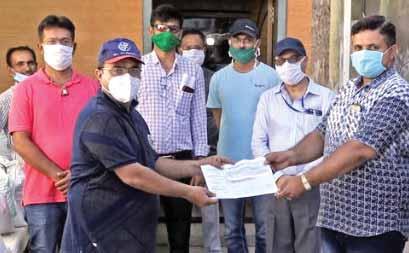
of RC Mandvi, RID 3054, in association with Kutchlok, a local daily, felicitated 35 newspaper delivery boys with certificates for relentlessly delivering newspapers to homes at the crack of dawn, braving the lockdown and Covid pandemic. The club distributed face masks, sanitisers and ration kits to them. “The boys deliver newspapers to nearly 9,450 homes in Mandvi at their own risk, without missing a single day,” said club member Bhavin Ganatra.
The club contributed ` 25,000 to the PM CARES Fund.
The Rotary India Literacy Mission (RILM) aims for total literacy in India by 2025 through its flagship programme TEACH,” said RILM president PRIP Kalyan Banerjee, addressing a zoom meet recently with Union Education Minister Ramesh Pokhriyal Nishank as chief guest. RILM chair Kamal Sanghvi and RIPE Shekhar Mehta anchored the programme where 1,000 participants had logged in. It was also livestreamed on Facebook and YouTube.
“Since its formation in 2014, RILM has made considerable progress in teachers training and adult literacy. The Asha Kiran programme has helped enroll 40,000 children back to formal schooling; 20,000 schools have been converted into Happy Schools and 4,000 libraries have been created in government schools across India,” said Banerjee, and appreciated the central and state governments for their support. “We look forward to more such partnerships until we make
India totally literate,” he added.
In an initiative to make youngsters employable, RILM, in partnership with the Apollo Hospitals group has launched a new ‘medi-skilling’ programme to create a paramedical workforce. “This can provide employment to people in hospitals, pharmacies, diagnostic centres,” said Sanghvi. The three-month course, which would otherwise cost `50,000, is offered at `4,500 a person for those referred by Rotary, and
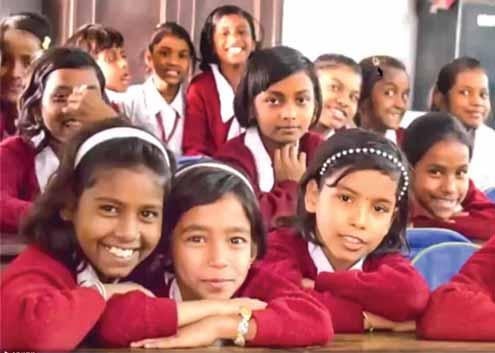
involves 30-day online classes and 60 days of hands-on training in medical institutions. He urged Rotarians to sponsor this course for unemployed youth in their region. Apollo has 28 skilling centres and a centre can be arranged in a specific town for a large group. “I would like to see at least 50,000 candidates trained in a year,” he said.
Sanghvi reiterated the urgent need to train teachers in digital teaching. With the pandemic not giving way, online education has seen a rapid growth in recent days. E-learning is the new normal. Teachers need to sharpen and upgrade their skills to be digitally savvy, he said.
RILM has trained 70,000 teachers in Maharashtra to use e-learning tools and in Delhi 5,000 teachers were undergoing training in a five-day workshop. Sanghvi thanked Rotarians Swati Herkal, RC Wai, RID 3132, and Pran Mehta, RC Delhi Sainik Farms, RID 3011, for coordinating the workshops and said that RILM will support
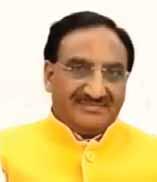
Ramesh
Pokhriyal
Nishank Union Education Minister
similar training programmes nationwide. The goal is to train 500,000 teachers in a month.
The RILM chair urged the Rotarians to create more Happy Schools. “It takes just `300,000–500,000 to transform a school. A child can learn and bloom only if the learning ambience is good.”
RIPE Mehta recalled the landmark MoU signed in the presence of Nishank in July between Rotary and the NCERT to provide electronic learning content for students of classes 1–12. “Four months of content in Hindi and English is ready and has been shared with NCERT director Prof Hrushikesh Senapaty,” he told the minister.
Talking about adult literacy Mehta said that Interactors and Rotaractors have so far transformed one lakh illiterate adults into literate ones. Around 27 crore adults are illiterate in India. Of this, seven crore may be too old to learn. Of the remaining 20 crore, Rotary will make 10 crore adults literate, he said, and requested that the government sign an MoU with Rotary to bring out a five-page booklet that will be easy for youngsters to teach adults who will then write the NIOS exam
to qualify as literate adults.
“Rotary, along with its partners, has 15 lakh volunteers including the Brahmakumaris, Gayatri Parivar, All India Muslim professionals, scouts and guides, Rotarians, Rotaractors, Interactors and RCCs to work for literacy. Together let us work on a mission mode to make India literate by 2025,” he said.
Minister Nishank responded, saying, “your capabilities and strength as an organisation will be supported in every way by the education department.” He added that the literacy programme needs a passionate approach. “It is not the number of people you can bring, it is the number of passionate people you bring that will count and how you put their passion and skills to use to make the programme work.”
He suggested involving students and teachers in promoting literacy. “Create a way to let them help us in this fight against illiteracy by ensuring that no one in any home is illiterate. Also consider including vocational training in your literacy mission.”
He spoke about the new education policy and how it will transform the way youngsters learn.
He appreciated Rotary’s partnership in providing quality online learning content. The ‘one class, one channel’ programme reaches out to children who have no smartphones or internet connection and “it is commendable that we have been able to create an online learning platform for 31 crore students in a record time,” said Nishank.
Hank Sartin

When the sun goes down in Taipei, the shopping begins: The city’s night markets come to life on sidewalks and streets, where vendors set up stalls for a night of buying, selling, eating, and drinking. Some streets are lined with awnings that unfurl every evening. When you’re in Taipei for the 2021 Rotary International Convention, June, 12–16 make time to experience this lively slice of Taipei’s everyday life. Or should we say everynight life?
The Shilin Night Market has been in operation for more than a century and is perhaps the city’s most famous (and busiest). Visit the nearby National Palace Museum and then head to the market, which gets started in the late afternoon. There are outdoor food stalls at the Shilin market near the Jiantan metro station; other goods are on offer near Yangming Plaza. Another famous destination is the Linjiang Street Night Market — also known as the Tonghua Street Night Market — which despite its location near the Taipei 101 tower is less frequented by tourists. All the markets are less crowded and touristy on weeknights than on weekends.
Have a light dinner (or none at all) before you visit a night market, so that you’ll have room to sample the delights of Taiwanese streetfood. Try spring onion pancakes, pan-fried dumplings, and grilled sausages, of which there is an overwhelming variety. Stinky tofu lives up to its name, but deep-fried and served with garlic sauce, it’s delicious. Or you might decide to slurp up noodles with a choice of sauces.
Learn more and register at convention.rotary.org.
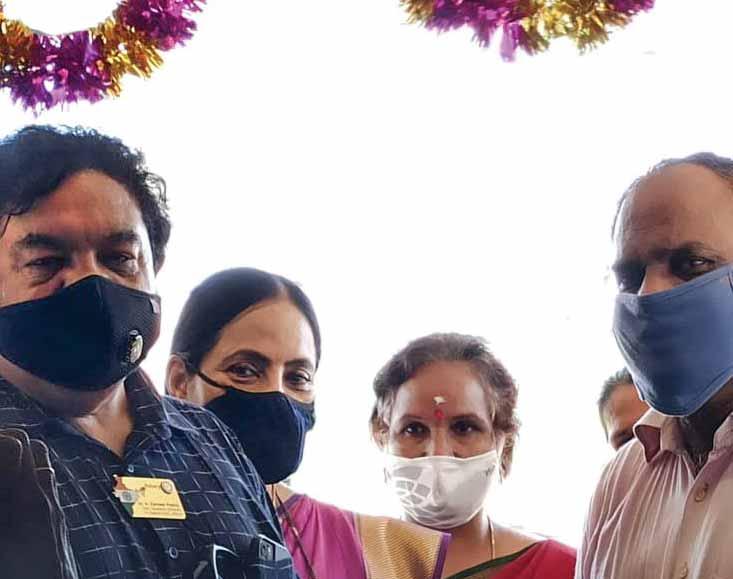
Around December 2018, as S Hemalatha was getting ready to become president of the Rotary Club of Tiruchirapalli Shakthi, an all-women’s club with 41 members, like all new incoming leaders she too was searching for an iconic project her club could do during her year — 2019–20.
“It was at this time that one of my club members, Sunitha Reddy, asked me if I would be interested in giving shape to a project designed to help transgender children get housing, dignity, education, and through all this, a decent place in the community.
That project was building a hostel for transgender or gender nonconforming (GNC) children,” she recalls.
As it happened, Sunitha’s husband, N R K Babu, a retired major general from the Indian Army, was, and continues to be, the CEO of a high school run by a charitable trust (Swami Sivananda Vidya Samiti) in the city — the Sri Sivananda Balalaya, Tiruchi. The school has 450 children, including 100 special children, but only one of these is a transgender or GNC child.
Hemalatha immediately warmed to the idea and decided to make it the club project during her year. With a district grant of ` 8 lakh, ` 1 lakh
donated by the club members and one of them, Sinduja, an architect, contributing her professional services worth `1 lakh totally free, the bhoomi pooja for the project worth `10 lakh was done on July 27, 2019. In the last week of August the hostel was inaugurated by PDG Zameer Pasha with Maj Gen Babu, current club president Valarmathi, secretary Priya Vanaraj and Hemalatha participating.
Sad plight of GNC children
Hemalatha, who runs a business in printing and corporate gifting, said that while she was researching this project, she found the plight of such
transgender children being really pathetic. “In so many cases, because of the social stigma, the parents reject these children, by simply throwing them out of the house.” At a vulnerable age, the children fall into the evil hands of criminal gangs and are sucked into a life of crime and violence. Now, of course, the government has amended the law to stipulate that parents who throw out their children because they are GNC are liable for imprisonment.
The land for the hostel, a twostoreyed building which can accommodate 38 children on bunk-style beds, was donated to the club by the school, which is also committed to admitting these children and ensuring they get a decent education.
Hemalatha said that at present due to the Covid pandemic the school is
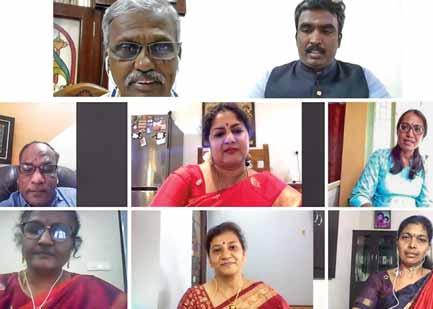
Above:
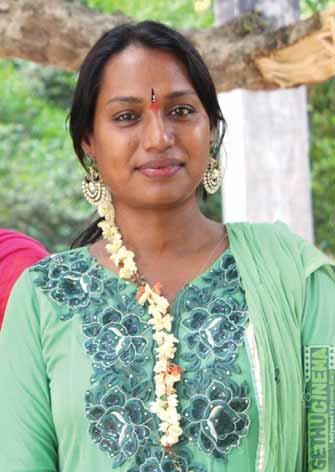
shut so they haven’t yet found inmates for the spanking new hostel. She is happy to add that there are parents in the larger community who are willing to take care of their GNC children, support them and give them a good education.
Her club organised over Zoom a well-attended Transgender Awareness programme in mid-August, presided over by RID 3000 DG A L Chokkalingam. “DG Chokkalingam is very supportive of this project that we have titled Sivasakthi and for this year, has appointed me district chair for the transgender welfare and empowerment programme,” she says, adding that the core committee of this project has the local government child welfare officer as its member.”
On how the club will find 38-odd trans or GNC children, she says that this officer will help identify such children and the Rotarians will also spread awareness on social media. “As this is a residential facility, anybody from anywhere in India can refer to us a trans or GNC child who has nowhere to go, and we will give her shelter in this hostel and an education in this school.” For those who cannot afford
to pay the school fees, she adds, the club members will find sponsors. She added that the club was also keen to help such young adults by organising for them training in tailoring and other livelihood enhancing skills. Additionally, this project also hopes to spread awareness about the need to treat GNC children as normal children, and give them a decent education. Giving an example of Kalki Subramaniam, a transgender rights activist, actress and writer, who was the chief guest at their virtual meet, she said Kalki was born a boy, and later had a sex change operation. “Because her parents did not throw her out, supported her totally and gave her an education, she was able to become a useful
member of society and start her own NGO for supporting such children.”
Addressing the meet, Kalki said, “What is most important for these children is a non-discriminatory environment where they can live with dignity.” Sharing her personal experience, she stressed the need to work hard to integrate transgender kids into their biological families. For this a wellthought-out awareness programme for parents and other family members, teachers, media, and the medical and judicial fraternity is essential, she said. Unless this kind of a support system is developed for GNC kids, they will not be able to have a decent future.

In his opening remarks DG Chokkalingam appreciated the efforts
As this is a residential facility, anybody from anywhere in India can refer to us a trans or GNC child, and we will give her shelter in this hostel and an education in this school.
S Hemalatha, District chair Transgender welfare and empowerment programme

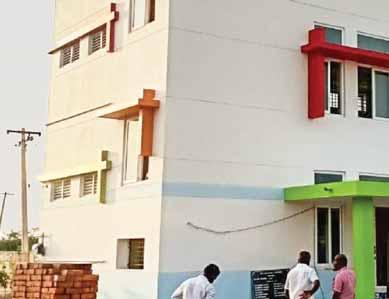
of the chair of this project Hemalatha, co-chair Vijayashree and coordinator Kavitha in spreading greater awareness about the problems faced by transgenders and enhancing the prospects of a better life for them. In a well-attended virtual meet, about 300 Rotarians participated and the DG was hopeful that they would go away sensitised to the plight of transgenders and help them.
Major General Babu spoke on how this hostel would give shelter to GNC children. This hostel “will not only accommodate them, it will also accept them, nurture them, and most importantly, make them feel normal and accepted by all other children. It will also be an avenue for parents who wish to abandon their GNC children due to societal stigma.”

Hostel for transgender or GNC children.

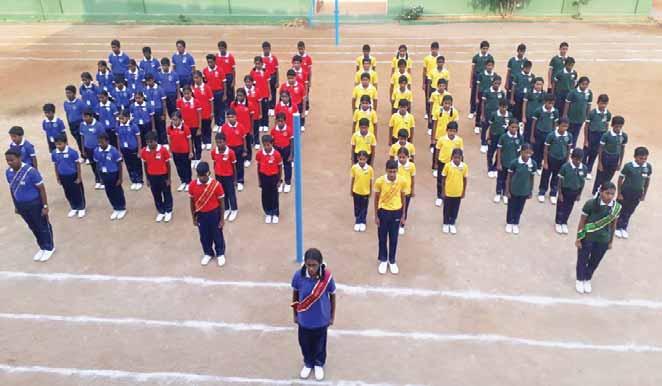
Dr Kavitha Fenn, a psychiatrist and Rotarian, gave out a list of five points to people to remember when dealing with a transgender child. Learn facts about why they are different and then teach others. Words can hurt and kill too. Therefore, teach people to respect GNC children. Be inclusive: Teach tolerance to your own children. Parents
Because her parents did not throw her out, supported her totally and gave her an education, she was able to become a useful member of society and start her own NGO for supporting such children.
of transgender persons go through pain during their child’s transition. Don’t isolate such children. Invite them to birthday parties and other social events. This will help prevent runaways from home. Protest against discrimination. Lend your voice in support. Just sitting at home and expressing sympathy is useless. Show your sympathy and support through your action and help in every possible way.
Be proactive and spread awareness on the need to combat trans phobia.
PDG M Muruganandam, district trainer, quoted the existence and acceptance of transgenders from our ancient epics, such as the Mahabharata. He quoted the story of Shikhandi, who is male but was born female. She was the daughter of King Draupada and elder sister of Draupadi who married the Pandava brothers. Although she was born a female, Shikhandi was raised as
a man, being taught warfare and statecraft. When Shikhandi changes her sex, she becomes Shikhandi, the warrior, said the PDG and urged Rotarians to spread empathy for transgenders. He congratulated women Rotarians for taking a leading role in the advocacy and action for better opportunities for the third gender.
As a token of Rotary’s immediate support for the cause of transgenders, there was good demand for buying the paintings done by transgenders which were auctioned by Kalki Subramaniam.
But, added Hemalatha, “the real success of the programme was evident, when after our Zoom meet, fellow Rotarians called the organisers and offered to support transgenders by employing them in their organisations. With such support from Rotarians, RID 3000 is sure to empower more and more trans people to come forward fearlessly and say: This is who I am. We are hopeful of igniting that spark and be changemakers.”
Kiran Zehra
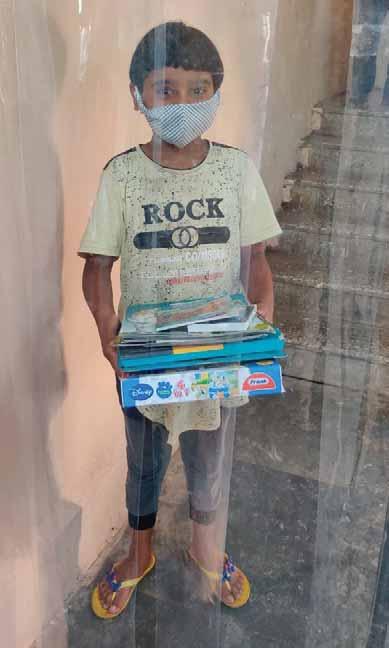
From behind a plastic seperator at the Rotary Covid Care Centre in Ahmednagar, Maharashtra, Raziya blows kisses to her seven-year-old daughter Pakiza Salim while speaking to her on a mobile phone. After testing Covid positive, the child was brought to this facility set up by five Rotary clubs — Ahmednagar, Ahmednagar Midtown, Ahmednagar Priyadarshini, Ahmednagar Central and Ahmednagar Integrity — of RID 3132. Pakiza happily shows off her toys and games to her sobbing mother. The clubs have thoughtfully included recreational items for children to play with. Pakiza recovered since then and was discharged. The centre has already treated over 1,000 asymptomatic Covid patients, including 90 children, in a month. Kshitij Zaware, president, RC Ahmednagar Midtown says, “it cost us `10 lakh to set up the facility in line with the WHO and government norms.” The local hospitals refer patients to this centre and no fee is charged for the poor. To boost the morale of patients “we make them take an oath every morning: I am fighting corona, I will win and make my health better,” he adds.
Dr Rajukar, club member and centre-incharge says, “asymptomatic patients need not be hospitalised. Centres like these save precious hospital beds for serious cases.” Two oxygen cylinders are kept ready and in case of an emergency, “we will shift the patient to a hospital with the help of a standby ambulance.” Two doctors and four nurses work in shifts here.
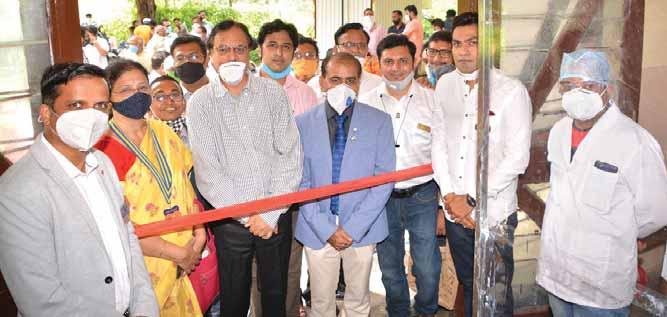
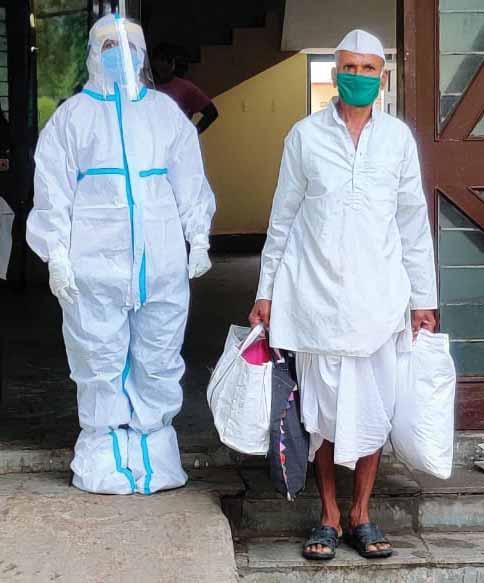
This 150-bed centre, set up with help from the Ahmednagar Municipal Corporation at the Government Polytechnic College boys hostel, has a range of facilities including staff quarters, pulse oximeters, CCTVs, a laundry unit and a biomedical waste management block. All the doctors and medical staff are provided PPE kits.
For 76-year-old Kharbas, who was recently discharged, the most interesting thing here was his bedside hot water kettle. “Bahut badhiya hai! Bus ek button dabaney se pani garam ho jata hai (It’s excellent; press a button and the water is heated),” he quips, adding that the club members are doing “bhagwan ka kaam (God’s work). At a time when our family members can’t be with us, the Rotarians are making sure we get hot food and comfortable sleep. I thank them with all my heart.”
Fresh, hot nutrition-rich food is served to the patients from a kitchen, set up at a cost of `15 lakh at the centre. They are also given ayurvedic medicines. All the clubs pitch in with funds and grocery to keep the kitchen running, says Zaware. Recently the centre celebrated Ganesh Chaturthi and Independence Day with the patients.
Proving yet again that Rotarians are indeed ‘people of action’ and refuse to be cowed down by the worst of calamities, and adhering to two presidential themes — “Rotary connects the World” and “Rotary Opens Opportunities”, Rotarians of the Rotary Club of Secunderabad West, RID 3150, and Rotaract Club of BITS Pilani, Hyderabad Campus, have launched a unique project.
As the corona pandemic spread its tentacles across the world, a bunch of tribal students from remote rural areas were given a virtual treat — pun intended — through a career guidance programme titled Gurukul to provide skill development training, mentorship and career guidance to tribal college students.
In a power-packed three-hour career conclave on future technologies, knowledge of which is bound to help young graduates get jobs in top tech companies, senior personnel from corporates such as Facebook, Google, IBM, TCS, Pepsico, Tech Mahindra, etc interacted with the students on the immense possibilities that the ongoing developments in the cyber world offer, said RC Secunderabad West president S Divaker Reddy.
He said the idea of the conclave was to give access to students from tribal and rural areas to the top
leadership from such global majors. Students from Telangana Tribal Welfare Rural Degree College, “who hail from the remotest parts of Telangana state had the first-of-its-kind opportunity to listen to eight leaders from such top tech companies and interact with them in Q&A sessions. Most of the students are first generation school goers hailing from the tribal areas of the state, and all of them have dreams to make it big in life.”
In conversation with Archana Vadala, head of recruiting, Asia Pacific, Facebook, past president of the club Kamal Jain quizzed her about the essential qualities that candidates require and recruiters like her look for, while interviewing candidates for organisations such as Facebook.
She said it was important for young graduates to define their priorities right at the outset and decide what they were
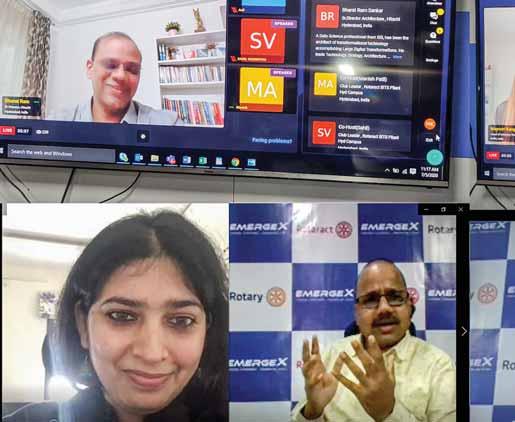
most passionate about. “The initial part of your career is so important, as also doing what you are passionate about.”
All recruiters in the sphere of technology will of course look for the core skills required for the specific job, “but a different set of skills are also important, and communication is a big part of those skills. They will look at how you articulate, your listening skills as also your self-confidence.”
As “we work in a global environment, cross-functional collaboration is also a big part of what employers look for. Companies also look at creativity and innovation, the ideas you bring, and your problem-solving capacity.”
As so many new technologies emerge on the horizon, they also bring with them their special set of new problems. “Companies are looking for people who can solve such problems and not complain about them,” Archana added.
Mayoori Kango, head of industry at Google, India, urged the participants
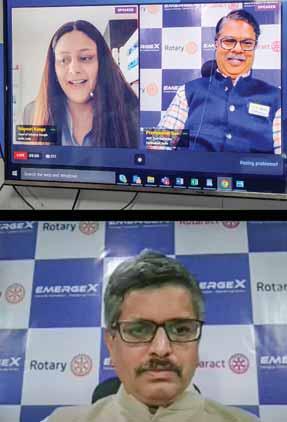
to follow their passion in order to succeed in life. She spoke about her earlier years, where she had acted in a few Bollywood films before going to the US to pursue an MBA and then began her career in the corporate world.
Speaking on cyber security, Jaideep Lakhane, deputy director, Digital Experience, Pepsico, asked an interesting question: How many locks do we all deal with in our daily lives… that of our home, our bedroom, cupboard, car, office, etc. “We all deal with locks; 5, 10 or more every day. But do we have a single key for all of them? No.” Similarly, every day we deal with different user IDs for our bank accounts, computer login and other applications, but cannot, and should not, have a single password for them. “Of course, it would be so nice to have just one password; but the moment you do that, you are prone to be attacked and intruded upon, and you might lose your identity to somebody else. That is why the next step of authentication was started.”
Speaking on the future of technology, Bharat Ram, senior director, Architecture, Hitachi Vantara, a data science professional, spoke about the importance of building cutting edge solutions, and how, using this kind of technology, some of the best smart cities of India, including Hyderabad, were built. Also it was important to keep abreast of emerging technologies; 52 per cent of Fortune 500 companies have disappeared because they could not do so and go digital. He gave the example of Blockbuster Video, an US-based provider of home movies and video game rental services. Netflix was nowhere on the horizon; but today the former had disappeared and the latter had thrived.
It would be nice to have just one password; but the moment you do that, you are prone to be attacked and intruded upon,and you might lose your identity tosomebody else.
On the questions the students from the tribal institution had for the speakers, past president of the club and district trainer Anil Kumar said, “interestingly, most of them were related to campus placement and recruitment. Among the 350 participants, about 80 were from the tribal college and others were from farflung areas such as Singapore, Mumbai, Delhi and of course smaller towns and villages of Telangana state. “The latter were anxious to know if these corporates would come to institutions like theirs for campus placement.”
During the conclave, the students were very keen on having such career counselling and mentoring sessions on an ongoing basis. As a result of that the club has decided to create a group of mentors — about 10 of them from the club’s membership of 45 — in different areas such as law, medicine, finance engineering, technology, etc. “We will set up video linkage and connectivity with this college and have a mentoring session with the students every week on different topics and vocations,” said Kumar.
Another positive outcome of this conclave was the demand that the club organise such a virtual meet every month. “And we have decided to do this every month. This one was done in July; in August we had a conclave on robotics and the art of making presentations. In September, it was on the power of social media and in October it will focus on cloud technology and decoding campus placement.
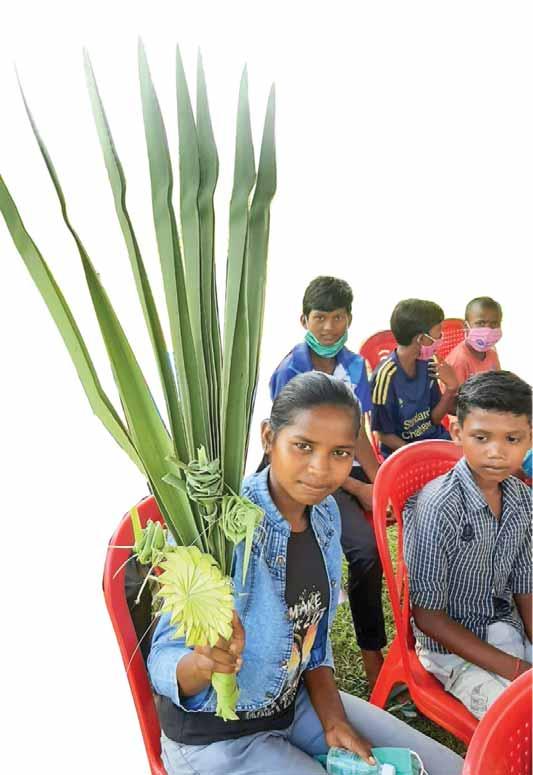
Kiran Zehra
Plant, preserve, manage forests, and measure the benefits they provide. This way we can build a more sustainable future.”
With these words RIPE Shekhar Mehta launched Vasundhara, RID 3250’s initiative to plant 1.2 million trees over a zoom meeting, dedicating one tree for every Rotarian worldwide. This project is the brainchild of RC Jamshedpur West. As the club has been working with tribal communities in rural Jharkhand for over 12 years it was easy for it to approach the village panchayats for the plantation drive.
When you are serving mother earth it doesn’t make a difference if you are a Rotarian, a Lion or a Roundtabler.
Ravi
Shankar Dakoju Past president RC Bangalore Orchards, RID 3190
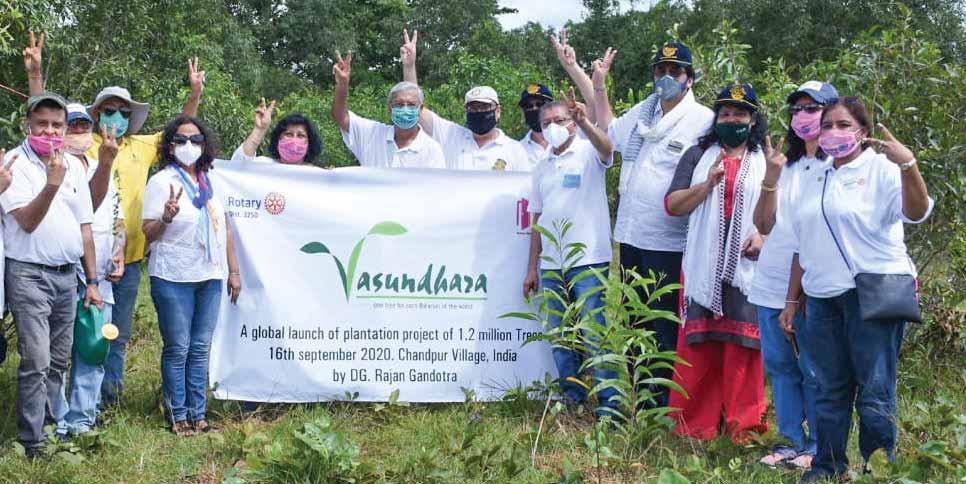
DG Rajan Gandotra explained that the initiative is well-planned and also covers the urban areas of Jharkhand. He congratulated Dr Amit Mukherjee, Alpana Shah and Amithab Bakshi for their efforts in planning the drive in three phases — mass rural plantation, greet with a tree and urban plantation drive. “Our primary goal is to establish beneficial resources for the village and urban lands which will in turn support biodiversity and provide valuable ecosystem services.”
RID Kamal Sanghvi congratulated his home district for conceptualising “a great
project” and encouraged RID Francessco Arezzo (US), PRIDs Geetha Manek (Kenya), Raffy Garcia III (Philippines), present at the meet, to replicate it in their zones. He appreciated the host club president Anjani Nidhi and his spouse Banashree for facilitating the partnership with Grow-Trees.com.
PRIP Gary Huang and Trustee Gulam Vahanvaty thanked the district for planting a sapling in their names. Grow-trees. com will monitor the entire programme and remunerate villagers engaged in the activity, while Rotary will identify large patches
Our primary goal is to establish beneficial resources for the village and urban lands which will in turn support biodiversity and provide valuable ecosystem services.
Rajan Gandotra District Governor, RID 3250
of land through village and civic bodies. “We have plans to green the Sundarbans as it has been devastated by the recent cyclone,” said Nidhi.
Gandotra informed that 50,000 trees have been planted in Chandpur, Murgaghutu and Harisundarpur villages near Jamshedpur and a partnership is under way with Tata
Steel to green the cities of Jharkhand.
Ravishankar Dakoju, past president of RC Bangalore Orchards, RID 3190, said, “1.2 million is doable. The easiest way to achieve this is to join forces with other organisations. When you are serving mother earth it doesn’t make a difference if you are a Rotarian, a Lion or a Roundtabler.”














He was gifted with this rare, fluent and mellifluous voice,” said Satyajit Ray about Kishore Kumar. “As a singer of popular songs, he had no equal.”
“Just hear the word Kishore and you smile,” Amitabh Bachchan said. “That’s because his name symbolised entertainment.”
Ray and Bachchan were two of the millions in India and overseas charmed by Kishore Kumar, whose creative brilliance enriched cinema in many ways. He sang more than 2,600 Hindi film songs, including some of Bollywood’s most loveable gems, in his eventfilled 40-year career. He gave Bollywood music a new idiom, introduced the art of yodelling and performed rather than sang songs. His versatility was amazing (he variously donned the hats of singer, composer, actor, lyricist, editor and director).
But music was his first passion. “Acting is fake, music comes from the heart,” he remarked famously.
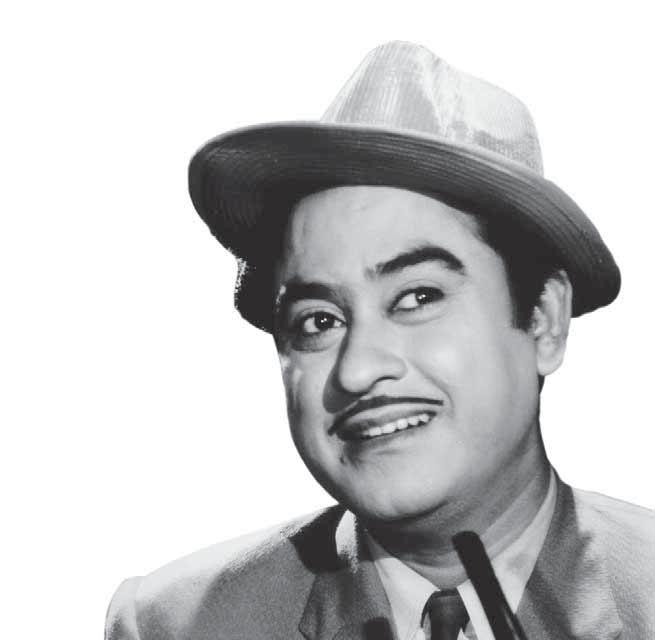
He was an unschooled singer, but his magic did not derive from training or technique. It was all heart, all mood. Lata Mangeshkar, who described Kishore as her favourite Bollywood singer, remarked “it’s God who guided his music.” Manna Dey once said “Kishore had the best voice of all playback singers. He made singing sound so effortless. He had no classical training but could surpass me in a song because of his wonderful musical instinct and natural singing flair.”
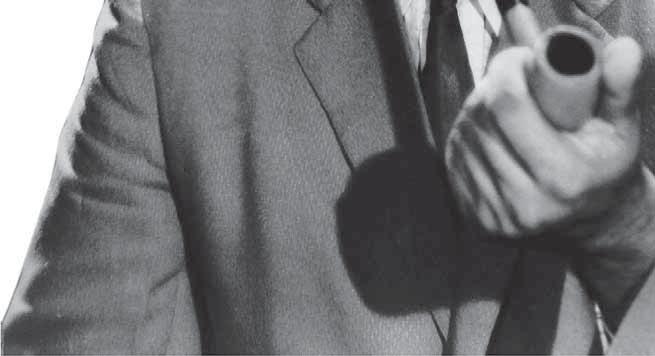

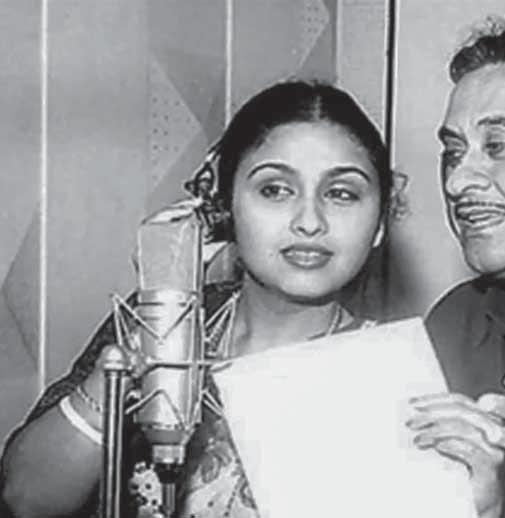
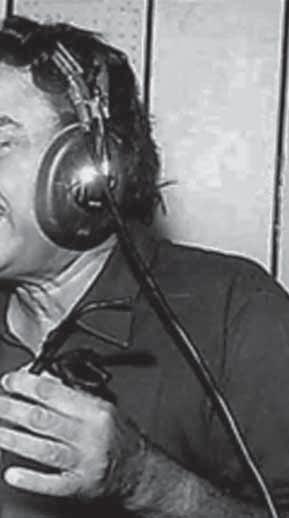
It is said that Kishore’s voice combined the strength, depth and richness of the male voice with the sweetness of the female voice. The sweetness is particularly noticeable in songs of pain and melancholy — such as Mera jeevan kora kagaz (from Kora Kagaz); Koi humdum na raha (Jhumroo); Zindagi ke safar mein guzar jaate hain (Aap ki Kasam); Dukhi man mere (Funtoosh); Meri bheegi bheegi si (Anamika).
Lyricist Javed Akthar, an encyclopaedia on Hindi cinema, says that whenever Kishore sang a duet with a male or female singer, he simply stole the limelight. If there were two separate versions of a song, it was Kishore’s that clicked. Take that heart-wrenching song of disillusionment in love from the 1976 Mehbooba — Mere naina sawan bhadon — composed by R D Burman. Lata and Kishore sang the song separately at different stages of the movie. Lata was
melodious as always; but Kishore’s rendition was emotionally searing, you felt the pain and despair yourself.
Kishore had a passion for singing even as a kid and idolised K L Saigal. But he had a shrill, rasping voice. When Kishore was 10 years old, he once ran toward the kitchen where his mother was chopping vegetables — and ran headlong into the chopper. One of his toes got severed and the pain was excruciating. Medical facilities those days were meagre.
“Kishore cried non-stop for several
Acting is fake, music comes from the heart.
– Kishore Kumar
hours a day for a whole month,” says brother Ashok Kumar. “The non-stop crying cleared his throat, and his voice became pleasant,” he adds.
Kishore moved to Bombay at the age of 18 to meet Saigal (he never did) and sing for movies. His film career can be divided into two phases. The first phase was a 23-year struggle of ups and downs till Aradhana in 1969; the second phase, from Aradhana till Kishore’s death in 1987, was a journey of glory. He sang a few hundred Hindi film songs during the first phase, more than 2,000 in the second.
The first phase contained some luminous moments such as wonderful songs for Dev Anand composed by S D Burman for the films Munimji (Jeevan ke safar me rahi), Paying Guest (Mana janab ne pukara nahin) and Nao do gyarah (Hum hain rahi pyar ke) which conveyed the joie de vivre
























of Dev Anand’s personality. Dev generously acknowledged the debt he owed Kishore for creating his flamboyant image.
One of Kishore’s most pleasing triumphs during this phase was the 1958 Chalti ka naam gaadi, starring Madhubala, Kishore himself and his two brothers Ashok and Anoop. This superhit film with several chartbuster songs composed by S D Burman, was arguably Hindi cinema’s bestloved comic entertainer. The three brothers were the producers.
The 1958 Dilli ka thug exemplified Kishore’s versatility as singer. The film presented the zany Kishore-Asha duet C-a-t cat, cat mane billi which was a sensation, but also the soul-stirring, exquisite Kishore-Lata romantic melody Yeh raaten, yeh mausam, nadi ka kinara.
But such successes were sporadic, and Kishore was a frustrated man during the late 1960s. He hadn’t hit the top as singer despite some brilliant songs and display of ample proof of his talent. As
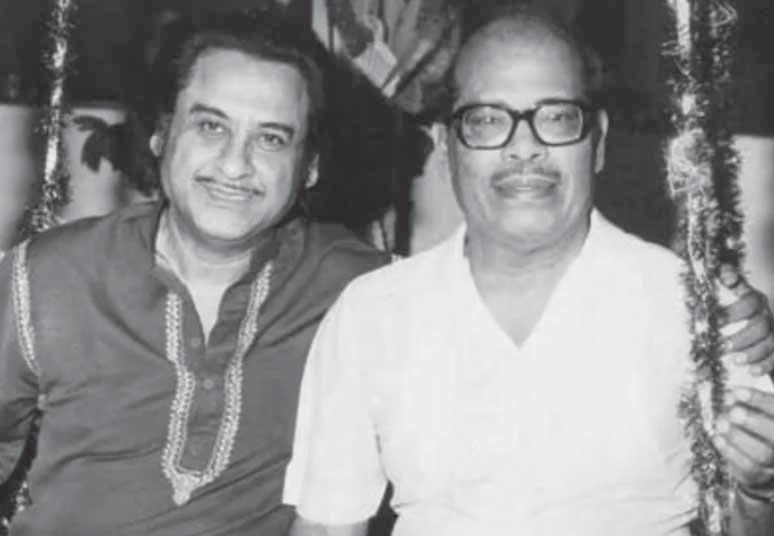
an actor, he was no longer young enough to be a hero. He wanted to give up cinema and return home to his beloved Khandwa in Madhya Pradesh, but Ashok Kumar dissuaded him and urged him to stay and focus on playback singing.
1969, the watershed year Then came Aradhana in 1969. The film not only unleashed the Rajesh Khanna phenomenon
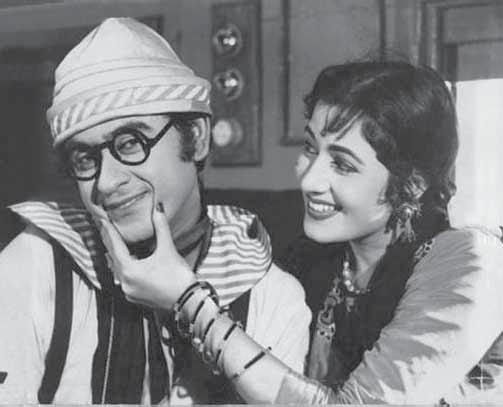
but let loose a Kishore tsunami that swept the music world. Even a monumental talent like Mohammed Rafi, Bollywood’s voice of the 1960s and 1970s, was marginalised, and never regained his earlier status. How did this happen?
Composer S D Burman was very ill during the making of Aradhana, and his son Pancham (R D Burman), a firm believer in Kishore’s awesome talent, took over. He promptly replaced Rafi with Kishore for two songs that were sheer dynamite — Mere sapnon ki rani, where Rajesh in a jeep serenades Sharmila Tagore on a moving train; and Roop tera mastana, a fiery sensual song of the lead pair before a fire in a cabin, taking shelter from a rainstorm. That song went on to redefine sensuality and raw desire in Hindi cinema.
Both Rajesh Khanna and Kishore were on a roll after Aradhana. Rajesh recorded 15 consecutive hit films between 1969 and 1972, a feat unmatched to this day. Kishore sang 245
songs for him. “Take Kishore’s songs away from Rajesh and he is no more a superstar,” it used to be said. R D Burman’s wizardry fuelled the success of both the superstars.
The Rajesh mania waned after the mid-1970s, and the “angry young man”, Amitabh Bachchan, became the new superstar. But Kishore’s triumphant march continued — he gave voice to Amitabh in 131 songs including numerous hits in films such as Amar Akbar Anthony, Don, Muqaddar Ka Sikandar, Khoon Pasina, Kasme Vaade, etc.
Kishore’s voice ruled Bollywood till his death in 1987, ensuring his dominance over an industry that had badly misjudged him earlier.
He received eight Filmfare Awards as best playback singer (all of them between 1969 and
He was gifted with this rare, fluent and mellifluous voice. As a singer of popular songs, he had no equal.
– Film director Satyajit Ray
1987) — a record. Mohammad Rafi won only six.
Here’s a short list of my favourite Kishore songs after Aradhana:
• Yeh shaam mastani — Kati Patang, 1971
• Chingari koi bhadke — Amar Prem, 1971
• O meri sharmilee — Sharmilee, 1971
• Tere mere milan ki yeh raina — Abhimaan, 1972
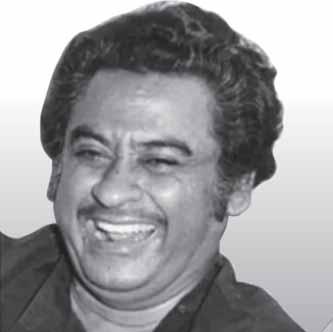
(Clockwise from top L) Kishore Kumar with Manna Dey, R D Burman and Madhubala.
• Musafir hoon yaaron — Parichay, 1972
• Is mod se jaate hain — Aandhi, 1975
• O maajhi re — Khushboo, 1975.
• Kabhi alvida na kehna — Chalte Chalte, 1976
• Hamey tumse pyar kitna — Kudrat, 1981
Those who influenced him Kishore was fascinated early in life by the Israeli singer and entertainer Chaim Topol, and reportedly saw his movie Fiddler on the Roof more than a hundred times.
In 1983 in London, he learnt from a newspaper advertisement that Fiddler on the Roof was being staged that day, and was thrilled. He attended four consecutive shows, also went backstage and presented Topol with a set of his
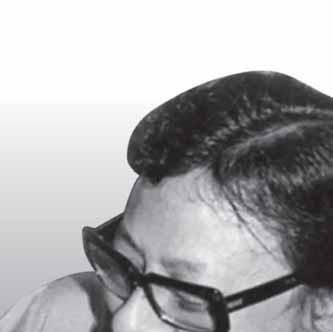

























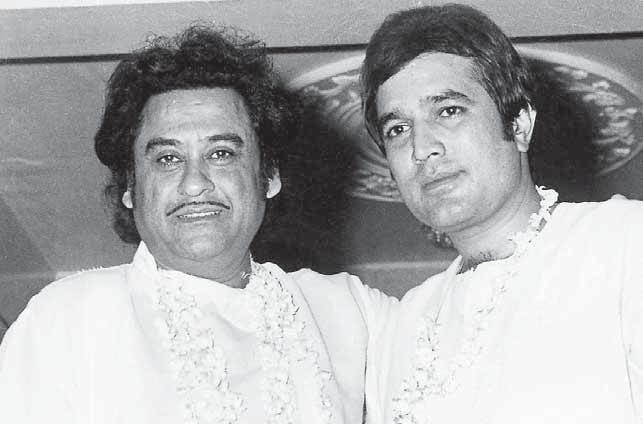
audio cassettes. The Israeli star in turn gave Kishore a copy of his autobiography, Topol by Topol. “No one can act like him!” raved Kishore.
Kishore was the first yodeller of Hindi cinema. S D Burman had advised him to develop his own style of music. He listened to some Austrian records of his brother Anoop Kumar, researched singers from the US, Australia and New Zealand, and made yodelling a part of his repertoire. “I encouraged
his yodelling,” said Dev Anand. “It sounded like the cry of a solitary voice in the loneliness of the hills, a cry for romance.”
He didn’t smoke, drink or socialise, but was a big eater. His niece Preeti Ganguly (Ashok Kumar’s daughter) discloses that he was hugely fond of mangshor jhol, a Bengali mutton curry dish. He also loved gobi (cauliflower). He would say, “Cover me with mounds of fried gobi. I’ll lie under them and keep eating the gobi.”
Kishore had the best voice, and made singing sound so effortless. With no classical training, he could surpass me because of his wonderful musical instinct and natural singing flair.
– Singer Manna Dey
Personal life
Kishore married four times; to Ruma Guha Thakurtha (1950–58), Madhubala (1960–68), Yogeeta Bali (1976–78) and Leena Chandavarkar (1981–87). He referred to his four wives as “bandaris” because all of them lived in Bandra!
He was a maverick, an iconoclast, a loner. The stories of his eccentricities are legend. A signboard outside his door said ‘Beware of Kishore’. He was fond of horror films and had a collection of hundreds of video cassettes of this genre. He described the trees in his garden as his only friends, gave them names, and talked to them. He was particular about being paid promptly. On one occasion, a producer paid him only half the agreed amount. Kishore appeared on the sets with one side of his head and face shaven. He said “Adha fee, adha make-up.”
Despite his reputation for being tightfisted, Kishore helped out Satyajit Ray with
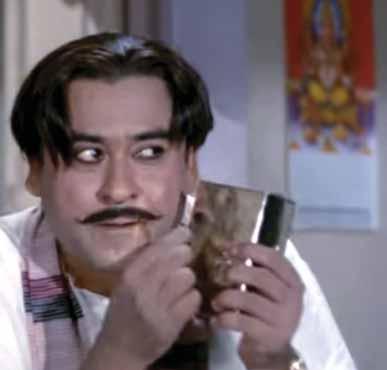
I encouraged his yodelling; it sounded like the cry of a solitary voice in the loneliness of the hills, a cry for romance.
– Actor Dev Anand
a loan when his 1955 epic Pather Panchali got stalled at a critical time, and sang a song free of charge for Ray’s 1964 movie Charulata When the maestro asked about the fee payable, the singer just touched Ray’s feet. Kishore also sang three songs for Ray’s 1984 film Ghare Baire, again without a fee.
During the Emergency years, Kishore reacted with a blunt “No” when asked to promote a government programme. Result: All
India Radio banned his songs. He also suffered several IT raids, and had to conduct a number of stage shows to pay his tax dues. He said in an interview that one day, a few people knocked on his door saying “we are from the IT department. Your dogs are chasing us.” Kishore responded “don’t worry. I have given my dogs strict instructions not to bite income tax officers.”
Kishore often played pranks during dialogue rehearsals. He would tell Meena Kumari what
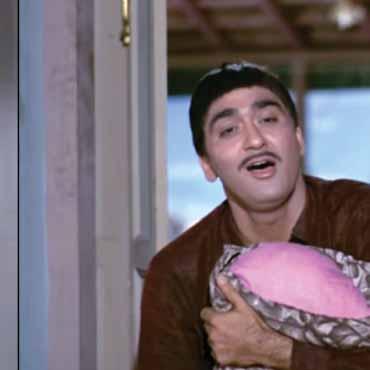
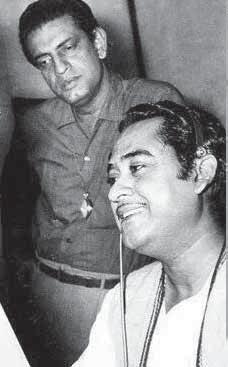
he was supposed to tell Bina Rai in another film. He enjoyed the look of bewilderment on the heroine’s face and would burst into laughter.
Kishore passed away in 1987, when he was just 58. He died on Ashok Kumar’s birthday, and the veteran actor never celebrated his birthday again.
Kishore’s reputation and mystique have grown massively after his death, and he lives on, just like his famous song
in Chalte Chalte: Kabhi alvida na kehna.
Editor’s pick:
• Mere Mehboob qayamat hogi
• Yeh raaten yeh mausam nadi ka kinara
• Neele neele ambar par, chand jab aaye
• Haal kaisa hei janab ka.
The writer is a senior journalist and member of RC Madras South. Designed by Krishnapratheesh












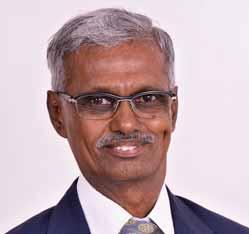
All the 130 clubs spread across the eight revenue districts of RID 3000 are busy implementing Super 66, a signature project for doing six specific programmes in six months at club and regional levels. From August to February (excluding January), a slew of projects such as rainwater harvesting, one-day RYLA conferences, distributing health kits to lactating mothers, vocational training and awards, medical camps and installation of Rotary boards at public places are being taken up on first Saturdays by the clubs. “Around 1,000 Rotarians are involved in setting up RWH units at homes and public buildings. At the regional-level, assistant governors will lead clubs in doing projects like Miyawaki social forest, Happy Schools, launch of polio awareness buses (at least 10 vehicles), job fairs for Rotaractors, cardiac camps and road safety and traffic awareness week,” says Chokkalingam.
From April to September, the district clubs have done Covidrelief work worth `3 crore. This includes distribution of masks, sanitisers, PPE kits, grocery kits, food packets and equipment to hospitals. At a mega-level, the district is implementing 11 global grant projects worth `2.94 crore and has availed the Disaster Relief Fund (`18.75 lakh) for Covid relief work.
Its discon, titled Koodal, held in January every year in Madurai may be postponed to April or May.
The DG is aiming for a nine per cent growth in membership which was 5,127 in July, and a 15 per cent growth in women members. His goal for TRF giving is $1 million. He says, “Rotarians should be role models for the public and this can be done by showcasing their projects to the larger world.”
V Muthukumaran
Shabbir Shakir
Photography equipment, RC Nagpur, RID 3030
Membership retention is his top priority given the uncertain times in the wake of Covid pandemic. But Shabbir Shakir is confident of a minimum 10 per cent growth in numbers which stood at 5,092 in his district on July 1. “We have to take Rotary to the public in a big way. I believe in taking non-Rotarians to show them the work done in Rotary projects. This will create in them interest in Rotary, and help in membership growth,” he explains.
The district conducted six-day online workshops for 32,000 government teachers to train them to handle digital classes.
Its Rotarians have also joined hands with the Indian Medical Association, Nagpur chapter, to develop an App for senior citizens. “While the medical needs of the elderly will be met by the IMA, the non-medical essentials will be
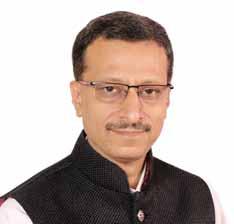
supplied by the clubs,” says Shakir. Further, the clubs, in partnership with IMA, will organise plasma donation drive for treatment of Covid patients. At present, the district is executing 11 GG projects worth $400,000 for Covid relief. Besides, the clubs have distributed sanitisers, masks, PPE kits and other Covid assistance worth `50 lakh across the district.
Once the schools reopen, “we will be installing 200 digital classes in government schools”. To lessen farmers’ woes in this Vidarbha region known for farmers’ distress and suicide, “top priority is being given to watershed management that involves digging canals and facilitate raising of crops twice a year.” On TRF giving, Shakir’s target is $400,000, of which $60,000 has been collected so far.
Vijay Arora Education Administrator, RC Ferozepur
As a retired college administrator, he is passionate about involving youth in Rotary. “I want to open as many Interact and Rotaract clubs as possible during my tenure,” says Vijaya Arora. He has chartered four Interact and six Rotaract clubs, and increased women’s membership from three per cent to eight per cent. Eighty per cent of the 200 new Rotarians inducted since July are below 40.
Despite the Covid lockdown and meetings being held over Zoom, “I am confident of improving the membership from 2,215 to 3,000 by the end of the year and 45 per cent will be below 40.”
Till September, his district has done Covidrelief projects worth `5 crore. Arora plans
to raise $100,000 for TRF and has already received commitment worth $35,000 from the members. He is taking up the Happy Schools project in a big way, having identified 25 government primary and high schools so far. Already 10–15 clubs have started executing water, sanitation and literacy projects in schools, he says.
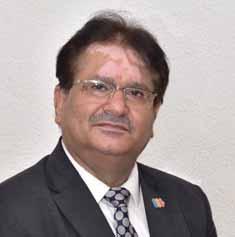
He has initiated a slew of mega projects to be implemented as the district’s signature projects.
“Through Project Annapoorna we have given over 700,000 packed food to poor families. After coming to know that 70 tribal families in Palghar, a remote village, are eating grass, we rushed to them and provided monthly rations and food,” says Sunnil Mehra.
Under Project Poshak, 750 malnourished children in Adivasi villages are being provided protein-based food packets through the year and the Aashiyana Project will provide in the first phase pucca houses, each costing `250,000, to 5,000 out of 27,000 tribal families who have no roof over their head.
A novel initiative called Giver’s Gain enables Rotarians to encash their unused household items such as furniture, electronic durables, plastic and chemicals by delivering them to a company. “The amount thus collected will be given to TRF under the member’s account.” The district
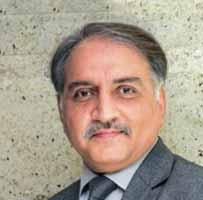
hosted a CSR webinar in which 5,000 companies had a peek into some Rotary projects.
Reaching out to rural areas, the district plans to construct 40 check dams in Palghar to benefit 25,000 families dependent on agriculture.
Six new Rotaract clubs were formed since July and Rotaractors were inducted into the District Avenue teams for project execution. At present, there are 111 Rotaract clubs and 4,800 Rotaractors in the district.
To create a bonding with Rotaractors, “we have started a three-month online course on entrepreneurship for them and 300 youth have enrolled in this programme.”
Hopeful of a 10 per cent growth in membership, Mehra says, “we have added 460 new members so far, increasing our membership to 5,300.” And women’s membership is expected to increase from 28–30 per cent to 40 per cent by the end of the year. Mehra has set a target of $3.5 million for TRF giving this year.
All efforts are being taken to make the district no 1 in membership and TRF giving in the world, says Nagendra Prasad. He wants to add 2,500 new members and 25 new clubs this year. “We have so far added 1,100 new members, 10 new clubs and three satellite clubs.”
Tree plantation is an ongoing project since July and “we hope to surpass the last year’s figure of 28 lakh saplings this year,” he says. KSRTC has donated a bus for converting it into a special ambulance for performing Covid tests across the state. “We are in talks with KSRTC to purchase 10 more buses to operate mobile libraries and clinics in rural areas,” says Prasad.
A high-tech blood bank will be set-up at the BGS Hospital through a global grant worth `1.24 crore. The district in partnership with the Karnataka Small Scale
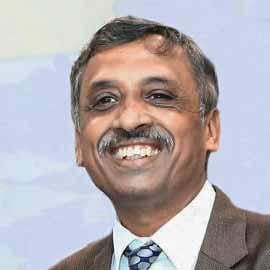
Industries Association will be providing vocational training in diverse fields such as tailoring and machine tools to empower needy families. “We will enter into a similar agreement with Logu Udyog Bharathi to offer online skill development courses to jobless youth. This will be a free course for needy people,” he says.
The district has identified five prospective AKS members so far and “we have set a target of $5 million for TRF giving. Ravishankar Dakoju, who has donated `100 crore to TRF, is inspiring us to do more in Foundation giving.”
Designed by N Krishnamurthy
In a big push to social forestry, 30 Rotary clubs in Salem, RID 2982, Tamil Nadu, have planted over 15,000 saplings to create a Miyawaki forest over an acre in the midst of a residential area under a town panchayat.
“The forest will include a walkers’ track on its boundary. The Miyawaki project costing `2 lakh will enhance the water table in this area, thus providing a secure source of ground water to 200 families,” says R Mangeshwar, president, RC Salem South. The
project is implemented with the support of Salem Forest Department, Kannankurichi town panchayat and G2 Nursery.
Miyawaki is a technique pioneered by the Japanese botanist Akira Miyawaki, that helps build dense, native forests. It involves planting dozens of native species in the same area, and becomes maintenance-free after the first three years.

DG K S Venkatesan inaugurated the project in the presence of R Murugan, divisional forest officer,
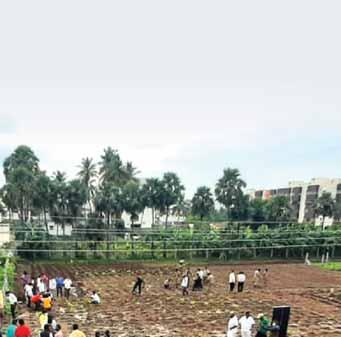
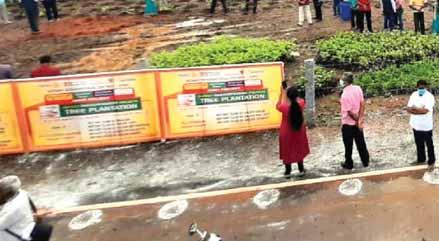
Salem, and S Arumuganainar, executive officer, town panchayat. The inaugural was organised by Rotarians Tholkapia Arasu, popularly known as the green crusader, and |C Balakrishnan along with six assistant governors and district officials. This tree plantation drive at this town panchayat being implemented jointly by the Salem clubs come under the district’s flagship Dasavatharam project. The extensive green drive will enhance the public image of Rotary in this village.
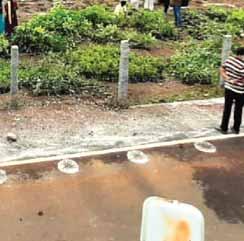

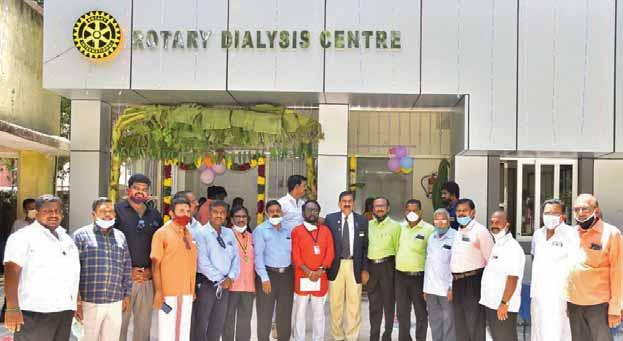
ARotary Dialysis Centre with three dialysis machines was set up in Kumbakonam by RID 2981 at a cost of `24 lakh. This global grant project was made possible with the support of RID 9820 from Australia and TRF.
The district has entered into an MoU with the City Union Bank
(CUB) for the maintenance of the dialysis centre for a year. “During the lockdown, the new facility was useful for local patients to avoid unnecessary travel and related expenditure,” said PDG S Piraiyon who was instrumental in getting the global grant from TRF.
The building was constructed by CUB at a cost of `30 lakh; the
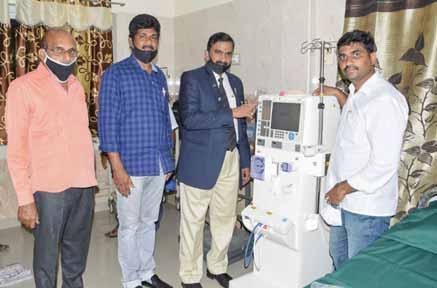
bank also put up additional funds totalling `8.5 lakh for setting up an RO unit, cots and other furniture. “We had applied for the global grant in 2018–19 during my tenure as DG and the dialysis centre was inaugurated the following year after the building was constructed and other facilities were in place,” he said.
He thanked the bank for this partnership, and for agreeing to meet the recurring expenditure of `1.25 lakh every month to pay the salary of doctors and paramedics. He was assisted by IPDG Manimaran, PDG Ramesh Babu, DG Balaji Babu and DRFC Balasundaram in the execution of the GG project. Rtn Balasubramanian, general manager, CUB, Kumbakonam, took keen interest in the completion of this project.
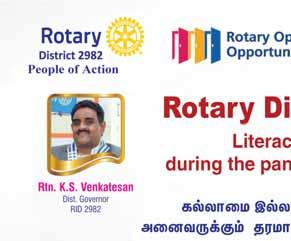
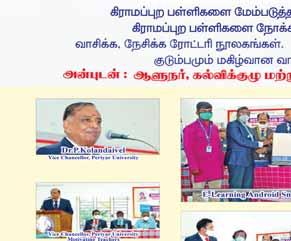
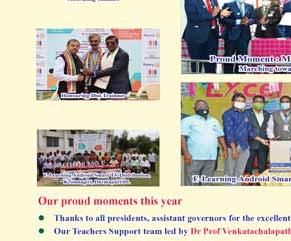
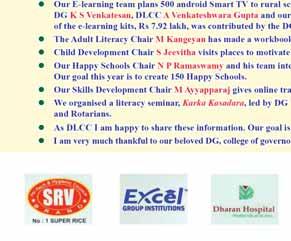
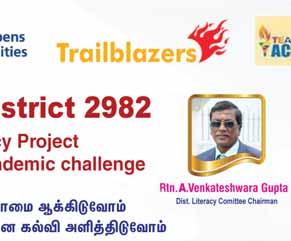
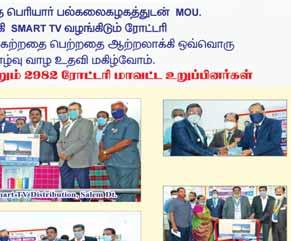
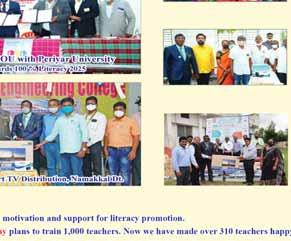
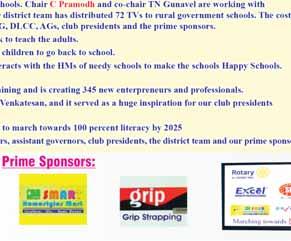


Amultidistrict virtual membership seminar was organised by RCs Calcutta Renaissance and Calcutta Centenary, RID 3291, in association with RCs Delhi Elite (RID 3011), Solapur (3132) and Belur Dharwad (3170). Fourteen new members including four women from the five clubs were introduced at the meet.
PDGs Shyamashree Sen (3291), Chandrashekhar Kolvekar (3142) and Sunil Zacharia (3201) addressed around 100 viewers. PDG (3291) Debasish Mitra, the chief guest, urged the audience to introduce more women members. The most challenging tasks for Rotary clubs at this juncture are membership retention and inducting new members on a virtual platform without meeting them physically, he said.
“Induct people from diverse backgrounds with like-minded cultural orientation; make them feel welcome and involve them,” said Shyamashree, stressing the importance of bonding
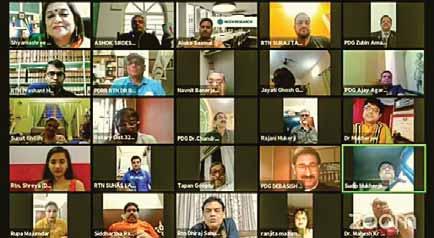
and healthy relationship among members.
Zacharia, speaking on membership retention, urged clubs to “be strong, have a hands-on engagement committee, structured programmes, give proper information to members and create a feeling of family and friendly bonding to retain members.”
Kolvekar stressed the need to attract young members and make
Rotary meetings flexible. “Involve Rotaractors and youth in your projects so that they get inspired to become Rotarians. Appreciating them for their ideas will be a huge motivation for them,” he said.
DGs Sudip Mukherjee (RID 3291), Harish Motwani (3132), DGE Prabir Chatterjee (3291) and DGN Raja Sekhar Reddy (RID 3150) were also present.
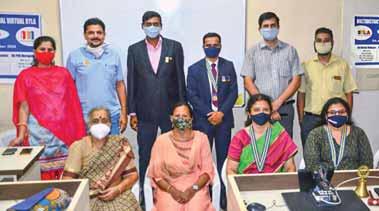
Interactors and young professionals in the age group 16–23 from RIDs 3132,
3211 and 3212. DGs Harish Motwani, Dr Thomas Vavanikunnel and P N B Murugadoss were present to mentor the participants.
PDG K A Kuriachan was the chief guest at the inaugural session and RIDE
A S Venkatesh addressed the youth at the valedictory programme. Around 13,800 students and professionals from Brazil and Nigeria too attended the online programme,” said Bindu
Shirsath, District Interact Chair, RID 3132.
Entertainment programmes showcased the youngsters’ talent and online games were held to simulate the field environment. Best Rylarians were selected and E-certificates were sent to all participants. The virtual RYLA was jointly hosted by RCs Ahmednagar Priyadarshini, Ahmednagar, Ramnad, Kazhakuttom and Kottayam East.
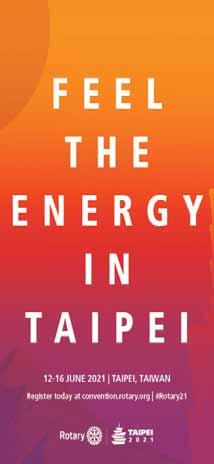

9,170
70,897 1,322 207,967 56,964 9,710 7,725 70,313 13,950 3,501 83,013 29,657 24,754 13,701 14,020 647 62,729 12,053 2,225 250 2,595 15,827 1,099,675

Sandhya Rao
The best stories come from writers who reflect deeply upon the world and all its inhabitants and phenomena.
Ihave a young friend, Apuurva, who is as crazy about books as I am. The other day I messaged her and in the course of our chat exchange, mentioned that I was reading ‘a fantastic book called The Library Book by Susan Orlean.’
Promptly she wrote back: ‘Guess what? I’m reading the very same book now!’
Two friends, bookworms both, reading the same, rather out-of-the-way book at the same time, in two different places, Chennai and Goa! Who could imagine that! Truth is stranger than fiction! Which brings me to a passage in The Library Book — more about it in my next — about the history of a library in the US. Apparently, back in 1873, it was governed by all sorts of rules; one of them discouraged the reading of ‘too many novels, lest they [readers] turn into what the association labelled “fiction fiends”…’! In 2020, I have no hesitation in urging you loud and clear

to become ‘fiction fiends’. You will find that fiction’s a friend.
Stories spun out of a writer’s imagination — and here I refer to the best writing, of which there is plenty, and not the trashy kind of writing, of which too there is plenty — create worlds in which readers can lose themselves. Sometimes, you feel that the character emerging from the novel or story is you and you think: how did this author know this about me? Or, this is exactly what I was thinking. Or, I knew this would happen. Or, really, I didn’t know this would happen. Or, oh, so that’s why he did this or she said that.
Rabindranath Tagore’s Nastanirh, which became famous in its film version as Charulata, explores the loneliness and longing of a woman within a joint family. It’s a theme far ahead of its times, intimately exploring the mind of a woman. Or, take Munshi Premchand’s Godaan, considered by many to be
the finest novel in Hindi ever written. Tackling themes such as caste discrimination, dreams and desire, gender, the indigent rural landscape, class exploitation, Premchand powerfully draws readers into the world he creates. The best works of fiction make you observe the world around you while simultaneously pressing you to look inward.
The key to fiction is ‘compelling storytelling’. Once you are hooked, you are able to see things from other points of view thanks to the various characters or situations presented in the novel. You see how people evolve, how societies develop, since things happen over a period of time within the novel, even if it is just a day, as in the case of Ian McEwan’s Saturday. The events described in the novel take place on just one day in London against the backdrop of a demonstration against the US invasion of Iraq. The central character, a neurosurgeon, is shown struggling to understand the meaning of his life in the context of a post-modern world. Although the action takes place over only one day, you the reader begin to see the larger picture, you begin to see things differently and even if some of the insights are troubling, they enrich your inner self. The best writers of


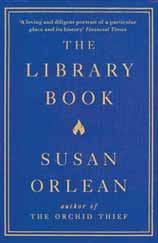
fiction enable you to unravel some mysteries of our undoubtedly complex lives. Compare a history textbook with historical fiction. While the former is generally a litany of names, dates and events, the latter takes you bang into the middle of the action in the period in which the novel is set. Through plot and characters, you taste, smell, feel, see all that’s happening in that time. Eras come alive in a tangible, unforgettable way. It’s the same with general fiction. People and places, events and feelings reach out to you at an emotional level; you cannot but respond. Everything comes together to create a world that’s palpable, even if it is a world of fantasy. Why else would so many love books such as The Hitchhiker’s Guide to the Galaxy by Douglas Adams, a classic science fiction novel of great wit and insight. My niece, when she was in her teens, had this book in one hand at all times except, perhaps, when she was taking a bath. Why else would so many, young, old and middling, swear by Harry Potter? Many young hearts broke when Dan Radcliffe — and not themselves — was chosen to play the role in all seven films! Why, back in Victorian England, would people wait anxiously for
the next instalment of The Pickwick Papers or David Copperfield or A Tale of Two Cities? First published serially, Dickens was devoured by readers who loved the way he wove contemporary events and issues into his plots and grew characters with nuanced personalities. They often saw themselves in what he wrote, the characters he created.
That’s the magic of fiction. You can be anybody: a soldier, a singer, a scientist, a mother, a teacher… Through this experience of vicariously living the life of the character, you reap the benefits of deeper understanding and empathy. The magic of fiction is also the source of its power. Fiction also provides contexts. The context in Amitav Ghosh’s Ibis Trilogy, for instance, is the opium trade between China and India. All that happens to the various individuals peopling the three novels — Sea of Poppies, River of Smoke, Flood of Fire — from merchants to rajas to lascars to slaves, is reason for or the consequence of the impact of the opium trade.
Perhaps the most important function of fiction is the way it allows us to engage with our feelings and, in the process, enrich our inner selves. According to Christine Seifert, reading literary fiction ‘helps people develop
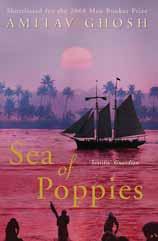
empathy, theory of mind and critical thinking’. In an article published in the Harvard Business Review in March 2020, she says this is because the act of reading fiction strengthens the cognitive muscles that are essential for the development of EQ, emotional quotient. And a highly developed EQ is what, increasingly, organisations are looking for in their employees. She quotes the example of Joseph Badaracco, professor of Business Ethics at Harvard, who makes fiction titles integral to his course curriculum. She says that he believes that ‘good literature presents characters with competing and often equally valid viewpoints.’ This enables future business leaders ‘to use an expanded ability to understand and respond to competing viewpoints.’
You need imagination to come up with and nurture ideas, and an open mind to make effective decisions, be they personal or professional. Reading fiction provides fuel for the imagination and broadens the mind — provided, of course, it is done willingly and regularly and primarily for the sheer joy of it.
Christine Seifert also quotes the experience of a not-for-profit organisation called Books@Work with getting participants in a workshop to read short stories and/or novels which they then discuss. It appears that this helped participants speak freely and in a more forthright manner as well as communicate more effectively. Finally, to quote a cognitive scientist, Maryanne Wolf: ‘the quality of our reading’ is ‘an index to the quality of our thought’. In other words, better readers could be better thinkers and therefore become better leaders… That’s a thought worth considering. The option’s clear when next you have some time to spare: pick up a fiction title from your bookshelf or the library or the bookstore. Or borrow.
The columnist is a children’s writer and senior journalist.
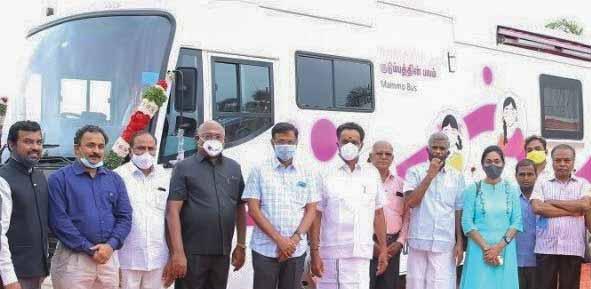
RC Karur, RID 3000, has flagged off a mobile cancer detection facility for women through a global grant project worth ` 1.38 crore. Shobhikaa Impex and Kauvery Speciality Hospital, Trichy, have contributed $30,400 and $40,000 from their CSR funds respectively.
With DDF contributions from RIDs 3000, 4490, 4310, 4590 and 2770 and RC Urawa East, Japan, contributing as the international partner, the project was made possible. TRF sanctioned $73,636. The vehicle is equipped with a mammogram, CR Reader, an ultrasound scanner and Pap Smear test equipment, which can detect
cervical, uterus and breast cancer, said K Ravindrakumar, primary contact for the project.
The vehicle is also fitted with two generators, and has a battery back-up, toilet, overhead tank, TV screens, etc. It was inaugurated by Tamil Nadu Transport Minister M R Vijayabhaskar in the presence of PRID C Basker.
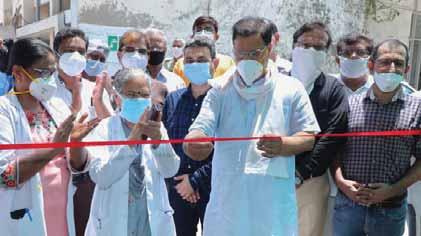
AnOPD shed was installed at the Maharaja Agarsen Civil Hospital by RC Hisar, RID 3090, for people waiting their turn to get a corona virus test done. The waiting shed spread over 1,600 sqft was inaugurated by Hisar legislator Kamal Gupta in the presence of club president Mohit Gupta, secretary Anand Bansal, treasurer Ashish Goyal and project chairman Dr N K Khetarpaul. The project costing `2 lakh was taken up with encouragement from DG Vijay Arora. The club provided PPE kits, thermometers, ventilators, etc to the Covid warriors at the hospital.
You can pay the subscription online
Our Bank details:
Bank : HDFC Bank SB Account
Branch : Montieth Road Egmore, Chennai
A/c Name : Rotary News Trust
A/c No. : 50100213133460
IFSC Code : HDFC0003820
E-mail us following details:
Name of club
President/secretary’s name Amount/date of transfer/UTR number
For physical payment by cheque or cash in bank, write Club Name only without prefixing “Rotary Club of”. Eg. Rotary Club of Delhi Central should be written: Delhi Central.
Rotarians : : 1,186,144
Clubs : 36,235
Districts : 525
Rotaractors : 203,537
Clubs : 10,750
Interactors : 345,023
Clubs : 15,001
RCC : 11,244
As on August 17, 2020
*Please note Interact clubs that have not reported Interact Adviser in the past two Rotary years, are placed in “Suspended” status effective Oct 1, 2019.
Bharat and Shalan Savur

These are the times to be mentally stable and physically fit. The reason? The world is not what it was some 20–40 years ago. Those days, most of the population stood outside the din and dirt of politics, wars were fought on distant frontiers, if suicides were committed we barely heard of them and, yes, epidemics didn’t spread to our neighbourhoods. We were content in our areas of sunshine and… well… everything was in its designated place. Not anymore. Today, everything is on our TV screen and it doesn’t matter whether it’s a 32 or 102 size monitor, all the monsters are here in our living rooms. Our imagination is not left to its devices, there is nothing to imagine. Opinions are loud, images flash by at supersonic speed, the music blares… it’s not just in our face, it’s in our minds. And that mental shrillness gets into our bodies like a diet turned into a nightmare. Welcome to the crazy, cacophonic world of reality shows streaming live right into us! Whew!
“It is quite true what philosophy says: that life must be understood backward,” writes Soren Kierkegaard and adds sagely, “But then one forgets the other principle: that it must be lived forward.” This is exactly what this piece is about — to live forward. For that, we really need to neutralise the volatile waves of reactions in our hearts and minds and swim in the clean, clear waters of peace and health.
The 8-walk. When we understand that much of the madness from our mobiles
and TVs gets into us because we are, literally, sitting ducks — lounging on the couch or sprawling in our seats with earphones attached to us like extensions of our ears — we’ll know what to do. After a quacking skirmish, ducks swim away from each other and flap their wings vigorously to release tension. We’ve got our own version — pacing up and down the length of the room to relieve our stress. The needs of today, however, call for a modified version of pacing, it’s called the 8-walk because it keeps the highly-stimulated


mind occupied in navigating the winding shape of the figure 8. It can be done on the beach, in the park, at home or the workplace. If indoors, place two chairs in a row at a distance of two feet. Now, walk around one chair, diagonally to the other and around the second chair, diagonally back to the first one — describing an 8. Start by doing it for five minutes, then progress to 10…20…30 minutes daily. Breathe normally as you walk. It’s a great stress buster — the mind relaxes as its beta-waves slow down to the soothing


alpha-waves frequency. Do it for 14 days and check how you feel.
Reset the mind. Being assaulted loudly and relentlessly with bad news often lowers our contentment level. A querulous tone enters our mind and voice. Check: *Am I complaining often? *Am I dissatisfied about something I can’t put my finger on? *Does the future look bleak based on the present? Helpless, gloomy feelings can suppress the immune system and give way to allergies, depression and other disorders. A great way to stay out of these woods and create a psychological safety zone for yourself is to consciously reset the mind in contentment. Patanjali, the father of yoga, had said, “Contentment leads to superlative happiness.” In these loud times that stir up dissatisfaction to, sometimes, dangerous
levels, it’s imperative we keep our mental balance by deeply touching the dormant feeling of how much we have. It is much easier to get to the how much base when we cast out pride, envy, bottomless desires and all the stress that goes with them. Once the clutter is out, we touch the treasure of how much and allow its peaceful radiance to fill us. This is contentment. And I echo the wise when I say, “use this feeling as your guiding light.”

One of the secrets tucked in contentment is: Love life as she is, don’t expect more than she can give, lend her your laugh when she makes you happy, when her road gets rocky to run on, pave it with your patience and unflagging care and miss her already because, one day, she is not going to be there.
It’s as good as it can be, it says without words. And we use the energy conserved in getting on with life.
* When we are contented, we will still feel sad but we don’t become helpless, we don’t feel hopeless. We take positive action. If we are the outdoor type, we walk away our blues, if we prefer the indoors, it’s possible to just sit silently until the wave of sadness ebbs and calmness prevails.
* There’s no complaining. It just doesn’t happen. When others do, we look at them in wonder, we help them when we can. Or we guide them to the right people. And, yes, that querulousness does not get a foothold in us.
The gentle guide. Contentment silences the loudness around and enables us to look around undistracted and derive joy from the abundance, the beauty, the proof and fruit of the great intelligence that made this fullness. Contentment is an inner strength that helps us reserve and use our time, our energy for things that truly matter. It gently guides us in many ways:

* We stop bothering about what others think about us — it’s like walking out of a dark cave and discovering the vast sky above and the huge space around.
* It keeps us from over-thinking, over-analysing, thus, there is no fear, no mental paralysis. We know that everything is better than it appears and will only get better.
* It prevents us from beating ourselves needlessly over something we’d done and we become better people because we stop judging others. We dwell in greater understanding and that’s like taking an unexplored scenic route inside ourself.
* It helps us catch ourselves when we keep wishing things were otherwise.


* We never rehash old stuff unless there’s a very good reason for doing so. We clear any fog in the mind by exercising, spending time in nature, listening to music or a bracing Ted talk.
* One of the most beautiful things it enables us to do is to always encourage people in what they want to do. Contentment dissolves the feelings of competition and one-upmanship. In its place is a wonderful sense of oneness. As Bob Marley sang, “Live for yourself and you will live in vain; live for others and you will live again.”
Ah yes, and please do switch to a gentler, kinder, softer programme on TV, something that cheers, educates, inspires, elevates. I recommend Dr Wayne Dyer’s movie, The Shift. It’s one more great way not to let the loudness get into you.
The writers are authors of Fitness for Life and Simply Spiritual – You Are Naturally Divine and teachers of the Fitness for Life programme.
Designed by N Krishnamurthy

Kiran Zehra
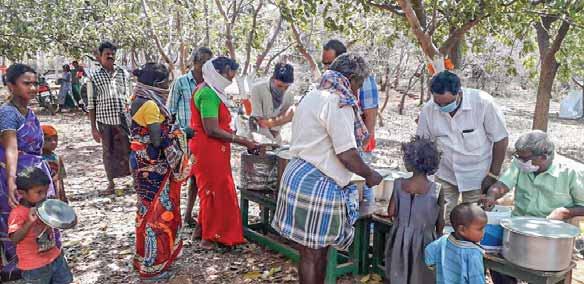
The residents of Rama Subbaiah Colony in Kavali, near Nellore, wait patiently for their turn to be served fresh, hot lunch. That day’s menu is “egg biryani, raitha and kesari ,” says K Gopikrishna Kaanu, past president of RC Kavali, RID 3160. The club under its ‘One meal a day’ initiative is providing food since March to around 350 families from three slum colonies here. “Some of them wait with their children from 10 in the morning. For most of them this is the only meal for the day,” he adds.
Most of the recipients are daily wage earners and the women work as domestic help. Ever since the lockdown began, they could not
go to work and have been denied wages by their employees, leaving them with no money and very little food supplies. Understanding their plight the club has been supporting these colonies with basic needs.
As the club wanted to extend its service to the homeless, “we loaded our cars with food packets and drove across the city distributing them to beggars and street dwellers.” Kaanu recalls meeting an old homeless woman who had “tears in her eyes when she received the food packet. She hesitantly asked if she should come back the next day at the same place and time to get a food packet.” The club members shifted 10 migrant families staying in makeshift tents
by the highway to a government school and gave them ration kits to last a month. Similarly the club “distributed vegetable supplies and dry ration to about 7,000 underprivileged families in the town,” he says.
From April, the club has been conducting a sanitation drive and has distributed ayurvedic medicines, masks and sanitisers to about 10,000 people. “Until July, we have spent nearly ` 24 lakh for Covid-relief activities, with the members making personal donations or getting money from their friends, relatives or associates.”
Twenty-five ayurvedic camps have been conducted in the rural areas near Kavali.
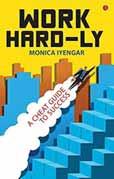
Author : Monica Iyengar
Publisher : Rupa
Publications
Pages : 118; `170
into 13 chapters, the book discusses time management, team management, balancing professional and personal life, leadership qualities, women in the workplace, and more for the younger generation with a short attention span. In the corporate world, curb your enthusiasm and learn from the lazy, smooth-talking colleague how to tilt the system in your favour with tips from this book. Anecdotes of a crazy boss, nosey co-workers, and a clueless HR will leave you chuckling. For those who often wonder why the incompetent ones are doing better, this book will help in making you efficient and reduce work pressure.

Author : Bidisha Ghosal
Publisher : Notion Press
Pages : 548; `555
a courtroom drama this book narrates the story of Avni Rambha, a rape victim. Rapist Rahul Satyabhagi, son of a rich and powerful politician, is acquitted, despite having strong evidence against him. Rahul goes on to become the leader of a men’s rights activist group. Eight years later, a video of Rahul obscenely describing the rape turns up on the internet. But no arrest happens. Even more powerful now, he decides to silence everyone involved in exposing him. Little does he know that he is going to meet Avni’s friends Hitaishi and Amrutha, who have decided to punish him. Meanwhile, rapists in the city are being kidnapped, tortured and dumped on the streets. A team under DC Dixit investigate the gruesome torture of Rahul Satyabhagi. Are the three friends behind it?

Author : Avni Doshi
Publisher : Hamish Hamilton
Pages : 240; `1,407
for the Booker Prize 2020 this is a love story about love and betrayal between a mother and a daughter. Tara, a wild woman in her youth, abandons her loveless marriage to live in an ashram with her child Antara, and falls in love with a guru. Antara retells her tale about living at the ashram, and her suffering under her mother’s self-centered version of selfactualisation. Now Tara is old and forgetful and Antara is tasked with taking care of her mother she never loved. This book talks about the change of roles from being a daughter to becoming a caregiver for an elderly mother and portrays the complicated feelings a caregiver can experience. The anger and helplessness that stems from the feeling of being inadequate in the role of a daughter to being taken for granted while the sick person is showered with understanding and pity, this book is packed with unsettling emotions.
Compiled by Kiran Zehra
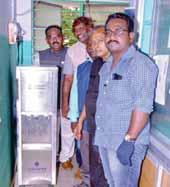
AnRO water purifier costing `60,000 was set up at the Government Maternity Hospital-cum-PHC at Aanaikuppam village.
The Rotarians distributed stationery items to children at the Banphool school in Yamuna Pushta, a slum colony.
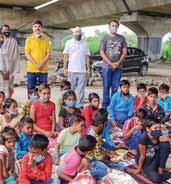
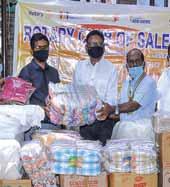
The club donated Covid-relief material worth `75,000 to the Covid care centre at the Salem Government Hospital. PDG Velayudha Raveendran handed over the material.
The club donated 400 home quarantine kits containing vitamin and anti-allergy tablets to Municipal Corporation commissioner Srijana to distribute to Covid patients.
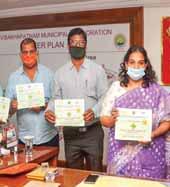
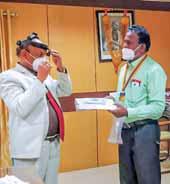
Club president K Arumugam donated a fibre optic cable device with head light for ENT operations to Dr A L Meenakshi Sundaram, Dean, Government Medical College, Pudukkottai.
The club distributed PPE kits, oximeters, thermometers, sanitisers, masks and gloves worth `12 lakh to the district hospital, Ayush department and other institutions such as police and voluntary agencies through a global grant with RC Singapore.
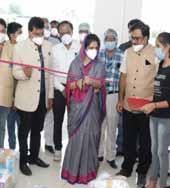

Through a global grant, the club renovated a dam to meet the drinking water, agriculture and livestock needs across 15 villages. The project will benefit at least 15,000 people.
More than 650 students from five schools were given notebooks and registers to help them attend online classes.
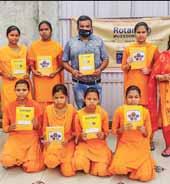
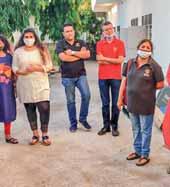
The Rotarians distributed masks and gloves to 50 women at the Maheshwari Mataji Old Age Home at Ratanpur.
The club distributed face masks with Rotary logo to rickshaw pullers, hawkers and shopkeepers, and PPE kits to doctors and staff at a Covid care centre.
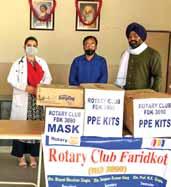
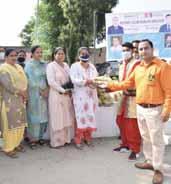
The Rotarians distributed saplings and stationery items to students at a government senior secondary school, Bodal, and ration kits to needy families.
Adigital classroom was inaugurated at the ZP Primary School in Malegaon taluk. The project worth `40,000 will benefit 100 students of classes 1 to 7.
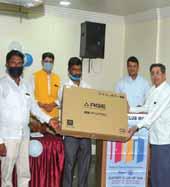
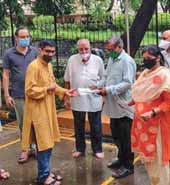
The club members felicitated the unsung Corona warriors in their neighbourhoods with certificates of appreciation and gift bags.
The Rotarians cultivated a half-acre barren field and are planning to donate the paddy to orphanages and old age homes. The grass will be given to a cowshed. The project will benefit 100 needy people.
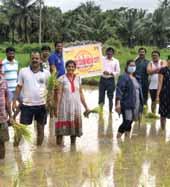
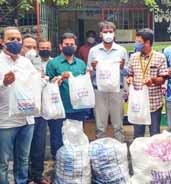
Medicines and nutritious food were supplied to 70 home quarantined Covid patients in the presence of local legislator and health workers.
DG Nagendra Prasad and Disease Prevention chair S Jayaraman handed over a Covid testing equipment worth `40 lakh to Dr B N Gangadhar, director, NIMHANS for installing at the neurology lab.
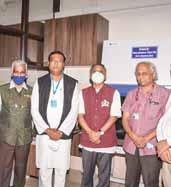
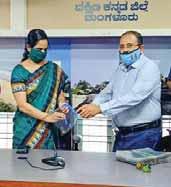
DG M Ranganath
Bhat handed over 3,000 face shields and 60,000 gloves worth `4 lakh to District Commissioner Sindhu Roopesh at Dakshina Kannada, to be given to anganwadi and Asha volunteers.
The club inaugurated a permanent sapling stall at the One Care Hospital under its Eco Meridian project. Visitors to the hospital can take the saplings for their use.
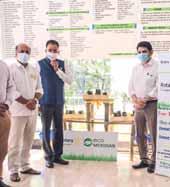
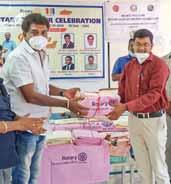
The club donated 150 bedspread and pillow covers to a primary health centre at Valavanthi in Yercaud. The PHC caters to the medical needs of the tribal locals.
Anonline awareness talk on Project Positive Health was conducted by the club. The Rotarians distributed fruits to patients at the District Covid Hospital in Sibsagar.
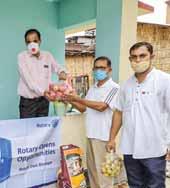
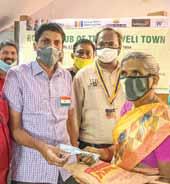
The club distributed 45 set of sarees and sweets sponsored by club member STR Gandhi to an orphanage for the visually-challenged.
Union minister Pratap Chandra Sadangi inaugurated a clean drinking water station at the Nilgiri Subdivision Hospital in the presence of DG Saumya Ranjan Mishra and other Rotarians through a virtual meet.
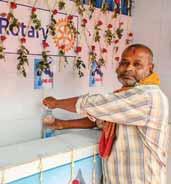
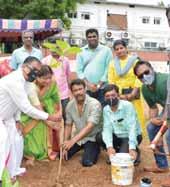
Around500 saplings were planted on a government land in Sriperumbudur in the first phase of the club’s Kaadu Seivom project which aims at creating an urban forest ecosystem. The project is done in partnership with FASS Trust and town panchayat.
Theclub members donated monthly provisions to Maheshpur Sebashram, an orphanage at the Sundarbans.
Compiled by V Muthukumaran Designed by L Gunasekaran
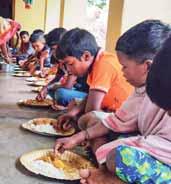
Union Health Minister
Dr Harsh Vardhan
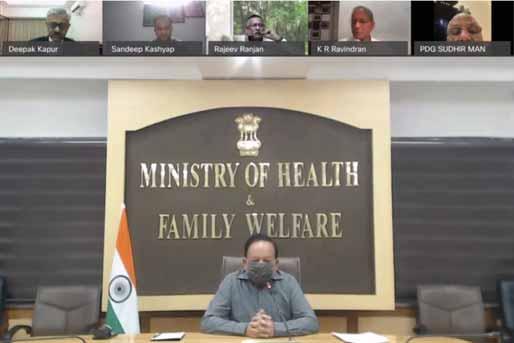
The virtual National PolioPlus and MR (Measles and Rubella) Orientation and Planning Meet organised by the INPPC in August had the participation of Union Health Minister Dr Harsh Vardhan, IPPC chair Mike McGovern, Dr Sunil Bahl, WHO SEARO, and Dr Rija Andriamihantanirina, immunisation specialist, UNICEF; TRF trustee chair K R Ravindran, RIDs Bharat Pandya and Kamal Sanghvi, RIPE Shekhar Mehta, Trustee Gulam Vahanvaty, INPPC chair Deepak Kapur and INPPC advisor PRIP Rajendra Saboo.
The district Rotary leaders were urged to lead the polio eradication
effort, strengthen efforts to increase routine immunisation and prepare for restoration of supplementary immunisation by midterm in the wake of the global pandemic and lockdown.
Rotary clubs are encouraged to use Rotary’s World Polio Day resources ( https://www. endpolio.org/worldpolio-day) to plan and hold online/virtual events on that day (Oct 24). The toolkit can be downloaded from https://www.endpolio. org/sites/default/files/ wpd_2020_en.zip.
Rotaract Award
The Rotaract Giving Certificate is a new
initiative encouraging Rotaractors to actively support TRF with individual gifts. If five members of a club contribute a minimum total of $50, then the club will be awarded the certificate.
Every Rotarian, Every
Every Rotarian, Every Year (EREY) encourages every Rotarian to support the Foundation’s Annual Fund every year to enable it to support life-changing, sustainable projects world over. You can find various updated EREY resources on the Annual Fund and SHARE page of My Rotary, including: An Every Rotarian, Every Year presentation; and The
Every Rotarian, Every Year brochure
Official Directory 2020–21
The board of directors voted last year to discontinue printing the official directory to protect personal data entrusted by members, donors and programme participants. The directory is available to members at My Rotary and is no longer printed, or available in downloadable electronic format. Through the online official directory, members can easily and securely search for fellow members, find club and district information, view committees, read senior leader biographies, and more.
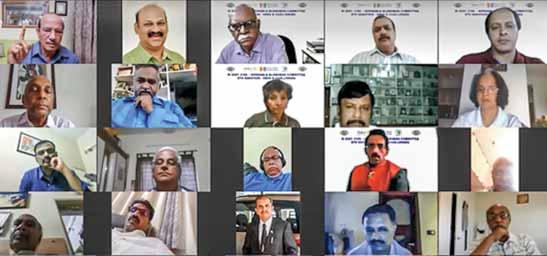
The National Eye Donation Fortnight is observed in India between Aug 25 and Sept 8 every year since 1985, to raise awareness on eye donation. Recently, the Avoidable Blindness (AB) committee of RID 3190 organised a webinar to promote the cause.
Dr G N Rao, founder chairman, L V Prasad Eye Institute, Hyderabad, in his keynote address recalled the initial years of professional practice as a cornea surgeon in the US, when corneal transplant was done on an emergency basis due to its limited availability and lack of storage facilities. When he moved to India to establish the eye hospital in 1987 and an eye bank in 1989, he was discouraged by many as there was no concept of eye donation. During the first year of the eye bank, he could collect only 10 corneas. Today, the institute is one of Asia’s biggest eye banking facilities, he said. Dr Rao urged eye hospitals and NGOs such as Rotary and Lions to recommend to the government to formulate policy regulations for eye donation and implement a Hospital-based Cornea
Retrieval Programme (HCRP) across major Indian hospitals with financial support. He stated that in the last year his hospital had collected 10,500 corneas, and 70 per cent of the donations came through HCRP.
A panel discussion anchored by the committee chairman Dr M V Ravikumar included Dr J Ganesh from Sivakasi; Gurudev and Dr Hareesh from Dodballapura; B L Sharma, president, Eye Bank Society of Rajasthan (EBSR); and S Jayaraman, founder trustee of Nayana Jyothi Trust, Bengaluru.
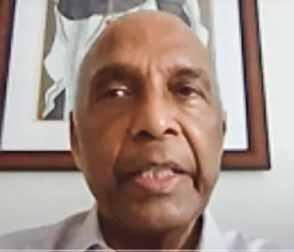
Dr Hareesh and his father-in-law Gurudev explained how, through several motivational programmes, they could collect 1,460 corneas in and around Dodballapura which has a population of 100,000.
Sharma said that EBSR has eye banks across Rajasthan and pays its members for the cornea collected, which are given free to the poor. He explained the role of the police in enhancing eye donation. Dr Ganesh has collected over 14,000 corneas benefitting over 40,000 people in the past 11 years.
Jayaraman explained his concept of ‘vision ambassadors’ who campaign for eye donations. He had introduced the eye donation helpline ‘104’ common for Tamil Nadu and Karnataka to create database of donors and promote the cause.
Pradeep Sudarshan, a visuallychallenged member of the AB committee, shared his experience in promoting eye donation among his family and friends. Dr Arun Adkoli, the committee’s technical adviser, thanked the resource persons and participants.
TCA Srinivasa Raghavan
The other day I read a remark on Twitter that said this corona virus has one benefit: it has helped us identify the fools amongst us. This reminded me of a theory I had proposed six years ago. It happened after I read that a minister had made a particularly foolish remark. After hearing what she had said I started wondering about fools: how many does a country have? Is there a lower limit? Is there an upper limit? Is the number a constant?
After all, I thought to myself, the physical sciences and mathematics have concepts called constants, like pi in maths and the Planck constant in physics, for instance. Their value always remains the same, regardless of what else changes. So for a long time I had been wondering if there are constants in the social sciences also. Economics, which self-importantly regards itself as a science, has none — or just one. But it’s not a natural constant. It was invented by the IMF in 1986, that come what may, the fiscal deficit of a country must not exceed three per cent. Just like that, no reasons or rationale given. But there is not even a man-made constant in the other social sciences such as sociology, anthropology, political science, etc.
So I have been posing a question to better brains than mine: given a population sample — in, say, a bus, a classroom, a village, a newspaper,
a town, a metro, district, an army, a state and finally a country — is the number of fools in it constant in relation to the total number in that group? There was no answer. So I proposed my own theory.
I started by defining a fool. My definition — you can have your own — of a fool is a person who lacks good judgement. Good judgement comprises the ability to maximise your self-interest for at least 90 per cent of the time, which means you don’t harm yourself. The legal, economic and social constraints remain the same for everyone so it’s only a fool who doesn’t maximise. Generally, fools always extract a price from others. Examples are the idiot who jumps the red light, the duffer who smokes at a petrol station, the halfwit who wanders off at aircraft boarding time and now the borderline criminal who doesn’t wear a mask in a crowded

place or observe social distancing. These are some examples. You can add your own.
Assuming that the number is no more than five per cent in any group of people — it is probably closer to 10 — there are 70 million Indian fools. If it’s 10 percent, it means 140 million fools, which is twice the population of Britain! This wouldn’t matter so much if some of them didn’t, in the natural course, find their way into positions of power.
Now think: even if no more than one per cent of India’s 70 million fools work for the State — parliament, executive and judiciary — it means as many as 700,000 persons lacking in good judgement (fools) are acting on behalf of the rest of the 1,400 million. Thus, as the poet rightly observed, “Barbad gulistañ karne ko bas ek hi ullu kaafi tha / Har shaakh pe ullu baitha hai. Anjame gulistan kya hoga (To destroy a garden only one owl/ idiot is enough. But here every branch has an idiot).”
Be it your housing complex, office or the team for which you play, or the road on which you are driving, there will always be some unreasonable people.
But forget the country and its rulers. If you just look around you, you will find that my theory is a good one. Be it your housing complex or your office or the team for which you play some game, or the road on which you are driving, there will always be a constant number of people who act unreasonably and damage your interests. It’s a huge problem.
Can we do anything about it? Sadly not. It’s a constant, you see.

Strong winds left a dusting of cocoa powder over an area surrounding the Lindt & Sprüngli chocolate factory in Olten, Switzerland.
Pictures shared on social media showed a thin coat of cocoa dust on the surface of cars and window panes. “Chocolate snowflakes falling from the sky, dreams do come true,” said one tweet. A ventilation defect in the factory, which caused the phenomenon, was quickly fixed.
The Indian postal department’s new service of delivering money home through postmen is a huge hit across the country. The facility, introduced in late-March just before the Covid-19-forced lockdown was imposed, allows withdrawals from `100 to `10,000 from an Aadhaar-linked bank account. The postmen carry with them `60,000 cash for the service and a biometric device to match fingerprint.
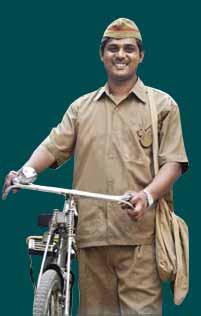

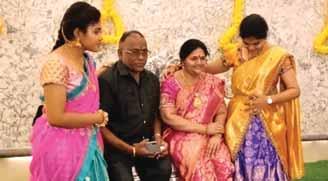
Guests who attended industrialist Srinivas Murthy’s housewarming ceremony in Koppal, Karnataka, were stunned to see his wife Madhavi sitting on a sofa with a welcome smile at the entrance. She had died in a car accident three years ago. Murthy had made a life-size silicon statue of her because it was Madhavi’s dream home and the family couldn’t think of moving in without her. She will now remain part of our family, says Murthy.
A Punjab-based restaurateur designed a 40-kg Ganesha idol made entirely of chocolate with the help of 10 chefs. This is the fifth consecutive year he is making this eco-friendly Ganesha to celebrate Ganesh Chaturthi. Nidhi Sharma of Indore had also designed themed Ganesha idols in chocolate, including one Ganesha slaying coronavirus with his trident. She says she would immerse the idols in milk on visarjan and distribute chocolate milk to the needy.

A police officer in Northamptonshire, UK, got stuck in a pair of handcuffs when he tried to demonstrate how to use it to new recruits. He walked to the neighbouring firestation where firefighters used pedal cutters to free him. Though not thrilled with the mishap, he said he was happy that it made people smile. “If I put a smile on a single face during these difficult times, my job is done,” he tweeted.
Total number of pages in this monthly issue, including cover, 84. Price: `35
We at Rotary News Trust are trying our best at these challenging times to bring out Rotary News in time. There is a huge disruption in postal services due to India locking down first in March, and several States continuing to lock down every now and then. Train movement has also been badly impacted. The result is a huge delay in many Rotarians across the country getting the magazine. That is why from the April 2020 issue onwards, we are sending complimentary e-version of the magazine to ALL Rotarians. But your print copies are also being sent.
As many of your club members are influential members of your communities, we request you to take the time and effort to lodge a strong complaint with your post office if you don’t receive the magazine. At the same time, do write to us at rotarynews@rosaonline.org and tell us if you have not received the magazine. Please avoid sweeping statements such as “nobody has received the magazine”. When we do a cross-check, we often find only some members have missed getting their magazine.
Subscription in charge
You can reach our
Subscription chief Senthil Kumar on senthil@rotarynewsonline.org
You can also call 044-42145666, ask for the subscription person in charge of your district, and lodge a complaint.
Kalpana kalpana@rotarynewsonline.org
Sasikala sasi@rotarynewsonline.org
Valli valli@rotarynewsonline.org
Anuvarshini anu@rotarynewsonline.org
But above all, make sure of the following:
1. You have paid your Rotary News dues to your club.
2. The club has sent the dues to Rotary News Trust.
Districts numbers
2982, 3020, 3054, 3090, 3100, 3170, 3181, 3182, 3190, 3250, 3262
2981, 3012, 3110, 3120, 3141, 3142, 3201, 3211, 3212, 3261, 3291
3000, 3030, 3060, 3070, 3080, 3131, 3132, 3232, 3240
3011, 3040, 3053, 3150, 3160, 3202, 3231

3. Your name and full postal address, with the correct pincode, and preferably email and phone number, are given to us.